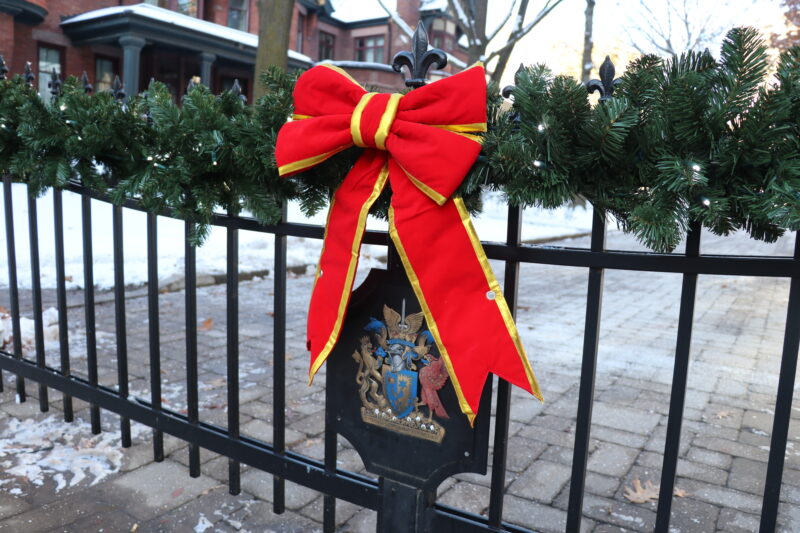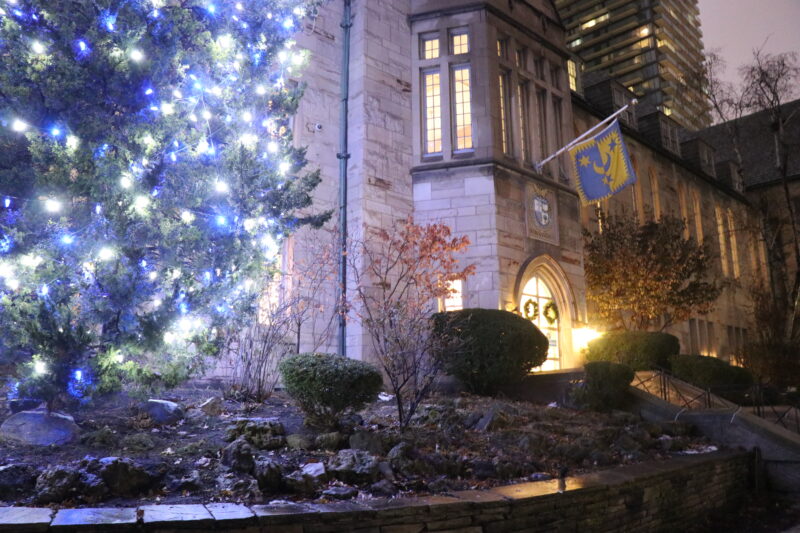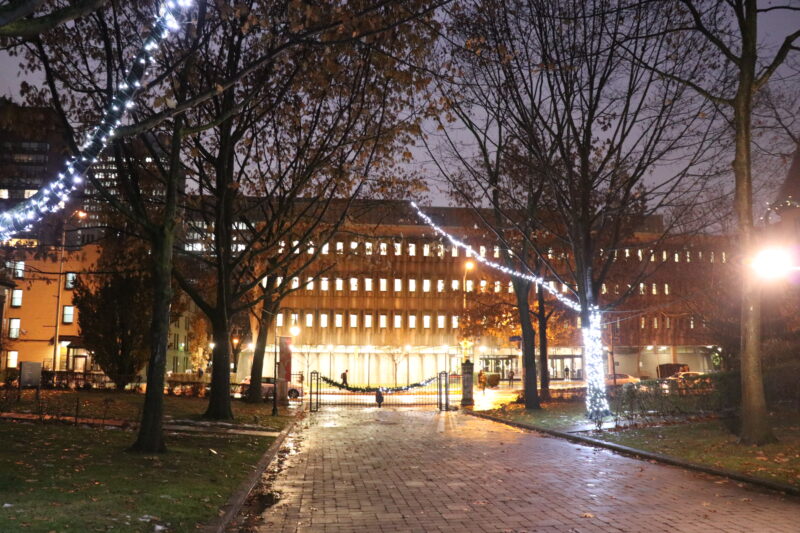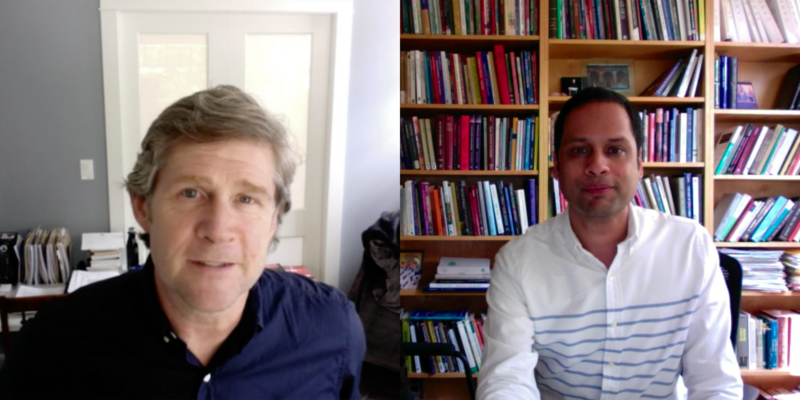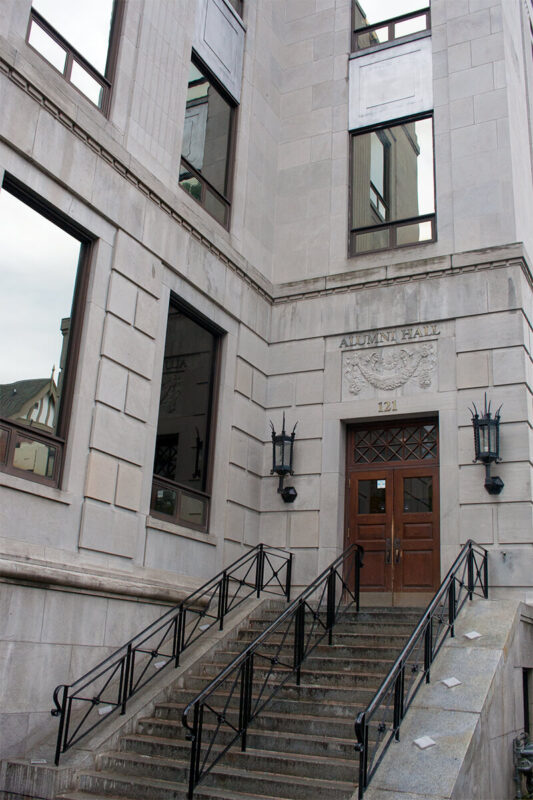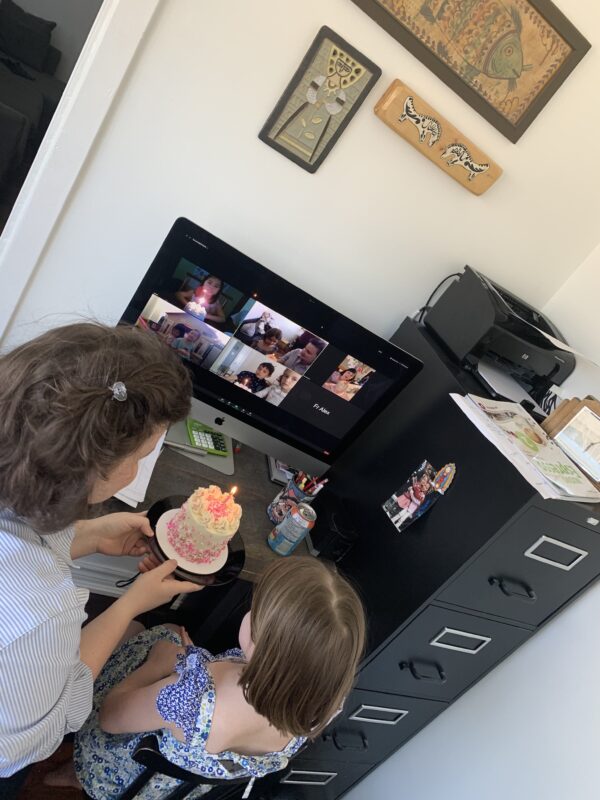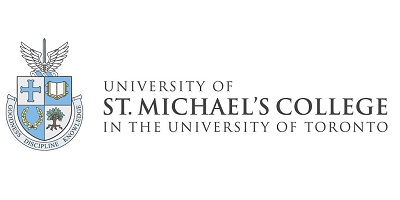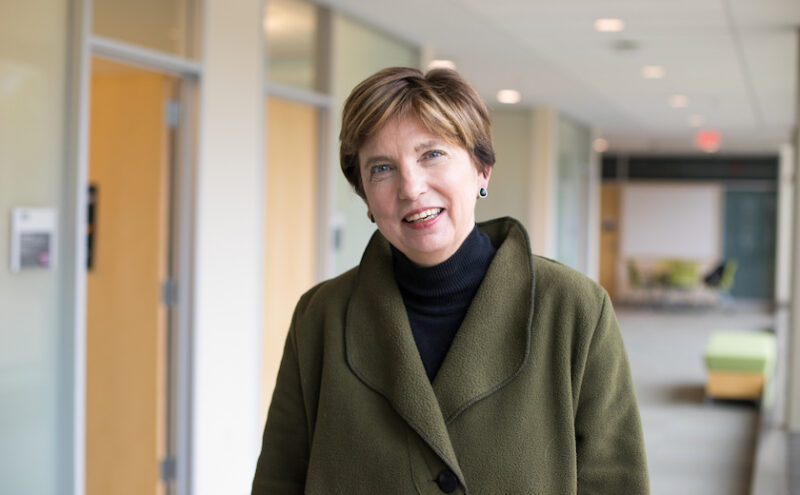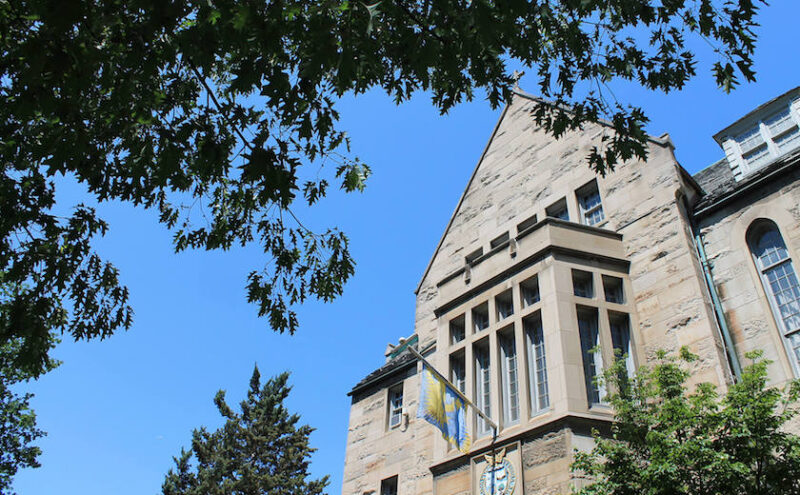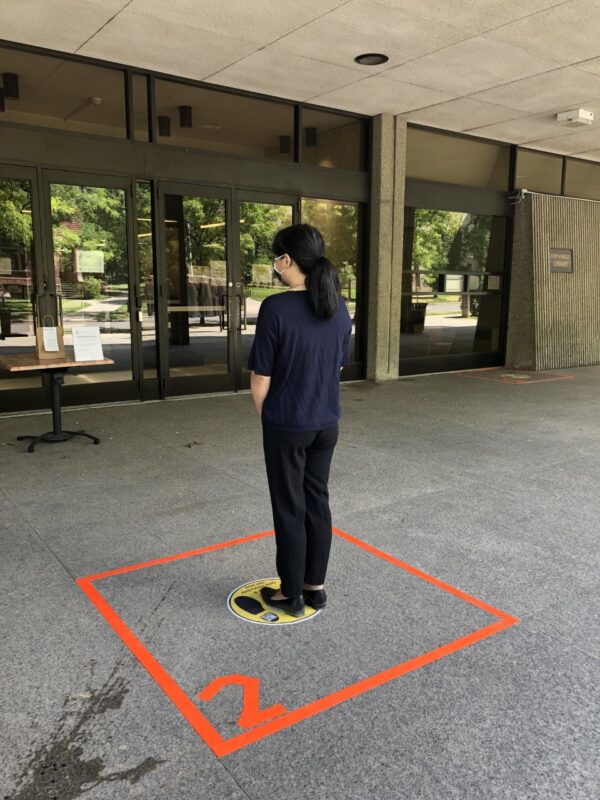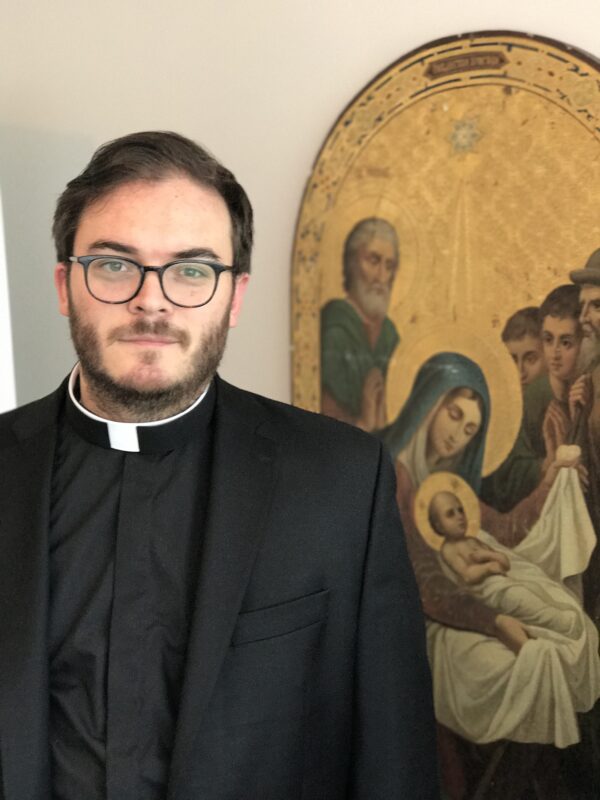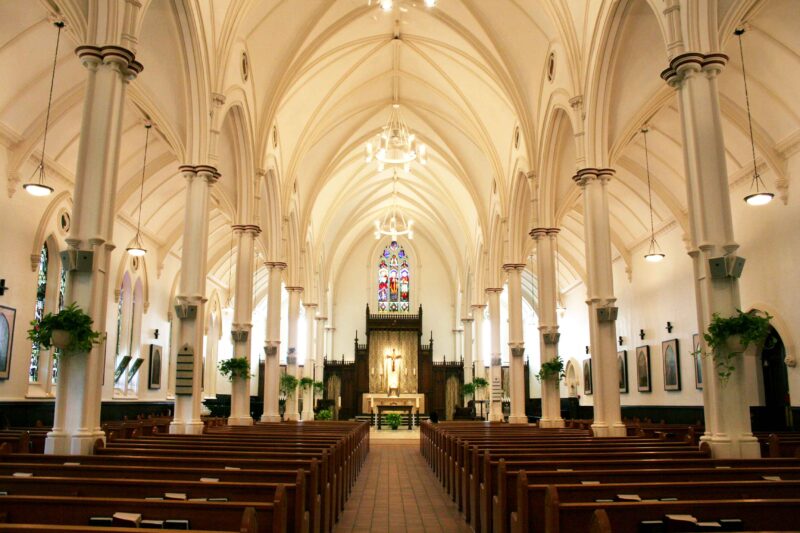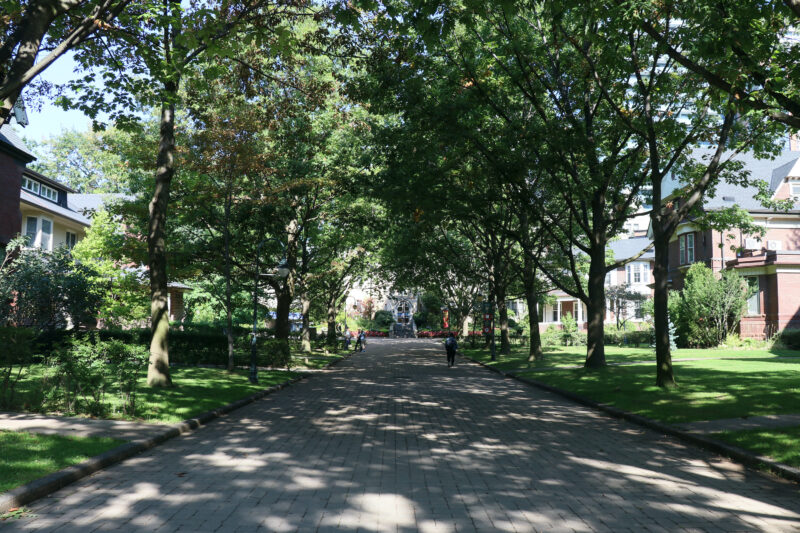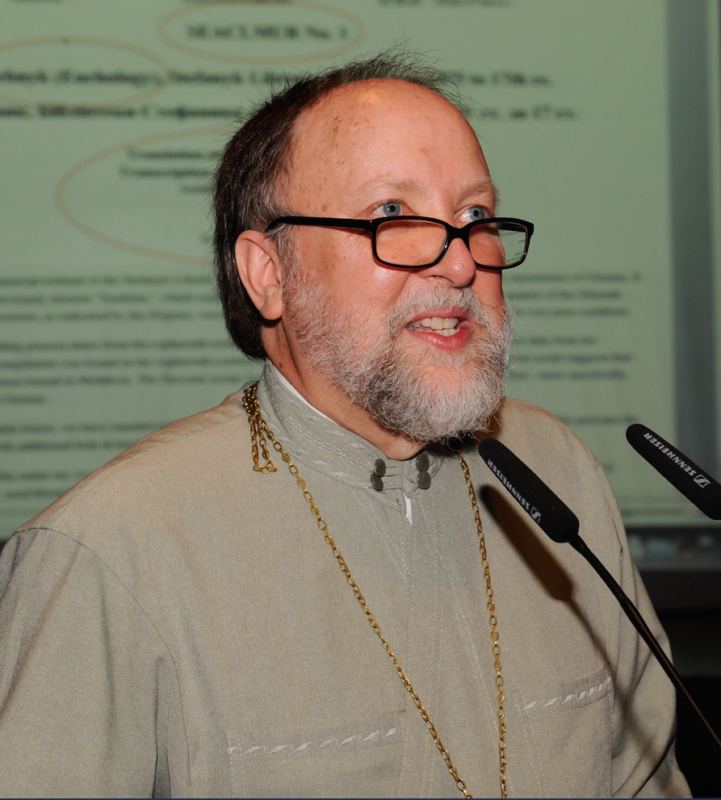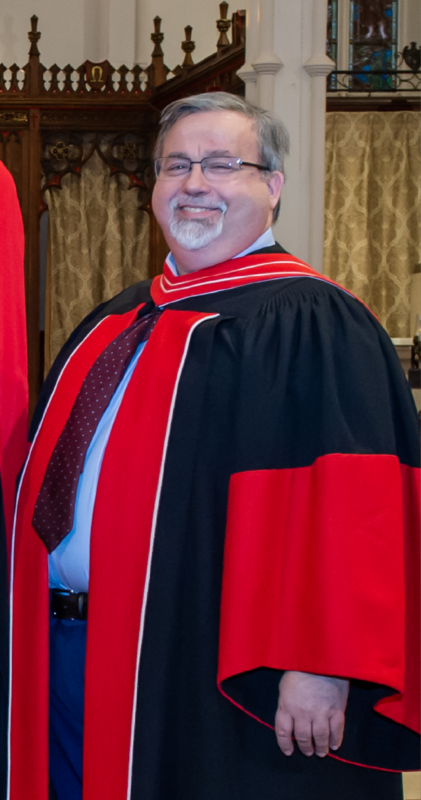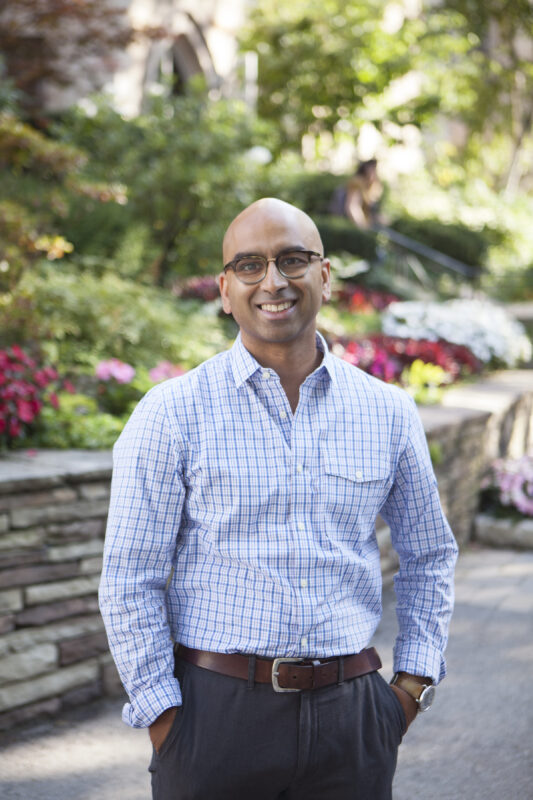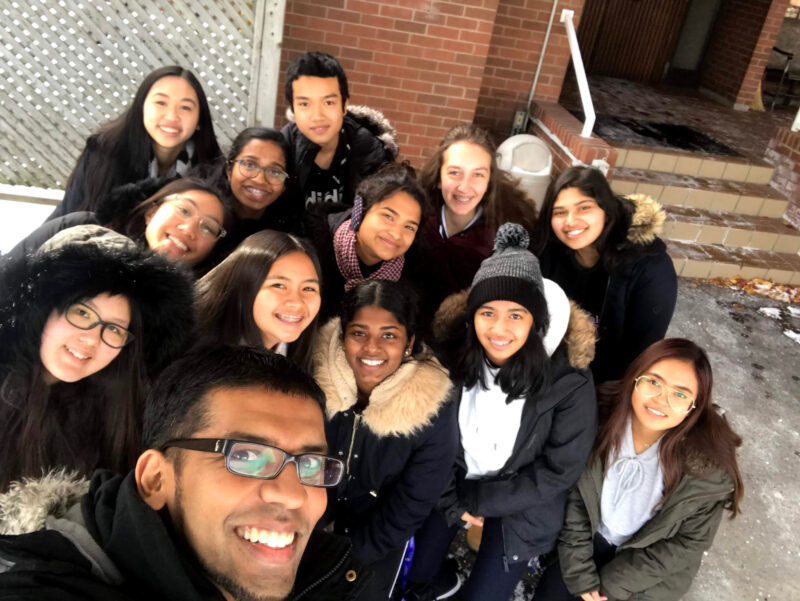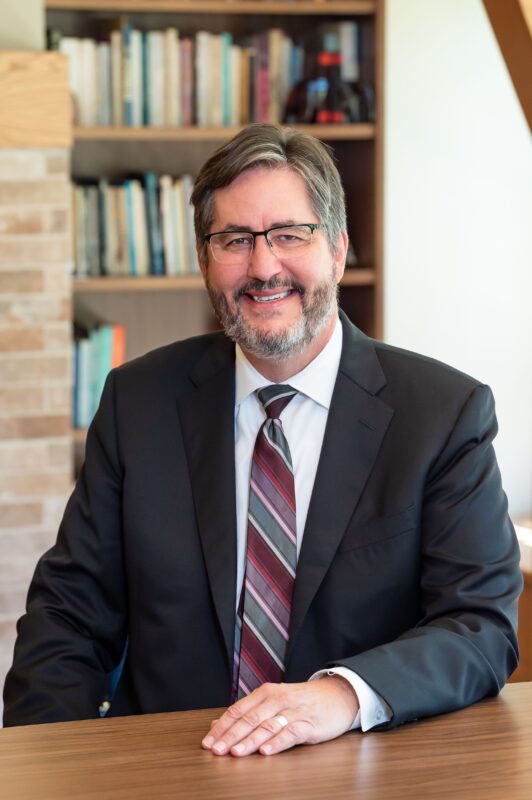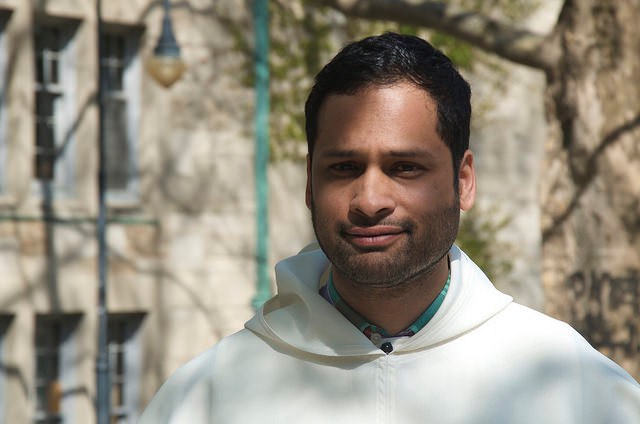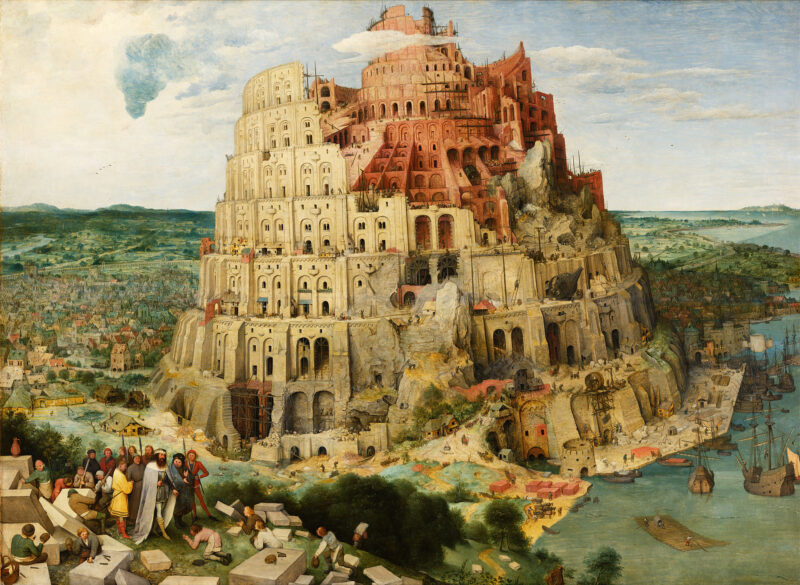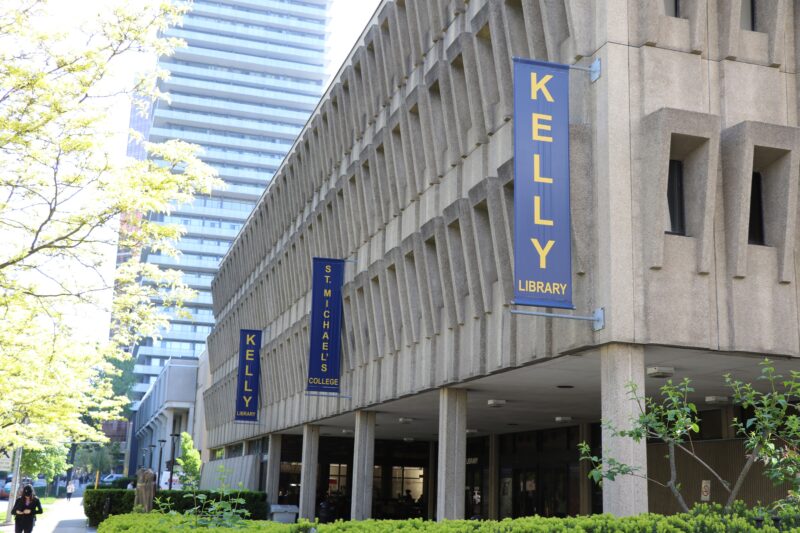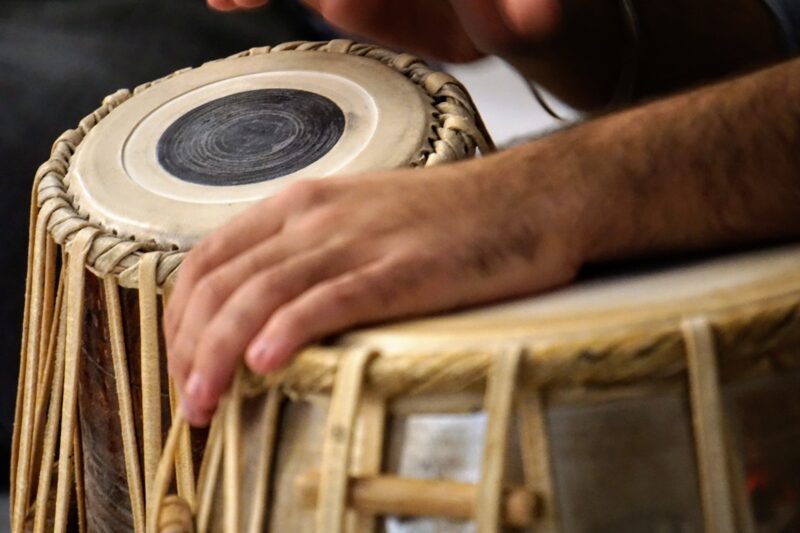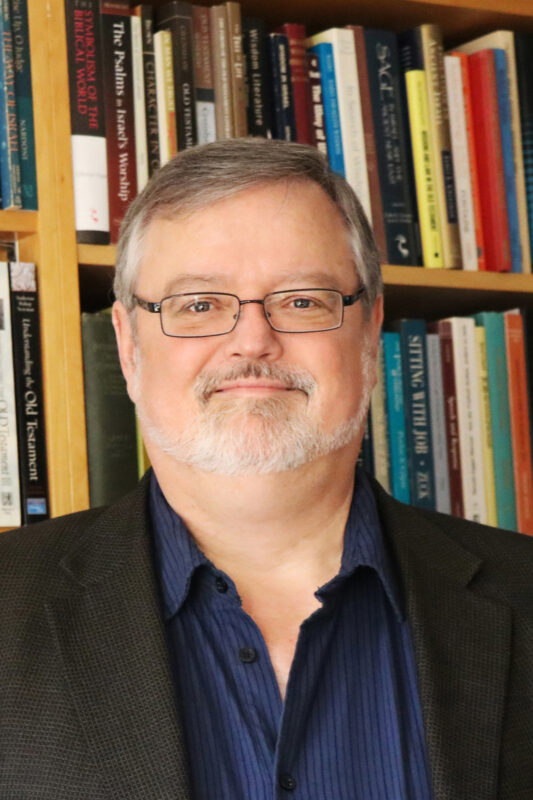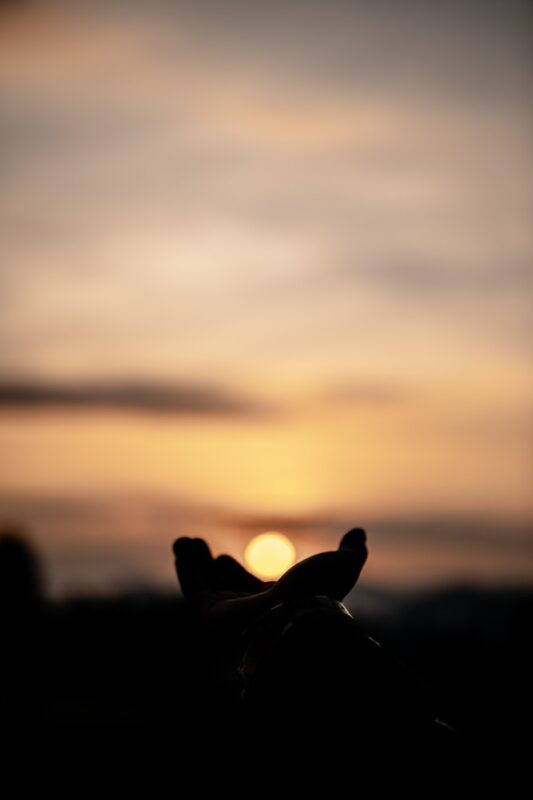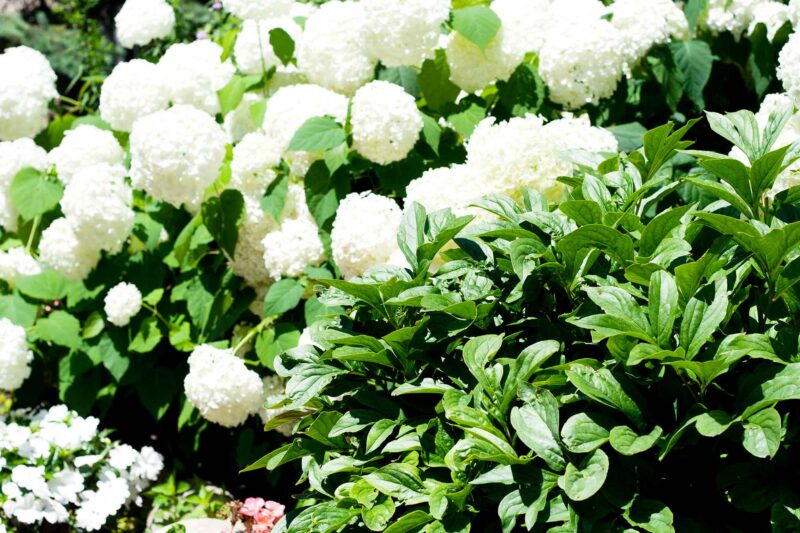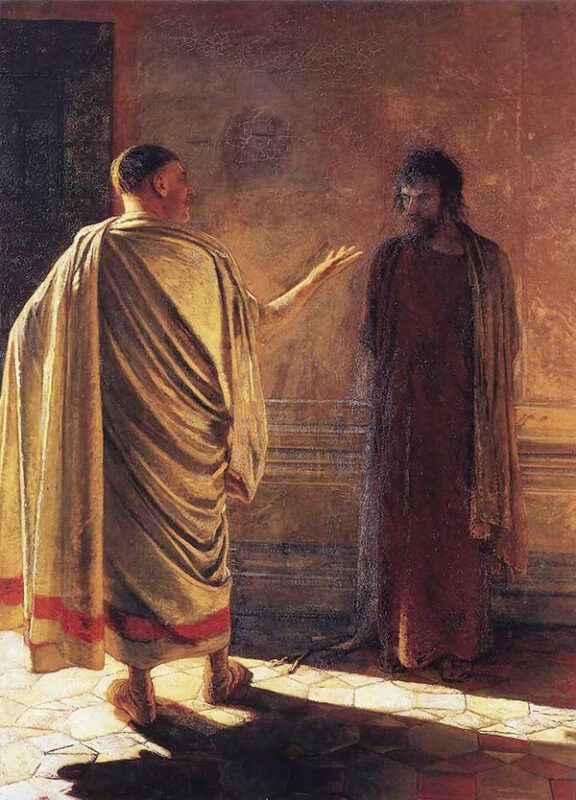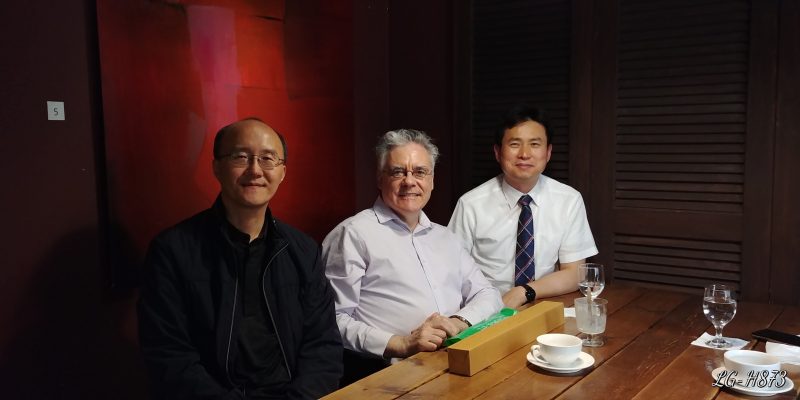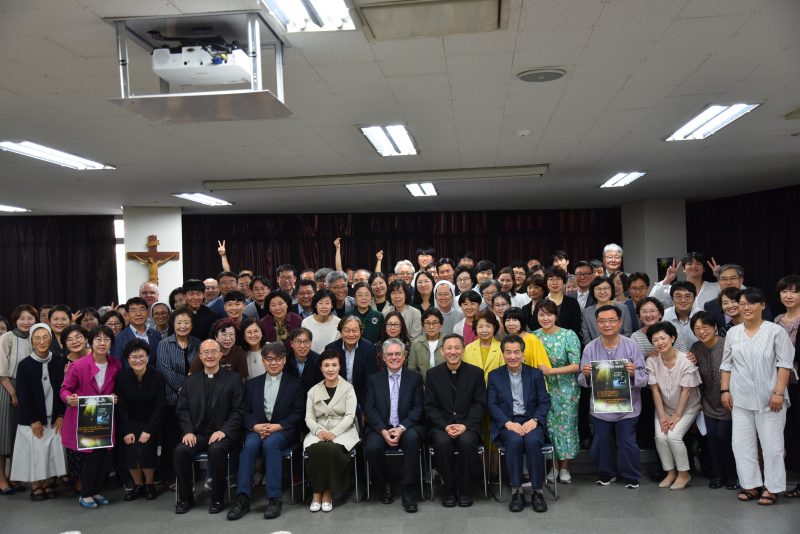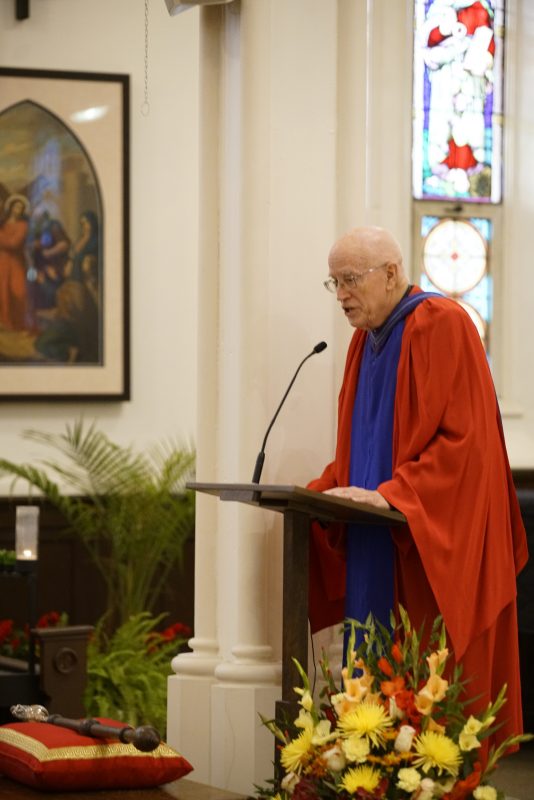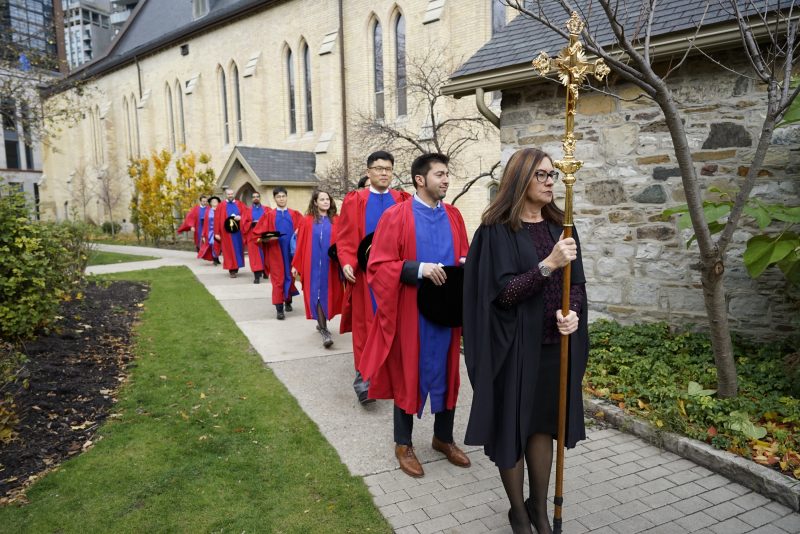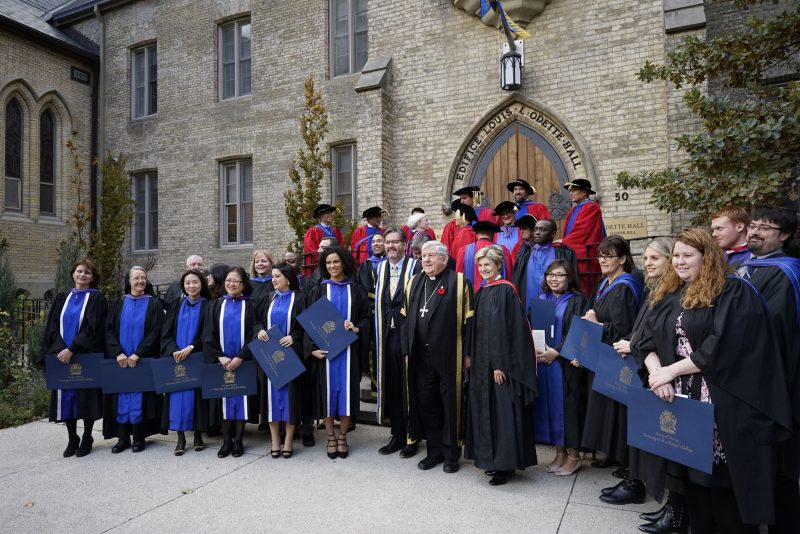
Montreal, March 14, 2024 – The Society of Jesus (the Jesuits) announced the appointment of Father Jeffrey S. Burwell, SJ, as the next Provincial of the Jesuits of Canada. This appointment is the culmination of a thoughtful, prayerful process of consultation and discernment, marking a significant milestone for the Canadian Province.
Father Burwell will succeed Fr. Erik Oland, assuming his new responsibilities on July 31, 2024, with an inaugural Mass at Our Lady of Lourdes Parish in Toronto. A special celebration will also take place at the Jesuit infirmary in Richelieu, Quebec, on the Feast of the Assumption, August 15, 2024.
The University of St. Michael’s College congratulates Fr. Burwell on his appointment and gives thanks for the service of Fr. Erik Oland.
More information about the appointment is available on the Jesuits of Canada website.
A new project from the Regis St. Michael’s Faculty of Theology (RSM) will offer educators the tools needed to help adolescents deal with the growing challenge of climate anxiety.
Climate anxiety – also known by such terms as eco-anxiety, climate grief, or climate trauma – refers to the negative impact climate change can have on mental health. Numerous surveys indicate the experience of worries and fears for the future brought on by climate change is growing and is particularly intense among adolescents and young adults.
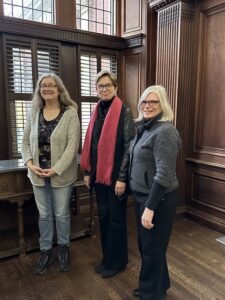
Now, RSM Professors Hilda Koster and Cynthia Cameron are launching Critical Conversations in Catholic Education: Climate Change and Eco-Social Resilience, a series of free workshops and a conference designed to engage educators in a conversation about how best to support adolescents and young adults in the face of a rapidly changing world.
“Young people are caught in a moment of feeling overwhelmed, and feeling hopelessness in the face of it all,” says Koster, who is an Associate Professor of Eco-Theology and the Director of the Elliott Allen Institute for Theology and Ecology. She also holds the Sisters of St. Joseph of Toronto Chair in Theology at RSM.
Climate anxiety “is a spiritual problem, and not just a problem of morals. It’s an existential issue,” she says, noting that the syndrome can result in apathy, isolation, and depression. “It’s hard to feel connected when you are anxious.”
Koster notes that while many Catholic schools now include Laudato Si’, Pope Francis’s groundbreaking encyclical on the environment, in their curriculum, there is a new but growing body of research and literature on climate anxiety that teachers may not be aware of yet. The two professors plan to draw on familiar spiritual resources such as Laudato Si’ (also referred to ‘On care for our common home’), which was promulgated in 2015, while also introducing newer materials specifically addressing climate anxiety.
“We want to help school boards and teachers connect the dots between the ecological, religious, and mental health aspects of this issue,” says Cameron, who is Assistant Professor of Catholic Education at RSM and holds the Patrick and Barbara Keenan Chair in Religious Education. Everyone working in a Catholic school is a religious educator, she notes, and so findings ways to help students develop resilience in the face of climate anxiety touches everyone from the chaplain to English, science and health teachers, for example, through to administrative staff.
The project is designed primarily to address issues emerging in the Grs. 7-12 range, with particular emphasis on the high school years, Cameron explains, noting there is a “confluence of anxiety and depression that begins to increase around the age of 11 or 12.”
While the Critical Conversations workshops will be presented through a Catholic lens, many of the lessons learned will be applicable to all students regardless of faith tradition, she adds.
Doctoral candidate Rosemary Boissonneau, who is also working on Critical Conversations, sees the project being particularly helpful to new teachers. While not the target age of the project, many young teachers are also facing their own climate fears, she says, questioning, for example, the risks their own children may face if climate change is not controlled. These personal worries come as they work with students who are extremely stressed by the topic – one of the factors that can lead to teacher burnout, says Boissonneau, a teacher herself.
The first workshop will be led by Cameron and Koster, focussing on the topic of “Climate Anxiety, Education, and Catholic Social Teaching” In addition, there will be a presentation by teacher and alumna Gabrielle Chan on her research for her Master of Theological Studies thesis on “Laudato Si’, Climate Anxiety and Youth.” Boissonneau will speak on her work as an educator, climate activist with “Fridays for Future” and “The Laudato Si’ Movement,” and a biblical scholar.
This workshop is co-sponsored by the Halton Catholic District School Board and the Dufferin-Peel Catholic District School Board and takes place on Wednesday, February 21 from 4:30-6 pm at St. Francis Xavier Secondary School, 1145 Bronte Street South, Milton, with an online option available.
The second workshop, “Science, Suffering, and Eco-Theology,” will be held on Wednesday, April 17, will include a presentation by Prof. Adam Hincks, S.J., who is Assistant Professor and the Sutton Family Chair in Science, Christianity and Cultures at St. Michael’s. He will be joined by RSM’s Prof. J.P. Fortin, who is Associate Professor of Practical Theology, and doctoral student Deanna Zantingh, whose research area focuses on Indigenous youth suicide and environmental devastation. Sr. Mary Anne Francalanza, fcJ, a science teacher who is working toward a diploma in Theology and Ecology will also be speaking. This second workshop is sponsored by the Durham Catholic District School Board at its Pope Francis Conference Centre, at 652 Rossland Rd. W. in Oshawa. This event will also be offered online.
While the workshops are designed primarily for teachers, the concluding day-long conference will have a broader audience, including students from the Toronto School of Theology and various faculties and departments at the University of Toronto. Youth, Climate Anxiety and Religious Education, which takes place on Saturday, Oct. 5 on campus, will feature Prof. Joyce Mercer, a professor of practical theology and pastoral care at the Yale Divinity School who has written on the topic of children and climate anxiety.
Along with a keynote address, the conference will include panel discussions, opportunities for networking, and tables of information.
“This project is a two-way street,” says Koster, who says that she and Cameron look forward to listening to and learning from the experiences of teachers working with adolescents to further their own work.
The Critical Conversations project is being funded by a Moving Forward in Mission grant from the Association of Theological Schools, RSM’s accrediting body. The professors note that the grant’s stated purpose reflects RSM’s commitment to serve the broader community, offering educational outreach to answer critical issues of the day.
With the fall semester in full swing, we had a rich range of activities take place, including many that focussed on caring for our neighbours. From mental health awareness workshops to St. Mike’s beloved traditions, here is a sampling of the things we celebrated in November and December.
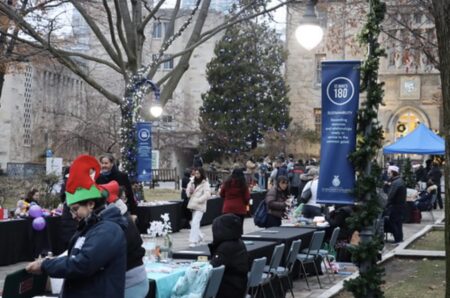
Christmas Market, Community Efforts Raise Funds to Help Others — Elmsley Place was lit with lots of light and merriment on December 7th for the 2nd Annual Christmas Market. St. Michael’s welcomed 30 vendors (students, alumni and community members) and hundreds of shoppers to purchase gifts at this festive occasion. With many tables donating their proceeds to charity, we were able to raise more than $2300 for the Romero House. The market was a success and we look forward to continuing the tradition next year.
Another $1378 was raised for St. Basil’s Out of the Cold program via donations collected at St. Michael’s Schola Cantorum concert, the Regis St. Michael’s Faculty of Theology, Campus Safety U of T, our Christmas Luncheon, and in-kind donations. Thanks to all who gave so generously and lent their time and talents.
Alumni Christmas Tea Delights — One of our favourite traditions, the Alumni Christmas Tea, took place just before the Christmas Market opened. It was great to see longtime friends back on campus for high tea and gorgeous music from the Schola.

Falalala Formal — Student leaders at SMC celebrated a fantastic first semester at the inaugural Falalala Formal. The formal was organized as a way to thank our involved students for all their hard work and dedication to serving their peers.
RSM Marks Convocations — In November, Regis and St. Michael’s theology students participated in their respective convocations. The keynote speaker at St. Michael’s convocation was Archbishop Donald Bolen of Regina, while the Keynote at the Regis Convocation was Sr. Elizabeth Mary Davis.
Regis College hosted its annual Chancellor’s Lecture, delivered by theologian Prof. Werner Jeanrond, in November, and the students gathered to let their hair down with a Karaoke night early in December.
Fall FAS Convocation — More than 100 St. Michael’s students received their diplomas at the Fall Faculty of Arts & Science convocation in early November. Festivities also included an awards ceremony for some of St. Mike’s top students.
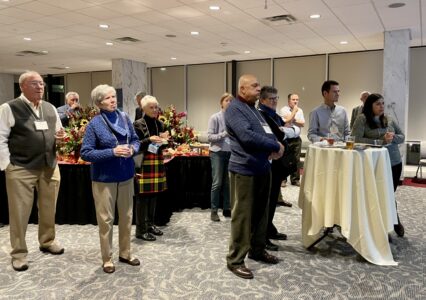
St. Mike’s Visits Rochester Alumni — President David Sylvester and Lisa Gleva, our Executive Director, Advancement, had a great time getting caught up with our many alumni members who live in the Rochester, NY, area. We loved the feedback on life at St. Mike’s and we were excited to share lots of news about exciting developments at their beloved alma mater.
Be There Certificate Contest Winner — Congratulations to SMC student Dzhafar Kabidenov, winner of the Be There Certificate contest and a $50 gift card. Thank you, Dzhafar, for completing the certificate and building the knowledge base, skills, and confidence to safely support anyone who may be struggling with their mental health. The Be There Certificate is a free online self-paced learning opportunity featuring an actionable framework designed to increase mental health literacy and provide the knowledge and skills needed to recognize signs of distress and safely support yourself or anyone struggling with mental health.
More SMC Frontline Staff Received Suicide Prevention Training — SMC registrarial staff participated in professional development and received SafeTALK (‘Suicide Alertness for Everyone’) training in a November workshop co-facilitated by Emily VanBerkum-Farahat and Emma Oliver. The primary goal of SafeTALK is to provide participants with the confidence and skills to become suicide alert so that people with suicidal thoughts can be identified and provided life-affirming care.
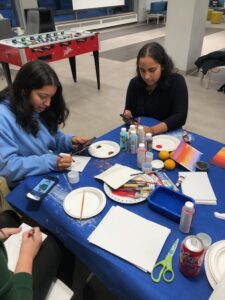
SMC Students De-Stress Through Creative Arts — SMC students put stress relief in action in November with canvases, brushes, and paint provided for students to make their own masterpieces. An instructor was on standby in case students wanted to learn basic techniques or brainstorm ideas for how to get started or what to paint. This was the fall term’s final event in the ‘Wonderful Wednesday’ art-based series piloted. The series will return this semester with a variety of activities such as dance and creative writing that nurture and celebrate artistry, imagination, self-confidence, and self-expression!
SMC Students Explore Coping Skills — During prime mid-term season, Manager of Community Wellness Emily VanBerkum-Farahat, SMC’s Wellness Council, and student participants explored the topic of stress and coping. Together, we learned what stress is, how it’s triggered, and how to bolster self-awareness and natural resiliencies to cope better in personalized ways. Students also had the opportunity to foster open and direct talk about stress management and wellbeing through conversation guided by St. Mike’s Talking Circles leaders, while eating a delicious dinner together.
SRS Capstone Award Winners — Student Capstone Projects, the summative exercise in the Diploma in Social Responsibility and Sustainability Program, were awarded in early November. These projects are designed to create positive social and environmental impact. The 2022-23 winning projects focused on embedding equity in social and environmental practices, creating shared value in the construction and music industries, and embedding sustainability and social responsibility within small and medium companies, in public institutions and at the country level. Congratulations all!
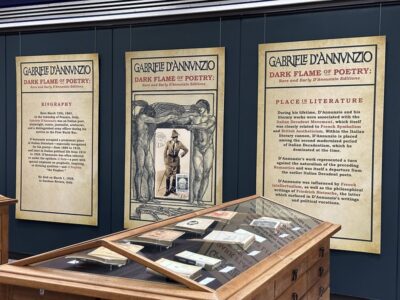
John M. Kelly Library Alive with Activity — Library staff welcomed grade 12 students from Peele and Halton in November as part of the college’s Capstone program. Students learned about the U of T libraries, Library of Congress classification, and got practice finding a book on the shelf.
The Dark Flame of Poetry exhibit launched in November. Curated by Remi Pulwer, Head of the Kelly Library’s Technical Services, this exhibit celebrates 160th anniversary of the birth of Italian poet Gabriele D’Annunzio.
The library held an open house for students this fall. Students dropped by the ground floor to meet staff, pick up pamphlets, and munch on snacks.
The University of St. Michael’s College community is remembering Fr. William Irwin CSB as a gifted professor, an inspiring homilist, and a man of extraordinary pastoral skills who cared deeply for his students.
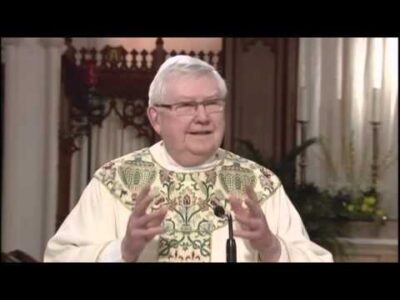
Fr. Irwin, who died on Dec. 6 at the age of 91, was a biblical scholar who specialized in in the Book of Isaiah and the Book of Psalms. He taught at St. Michael’s Faculty of Theology for decades, serving as Dean of the Faculty from 1981-1985. From 2001-2004 he was President of Assumption University in Windsor, On.
Born in Houston, Texas, Fr. Irwin earned a BA and an MA from the University of Toronto and a Baccalaureate in Sacred Theology from St. Michael’s before going on to further studies at the Angelicum and the Pontifical Biblical Institute in Rome. Ordained a priest in 1959, he joined the Faculty in 1965 and continued teaching part-time into his 80s, well past his formal retirement date.
“Fr. Irwin is one more example of the tremendous debt St. Michael’s owes to the Basilian Fathers,” said Prof. Jaroslav Skira, Dean of the Regis St. Michael’s Faculty of Theology. “I am particularly grateful for his dedication as Dean of the Faculty of Theology, for his scholarship in the Hebrew Scriptures, and for helping educate numerous graduates–some of whom we count as members of the Regis St. Michael’s Faculty of Theology.”
In an address to the Faculty of Theology convocation in 1985, Fr. Irwin spoke to those assembled about the importance of balancing study with lived experience, noting that “the Gospel not only enlightens but transforms,” and urging all to become engaged with the world, using their gifts to teach a message of hope. It is a model his former students recall well.
Doctoral candidate Sr. Carla Thomas O.P. who studied the Psalms with Fr. Irwin, remembers him as “a kind and gentle instructor. Fr. Bill taught by his personal presence as much as by his lecture,” she said. “I was struck that in his retirement years he still continued to teach students, in spite of all the demands that it must necessarily have made on him in so many ways. I remember him telling us that his favorite psalm was Psalm 73, and that God does not punish. Rather, God leaves people to their own counsel.”
Long-time Faculty Professor John L. McLaughlin also studied under Fr. Irwin.
“Bill Irwin was my Doktorvater, directing my Ph.D. dissertation, later was my colleague, and in both roles I considered him my friend,” recalled McLaughlin. “Bill combined insightful biblical scholarship with a deep pastoral sensitivity, both inside the classroom and outside. He was one of the best, if not the best, homilist I have ever heard from a number of religious traditions. In his teaching he combined careful detailed scholarly treatment of biblical texts with the relevance of the results for the Church and the world.”
But, adds McLaughlin, Fr. Irwin “was also attentive to what students were going through. Partway through an individual Reading and Research course in the first year of my doctoral studies, I lamented that I was feeling run down, not sleeping and feeling overwhelmed, ending with ‘I don’t think I can handle a Ph.D.’ He responded that most students felt that way in the first year, then told me not to read anything new for our next meeting, just review what I had read, and told me to take at least one day and sleep. When I walked into his office two weeks later, before I could say anything he asked, “Did you sleep?” He truly cared as much for the person as he did for the project.”
In 2015, Fr. Irwin delivered the Meagher Lecture at St. Michael’s, offering a talk entitled Between Church and Theology: The St. Michael’s Faculty of Theology at 60, to mark the Faculty’s six decades of granting degrees.
He also touched the lives of students he had never taught by endowing scholarships for dozens of students in the Faculty.
Visitation will be held in the chapel of Presentation Manor, 61 Fairfax Cres. in Scarborough, on Friday, December 15 from 9:30 a.m.-10:30 a.m., with a funeral immediately following.
Cynthia Cameron, Assistant Professor of Religious Education and the Patrick and Barbara Keenan Chair in Religious Education, has received a US$2500 fellowship grant from the Wabash Center for Teaching and Learning in Theology and Religion in Crawfordsville IN. The grant follows her participation in the 2022 Hybrid Workshop for Early Career Theological School Faculty and supports her continued exploration of liberatory learning in graduate theological education.
Her funded project, entitled “Canadian Indigenous Pedagogies for Theological and Religious Education,” explores best practices informed by Indigenous scholars of critical pedagogy with an eye towards cultivating a stance of ally-ship in the struggle for reconciliation. Her goal in learning about Indigenous pedagogies is not only to incorporate them into her regular practice of teaching at the Regis St. Michael’s Faculty of Theology, but to invite her students to think theologically and pedagogically about their own practices of religious education, faith formation, and pastoral ministry.

The University of St. Michael’s College will host a key event in Pope Francis’s Synod on Synodality process with the findings from a North American report commissioned by the Vatican as part of the Doing Theology from the Existential Peripheries project to be presented during a panel discussion on campus.
The panel, moderated by Dr. Mark McGowan, will take place Thursday, November 10 from 7-9 p.m. and will also be made available online.
Dr. Darren Dias, OP, an Associate Professor in St. Michael’s Faculty of Theology who also serves as Executive Director of the Toronto School of Theology, was appointed last December by Rome’s Dicastery on Human Integral Development to join the project’s North American working group, with similar exercises conducted around the world. The eight theologians conducting the research listening to the concerns of those on the margins were led by Stan Chu Ilo, a St. Michael’s alumnus who is a professor of World Christianity, Ecclesiology, and African Studies at Chicago’s De Paul University.
“We have presented our findings in the context of a conversation,” says Dias, who explains that there is an ongoing commitment on the part of the working group–and Pope Francis–to listen to the experience of people, and especially to those who often find themselves without a voice. Each of the six working groups around the world is invited to hold some sort of event to share their initial findings as part of an ongoing conversation/listening process to ensure that the findings are known to the general public.
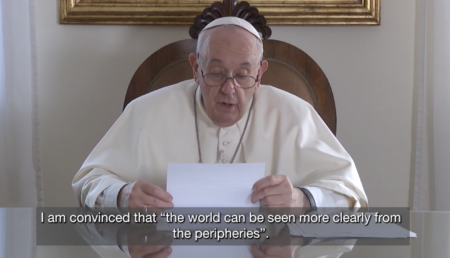
The groups were assigned themes from Pope Francis’s teachings such as migration, ecology, and vulnerability. As the North American report explains, “we take readers into the world of so many people whose voices are not often heard in our churches and society,” with members of the working group visiting prisons, refugee and immigration centres, national borders, convents, holding centres, seniors’ residence, rehabilitation centres, churches and social and pastoral centres, to name a few.
“We are committed to bolstering ways in which theology can support engaging the peripheries,” Dias says. “This is a research project, an academic exercise, and we will report our findings to the bishops, theologians, pastoral workers, and the faithful in service to the Church. This is the business of a Catholic university, to be at the margins. We are committed to bolstering a theology that supports the theological renewal proposed by Pope Francis.”
Pope Francis launched the synodal process in 2021 to help the Church to listen to its constituents and learn from them. The pope has since extended the window during which the synodal process takes place until 2024.
Earlier this year the University of St. Michael’s College Synodal Working Group held seven listening circles for students, staff, and faculty, and conducted 25 one-one-one interviews before submitting a report to Rome on the findings. University President David Sylvester presented a brief summary on the methods used at St. Michael’s to Nathalie Becquart, XMCJ, undersecretary and consultor to the Synod at meetings in Rome in June.
Final reports from the peripheries project are available online: https://migrants-refugees.va/resource-center/publications.
Watch the video for additional context: Wisdom from the Margins
RSVP to attend in person: https://bit.ly/3CIOLEt
RSVP to participate online: https://bit.ly/3yUKKvw
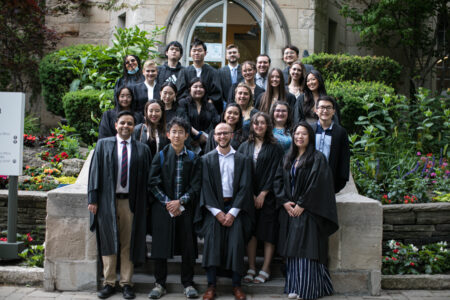
Summer has brought welcome changes to the University of St. Michael’s College campus. As the flowers bloom, and we prepare for the school year, we are taking time to look back on June and July, and share some of our wins, successes and achievements of the season.
Convocation — We celebrated the Class of 2022 and welcomed this year’s graduates into the St. Mike’s alumni community at our Graduate & Family BBQ hosted by St. Mike’s Alumni Affairs. Elmsley Place provided a beautiful setting to celebrate graduates’ achievements, open Convocation gifts, and enjoy a delicious lunch.
Mentorship program — We are proud to announce that the mentorship program has more than 135 first-year mentees matched with upper-year mentors, with more students signing up daily!
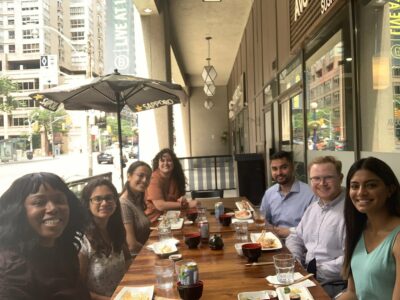
New Hires — We welcomed a number of new hires, who continue to serve and help enrich our students, faculty, and community. Some new hires gathered on July 22 to connect with each other and build new relationships. From left to right: Tamarah Bryan, Erica Figueiredo, Sumeeta Farrukh, Karina Stellato, Nabil Arif, Kevin O’Rourke McColl, Jashan Khokhar.
Dr. Nicholas Terpstra took up the position of St. Michael’s Interim Principal on July 1. Terpstra, whose research examines the intersection of politics, religion, gender, and charity in Renaissance Italy, has taught at the University of Toronto since 1998. His current research is focused on two main areas: a digital mapping project based around Renaissance Florence, and a study of of how different social, cultural, and religious groups used spatial and sensory boundaries to navigate their relations with each other in 16th-century Tuscany.
Regis-St. Michael’s Faculty of Theology welcomed its new Dean: Dr. Jaroslav Skira, who hosted an open house gathering at Regis on July 13 which was well attended.
Regis College also welcomed its new President, Gordon Rixon, SJ.
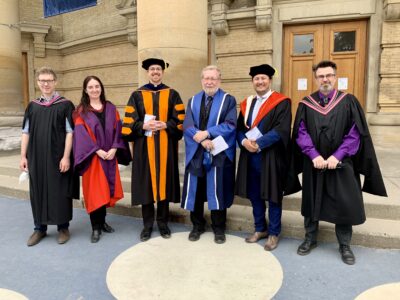
New Journeys — We bid Dr. John McLaughlin goodbye as former Dean of the Faculty of Theology. He will continue to serve as a Professor of Old Testament /Hebrew Bible at the Faculty of Theology. We are also celebrating the goodbye (for now) of Mark McGowan, the former Interim Principal at the University of St. Michael’s College from 2020-2022. He is going on sabbatical for research in Ireland. After that, he will continue to serve as Senior Advisor to the President, on Catholic Education, and will return to Celtic Studies and the History Department following his leave.
Renovations — We had some window cleaning at Founders House, which allows our staff to continue to see our Oasis in the City all around us. The Wellness Centre renovation in Elmsley Hall is moving wonderfully and is scheduled to be completed before Labour Day weekend.
Retirement — We celebrated the retirement of Jean Talman, Program Assistant for the Celtic Studies program, with 32 years of service at the University. Sláinte!
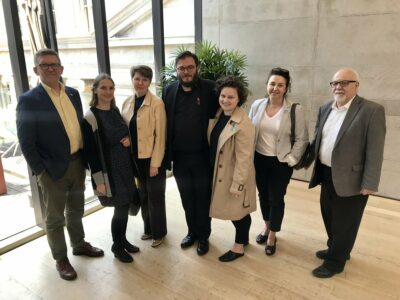
Ukrainian Visitors — MASI is proud to #standwithukraine. On June 29, the Metropolitan Andrey Sheptytsky Institute of Eastern Christian Studies (MASI) had a planning session to prepare for the hundreds of Ukrainian students expected to arrive from Ukraine at the University of Toronto this fall, thinking about how we can support them at the University of St. Michael’s College.

Welcome Day — On June 11, St. Mike’s opened its doors for an in person for Welcome Day, an opportunity for incoming students and their parents to learn about the university experience and critical first steps as they begin their university journey. Hybrid academic info sessions hosted by the Registrar and Student Services staff, campus tours, booths for student resources at St. Mike’s, and lunch in the Canada Room were some of the activities available to our newest students.
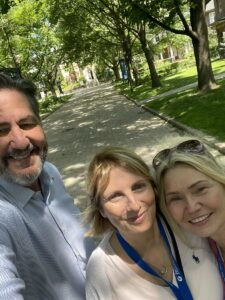
Summer has brought us beautiful weather and gorgeous flowers and trees — and Summer Camp. We currently have educators and students from Rome–seen here with President Sylvester are Alina Axinte and Celestine Cavalcante from The Parioli English School– on campus this summer for the Sol language Camp.
We hope that each of you can visit to see our campus in person, which gets more beautiful every year. There’s a reason St. Mike’s is known as the #Oasisinthecity!
Susan McElcheran is a doctoral student at the University of St. Michael’s College Faculty of Theology, with special interests in pneumatology, theologies of disability, and interreligious diversity. She has a background in teaching students with learning disabilities, and lived for several years in the L’Arche communities in France and Africa.
Looking ahead to Holy Thursday and Good Friday and reflecting on their meaning for me this year, my mind travels back two years, to the first pandemic Holy Week. What have the two years since then brought to the meaning and the hope of Holy Thursday and Good Friday?
In spite of the worry generated by the pandemic, hope emerged in unexpected ways. Governments who had until then protested lack of funds for projects supporting the common good suddenly found millions of dollars for public health initiatives. The cessation of polluting industrial activity during lockdowns brought a resurgence of the natural environment as plants and animals moved into unpopulated city-scapes. Everyone cheered for health-care workers and banged pots and pans. There was a feeling that neighbours, public and private spheres, and different nations were coming together to overcome a common threat. Perhaps these experiences could teach us that our own health and welfare is of one piece with that of others, of poor countries on the other side of the globe, of the Earth itself?
As pandemic time rolled on long beyond anyone’s dreams, something changed in that early hopefulness. Divisions became more visible between those whose jobs allowed them to work at home and the “essential workers” who had to cram onto crowded buses and subways. They were called “heroes” but if they caught COVID they had to face the decision whether to isolate or feed their families. Divisions between rich and poor countries became more apparent in the inequities of vaccine distribution. Sympathy with collective goals reverted to each person having to bear the burden of their own health. Hope for positive change dissipated.
Where is the hope, then, as we go through Holy Week? As I think on this, I wonder about the amount of time the Church asks us to spend with the suffering of Christ, not only in Holy Week but throughout Lent. Why do we spend so long in the valley of the shadow before we get to the light of Easter? Why did Jesus delay going to save Lazarus, and why did he stand in front of the tomb and weep, when he knew that he would bring his friend back to life? On reflection, I have a few thoughts about how this time can prepare us to receive the hope of Easter: by undoing our usual expectations; by preparing us to receive the unexpectedness of hope; and by an element of “being-with”.
Undoing usual expectations: When there is bad news we so often either dismiss it by mentally distancing ourselves from any danger, or we fixate on possible consequences for ourselves, dwelling on a worst-case scenario. In both cases, we are not living in the truth of the present moment, since we are creating fictional scenarios. Our fear and unwillingness to live in uncertainty prevent us from staying in the unknown of the present as we create either avoidance or anxiety thought patterns that keep us from opening up to the reality of the here and now where God is present. Staying present in the reality of Holy Thursday and Good Friday helps us to stay within the present situation without fear, denial, or escaping, without pretending it doesn’t affect us or over-catastrophizing to avoid uncertainty. This remaining in the present transforms perception to receive the unexpected.
Unexpectedness: The seeming hopelessness of Jesus’ situation on Good Friday shows that hope is hidden and can’t be predicted or foreseen. Jesus himself said, “The kingdom of God is not coming with things that can be observed; nor will they say, ‘Look, here it is!’ or “There it is!’ For in fact, the kingdom of God is among you” (Lk 17 20-22). This hiddenness of the Kingdom means that true hope does not over-determine results ahead of time, rather staying open for what is surprising and unexpected. The unconditionality of Jesus’ self-gift without any guarantee or apparent victory, if we have the courage to stay with it, sets us off our balance and destabilizes us to open up to the surprise and newness of God’s life in our midst. We sometimes foreclose on hope by insisting on an answer before we are ready to perceive it. As Rainer Maria Rilke puts it:
“Do not now seek the answers, which cannot be given you because you would not be able to live them. … Live the questions now. Perhaps you will then gradually, without noticing it, live along some distant day into the answer.”
“Being-with”: Holy Thursday and Good Friday bring us to the full extent of the meaning of Jesus’ name Emmanuel, “God with us”: that he not only took on human form but became obedient “to the point of death – even death on a cross” (Phil. 2:6-8). The change of perspective through the undoing of our usual expectations and the realization of the hiddenness of the Kingdom ready us to participate in this “being-with”. As we stay in the presence of this love that comes to be with us, open to its hiddenness and surprise, we are changed in ways we can’t predict:
“Only God could say what this new spirit
gradually forming within you will be.
Give Our Lord the benefit of believing
that his hand is leading you,
and accept the anxiety of feeling yourself
in suspense and incomplete.”
Teilhard de Chardin
Holy Week doesn’t hand us hope in an Easter basket, but it frees us from fear and shakes us out of our expectations so that we might be more open to receive it.
Read other InsightOut posts.
A message from University of St. Michael’s College President David Sylvester
Dear members of the St. Michael’s community,
I am writing to let you know that Sheril Hook, Dr. William D. Sharpe Chief Librarian and Director of the Archives, will be leaving the University of St. Michael’s College after eight years of wonderful work. Although we are sad to see Sheril go, it is also a time to congratulate her on her new role as Associate Dean, Teaching and Learning at York University Libraries.
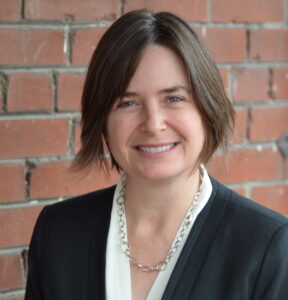
Sheril has been an integral part of St. Mike’s and has played a key role in bringing the community together with exceptional services, spaces — including the creation of a conservation studio and digital preservation studio–and the development of collections to support a diversity of intellectual pursuits.
Upon arrival at St. Mike’s, Sheril initiated the development of a five-year strategic plan that included revitalizing library spaces, building staff capacity, and increasing the staffing complement. She guided the library toward projects that could enhance both the student and faculty experience while also increasing the visibility of and the ability to care for special collections.
Aligning with institutional priorities and ensuring staff capacity for shared leadership at Kelly Library, Sheril collaborated across divisions to create a robust annual lecture and exhibit program; created a new position for an outreach archivist that led to greater student use of special collections and advocated successfully for a new position for a conservator that led to the development of a front-of-house conservation studio to allow for both experiential learning opportunities as well as a high standard of care for the collection. Revitalizing the Kelly Print Studio led to the creation of beautifully designed letterpress publications that linked to the academic programs at St. Mike’s and involved the broader community in print production. With existing donations, generous support from the Friends of the Kelly Library, and feedback and funding from St. Michael’s College Student Union, Sheril increased and revitalized all seating in the library, added five group study rooms—the first group study rooms in Kelly, and refurbished existing spaces to create research and writing consultation rooms; purchased equipment to outfit the new digital preservation studio to digitize, store, and provide e-access to special collections; and built a new, enlarged space to house the rare book collection, paving the way for a new student-focused multi-use space on the first floor of the library.
I know that her colleagues, including those at the larger University of Toronto Libraries system, will miss her strategic insights and strong commitment to student learning and success.
Sheril’s last day at St. Mike’s is May 13, 2022. We expect to provide information about how the transition will be handled in the days ahead.

Sonal Castelino, Director of Campus Ministry, writes:
This Lenten season, Campus Ministry organized a retreat for students to find inner peace through an intentional and personal friendship with Jesus. This was an opportunity, an avenue – amidst the busyness of the academic term, the stress or the newness around the return to on campus learning, the helplessness in front of the war in Ukraine—to stop a moment and connect to that which is essential: finding grounding and depth in the spiritual life and thus hope and strength to persevere and continue.
The format of the retreat included committing to daily prayer for 30-40 minutes and a time for spiritual conversation weekly to unpack the prayer experience as a group and listen to each other over five weeks.
The retreat is inspired by the Spiritual Exercises of St. Ignatius of Loyola and the format we used was proposed by Michael Hansen, an Australian Jesuit who created a community through the First Spiritual Exercises.
To ensure accessibility, we offered this retreat both in person and online with facilitators to guide and move the retreat along with the participants. The experience has been a very fruitful one.
Here is the experience of Paul Kye, a doctoral student at St. Michael’s Faculty of Theology:
Sitting in solitude, I found myself interacting with Jesus one day, who had been waiting for my friendship and wholesome acceptance. I was introduced to this retreat couple of days later, and I have been participating it on my own every day. This journey has been life-changing, both in interior and external levels of my life–how I see this world and how I see myself. I emerge in prayer and meet Jesus, who appears to me at levels appropriate for my own level of spirituality, I feel so much love and attention, consolation and encouragement that I have needed. Sometimes I see him as a teacher, as the Creator or a friend who takes my own yoke in exchange of his light one, instills an enlightening understanding and newly nurtured love for my own cross to bear, and most of all, breathes in lifegiving joy and excitement in my heart to face the daily life. This exercise has transformed me, as I dedicate a specific set of time to it every day, it allowed to me to see my life not according to my own will or those of others, but according to God’s will.
Read other InsightOut posts.
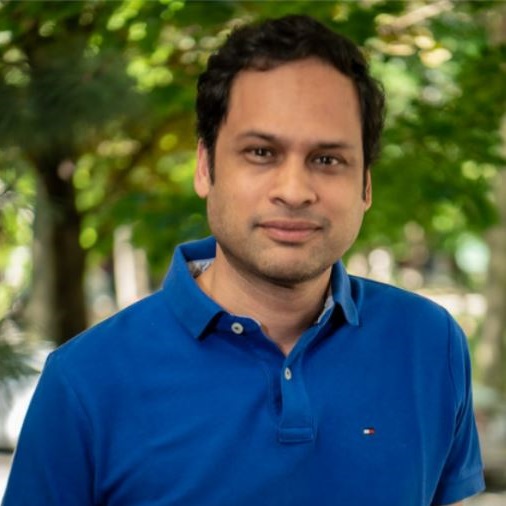
Faculty of Theology professor Dr. Darren Dias, OP has been awarded a grant from the Templeton Religion Trust in conjunction with Profs. Stephan van Erp, Inigo Bocken, and William Desmond of KU Leuven to work on a multi-year project entitled Metaphysics, Contemplation and the Religious Life.
The project, which will see the University of St. Michael’s College and Leuven each host a conference, includes the appointment of Dr. Jacob Benjamins to a post-doctoral position at St. Michael’s to teach and work on conference planning. The project’s work, which falls under the grant’s Widening Horizons in Philosophical Theology initiative, will run from 2022 to 2024.
The project, explains Dias, will explore the tension between metaphysics and theology using methods familiar to continental philosophy—an approach rooted in the thought of 19th- and 20th-century Western Europe—to examine the contemplative practices of the philosophical and theological schools of religious orders and congregations. The project will see scholars working in phenomenology and metaphysics, as well as systematic, mystical, and historical theology, calling on contemplative practices from within the religious schools as a way to support new, practical forms of thought in the twenty-first century.
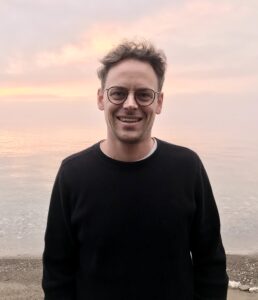
Whereas the past century has seen a rise in a perceived disconnect between metaphysics and theology, this joint project aims to demonstrate that there exists a “metaphysics of contemplation,” which is based not in an abstract approach but grounded in historical, communal, and performative ways of encountering reality as a whole, he says.
There are broad practical applications to the project, notes Benjamins.
“We would like to demonstrate that religious orders have the resources available to enrich spiritual traditions in modern life,” he says.
The first seminar will take place at Leuven December 1 to 4, 2022, hosted by the university’s Interfaculty Centre for Catholic Thought, with a second conference at St. Michael’s March 22 to 24, 2023.
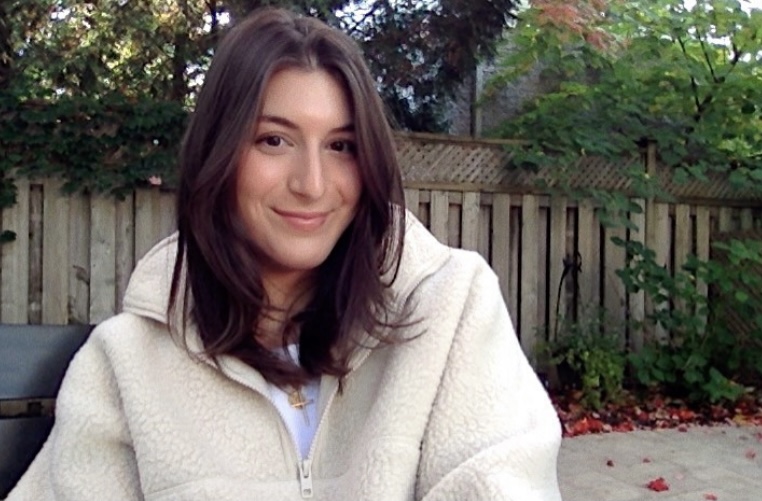
For doctoral candidate Mia Theocharis, an unexpected phone call from St. Michael’s President David Sylvester brought with it the opportunity of a lifetime: an invitation to meet virtually with Pope Francis.
Theocharis has been selected to take part in a virtual meeting with the Pope on February 24. The event, entitled Building Bridges North-South: A Synodal Encounter Between Pope Francis and University Students, is being hosted by Loyola University Chicago in collaboration with the Pontifical Institute for South America as part of the Pope’s Synod on Synodality, a process of consulting Church members around the world to gather their thoughts on the issues of the day.
With an emphasis on creating concrete educational projects to effect just environmental and economic change, the February 24 meeting will focus on issues relating to migration.
Panels of 20 or so students from each of seven regions in North, Central, and South America have been meeting online in advance of the virtual gathering to develop ideas on how to respond to migration challenges, reflecting on the various causes behind and how the Church should respond. Theocharis is one of the three Canadian students in her group, which represents eastern Canada and the eastern United States.
Each panel will have a spokesperson appointed to offer a brief summary of their group’s thoughts at the February 24. These presentations will be followed by a dialogue with Pope Francis.
“While it would be an honour to be the one to present our findings, honestly the biggest honour is to be part of this process,” Theocharis says, describing the drive for concrete ideas and the diversity of panelists she has met in her panel as extremely impressive.
“There are people with backgrounds in economics, environmental sustainability and theology; undergraduates and graduate students. It’s exciting to meet everyone involved, especially those from underrepresented groups, and to hear everyone’s viewpoint.”
The event will be livestreamed on February 24 at 1 p.m. EST.
Fall Convocation for the St. Michael’s Faculty of Theology and the Graduate Diploma in Social Responsibility and Sustainability program will take place online on Saturday, Nov. 13, 2021. To celebrate, we’re sharing the stories of some of this year’s graduates.
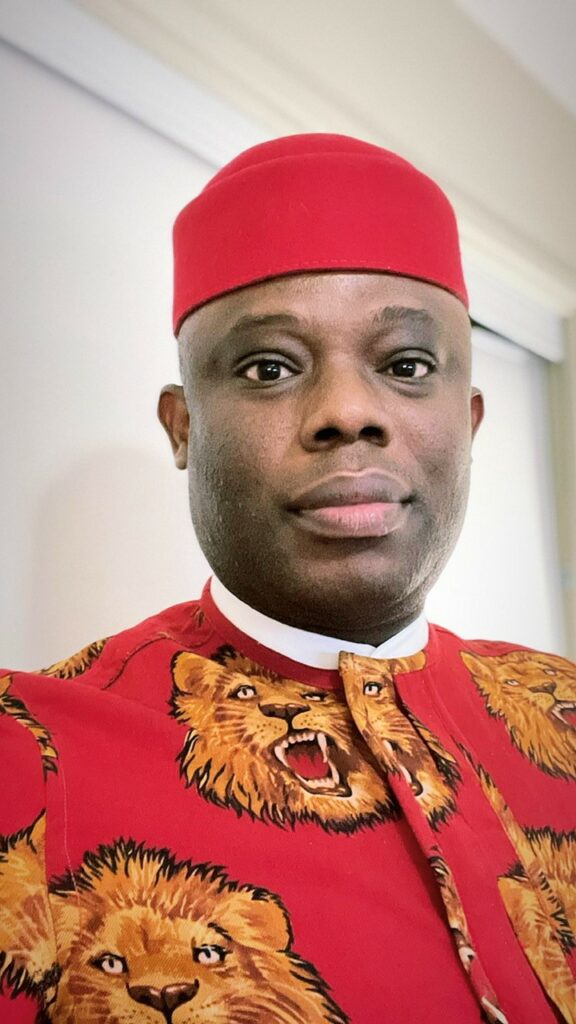
Master of Divinity graduate Samuel O’Ejeregbe was inspired to consider St. Michael’s Faculty of Theology after a priest friend spoke movingly about the quality of intellectual formation offered here.
“I visited Canada for the first time in 2015 to physically see the structures in place and I was utterly impressed,” Samuel recalls. “The professors were so helpful and not really keen on marks but ensuring that, as future Ministers, my classmates and I are a bridge for others, supporting and listening. That struck me!”
Samuel says the speical funding available for international students who are priests or studying for the priesthood is appreciated.
“I am always delighted to let my friends abroad who are keen about studying Theology that St. Michael’s has a good supportive system to support international students. I was moved by the support I received financially from the Faculty, funding that ensured a successful completion of my program particularly during the pandemic. God willing, I will be pursuing a vocation to the priesthood in the Catholic Church.”
St. Michael’s membership in the Toronto School of Theology, with TST’s members reflecting various Christian traditions, was another plus for Samuel, who says he benefitted from the ecumenical approach at TST.
“Love is the greatest. Other religions should not be treated like they are not God’s children because they not Christians.
“St. Michael’s College is welcoming and non-discriminatory, truly living the Gospel message that ‘All be One.’ In my spare time, I hope to assist the University in recruiting friends from the United Kingdom and Africa keen on studying Theology to consider the University of St. Michael’s College as first choice for Creative Theology. Many thanks.”
Celebrate this year’s graduates with us at the Faculty of Theology’s Fall Convocation 2021 page.
Fall Convocation for the St. Michael’s Faculty of Theology and the Graduate Diploma in Social Responsibility and Sustainability program will take place online on Saturday, Nov. 13, 2021. To celebrate, we’re sharing the stories of some of this year’s graduates.
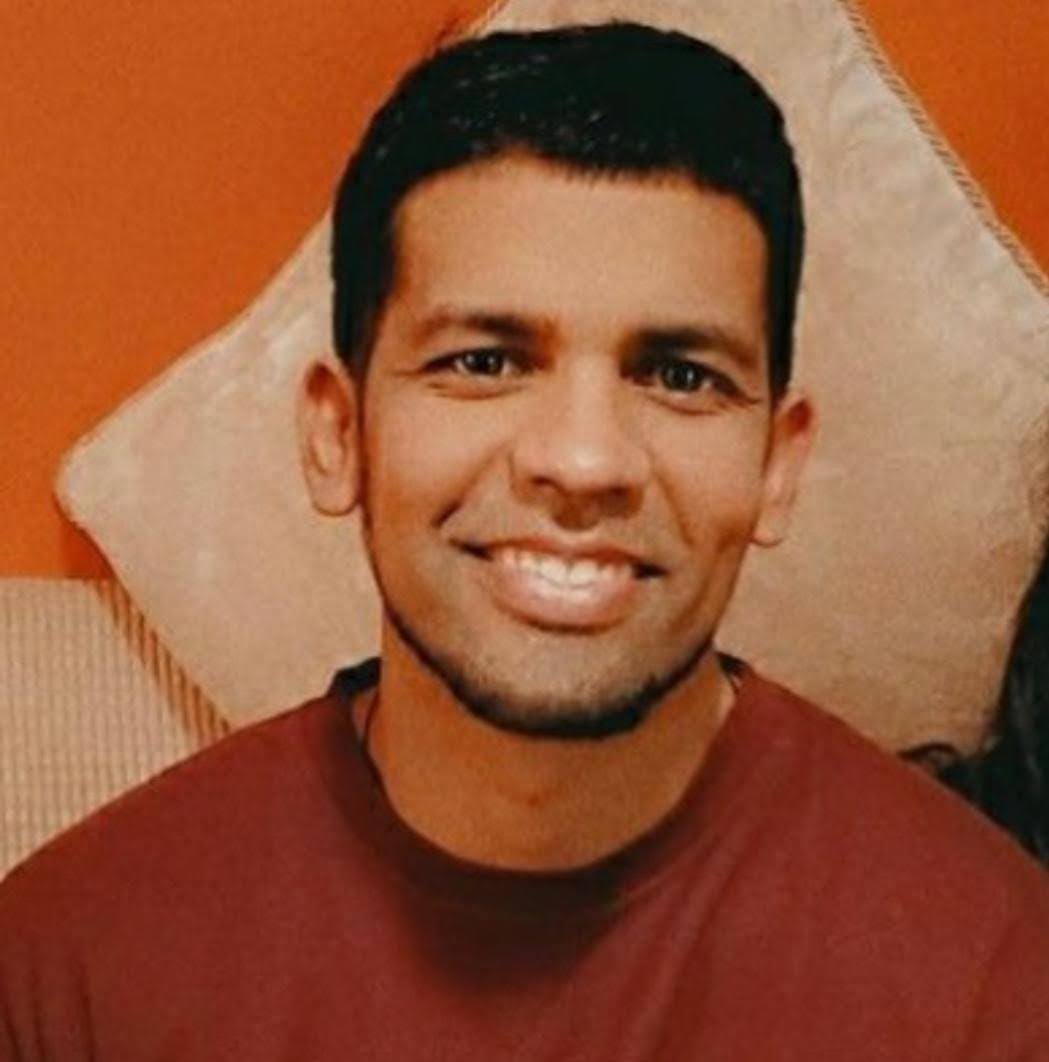
“I was drawn to study at the St. Mike’s Faculty of Theology out of a desire to learn more about my faith and my church,” says Andrew Selvam, a member of the Dufferin-Peel Catholic School Board (DPCDSB) cohort who will be awarded his Master of Religious Education degree on Saturday, Nov. 13, 2021. “At the same time, it became evident that St. Mike’s had an awesome reputation in the field of Theology within the province and country. Having a faculty with a local satellite campus and a program drawn towards educators made it easier to complete my first few courses.”
While the pandemic altered delivery of classes, Andrew says “both the virtual and in-class experiences were enjoyable…. The lectures, readings and discussions were informative and made you want to delve deeper into aspects of faith and course content that you had never thought of before. Professors care about your experience and understanding of the material.”
While earning his degree while working working full-time was a significant time commitment, Andrew notes that program offerings at other colleges within the Toronto School of Theology expanded his choices, both in terms of scheduling and course options. And, he adds, “St. Mike’s also has an incredibly faculty of professors who are here to assist you.”
He singles out experiential learning as a particular benefit to his time at. St. Mike’s, noting the abilty to study ecotheology with the Sisters of St. Joseph at their retreat centre in Cobourg and the opportunity to enroll in A Journey Through History: The Jesuit Mission in Midland were particularly meaningful.
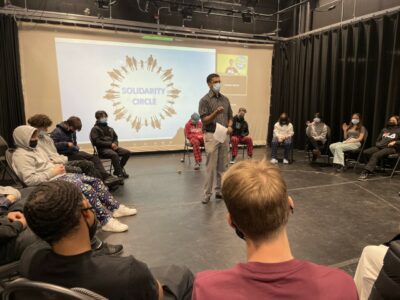
As he looks forward, Andrew says his experience at the Faculty will be a huge benefit as he begins his new ministry as a chaplaincy leader with at Iona Catholic Secondary School, adding that his studies were also relevant to his classroom work as a degree as a science and religion teacher.
“Catholic Social Teaching has made me more aware of the issues facing our world and pushed me further to a spirit of service not only in my local but global community as well,” he says.
“The friends and academic family you build at St. Mike’s will continue to be with you for many years to come,” Andrew says. “I was invited and encouraged by students in the Master’s program at St. Mike’s and hope that I can do the same.”
Celebrate this year’s graduates with us at the Faculty of Theology’s Fall Convocation 2021 page.
Join Dr. Hilda Koster, the new holder of the Sisters of St. Joseph in Toronto Chair in Theology, at her first St. Michael’s conference November 11 and 12. Learn more about the conference from Dr. Koster’s description below.
- Thursday, November 11: 7 p.m. –8:30 p.m. ET
- Friday, November 12: 8:30 a.m. – 1:15 p.m. ET
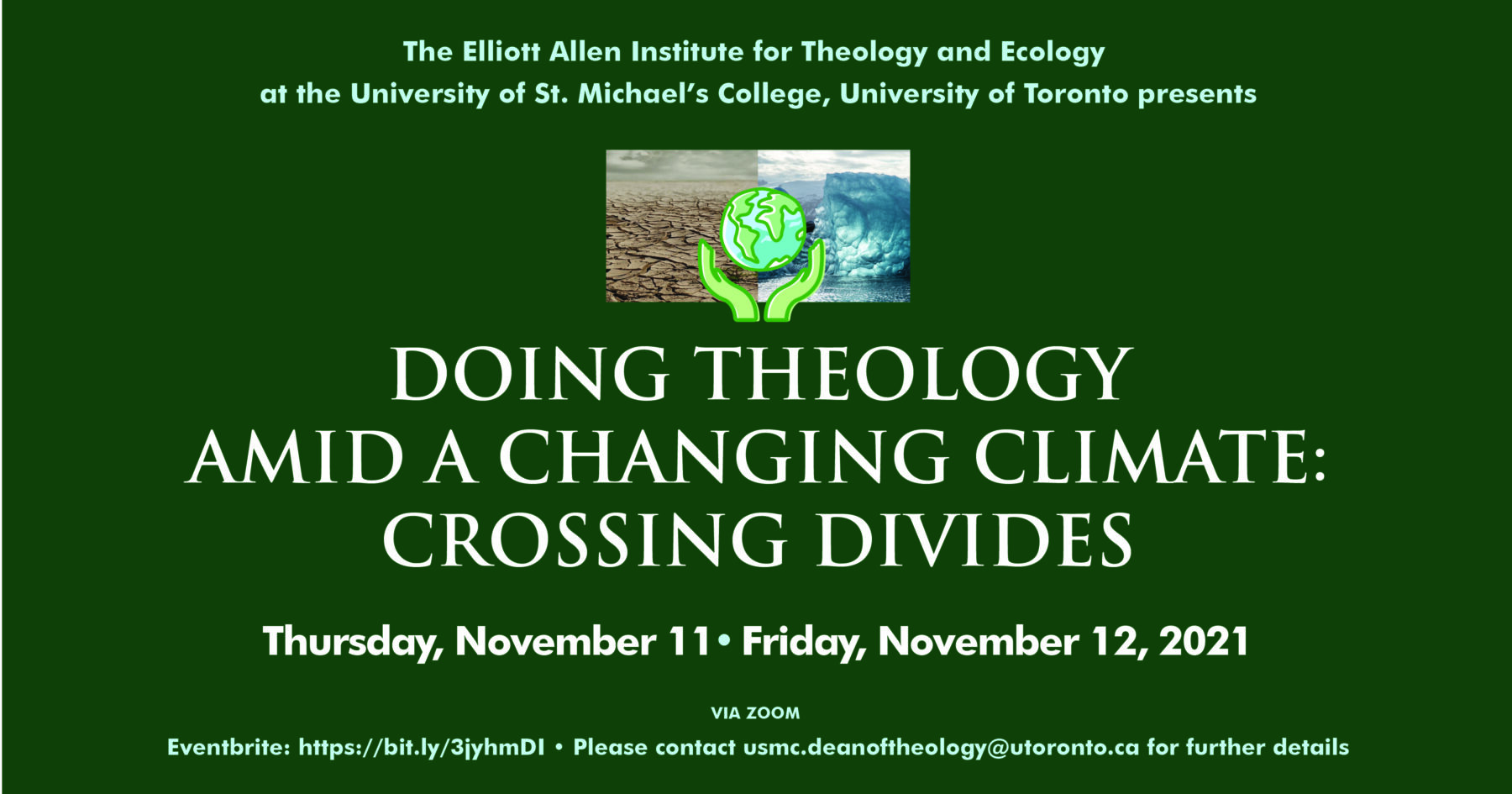
As world leaders gather at the COP 26 UN Climate Change Conference in Glasgow to implement the Paris climate agreement, the web-conference “Doing Theology Amid a Changing Climate: Crossing Divides” explores Christian theology’s contribution to the cultural, social, and spiritual transitions needed. Together with scientists and leaders from other faith traditions, Christian churches and communities have provided common witness on climate change. Yet because climate change is not simply an issue to be addressed but signals a need for a radical change in the way we inhabit a damaged planet, theologians and scientists discuss what more is required at this crucial geo-historical moment.
The speakers and panelists will ask how we can more effectively collaborate across disciplines and align our theology with cosmology and evolutionary science. How can we overcome divisions on climate science in a post-truth world? Which revelations of the sacred will nurture our interdependence with one another and the more than human world? And, as climate change further divides climate privileged and vulnerable communities along lines of race, gender, and ethnicity, how may theologians and community leaders work together to address questions of climate justice?
This conference is hosted by the Elliott Allen Institute for Theology and Ecology at the University of St. Michael’s College (Toronto), a leading interdisciplinary Institute for scholarship and dialogue rooted in the Catholic intellectual tradition.
Thursday, November 11
7–8:30 p.m.
A keynote speech delivered the night before by Franciscan Sr. Ilia Delio of Villanova University in Pennsylvania will set the scene for panel discussions of climate justice, gender justice, climate science and climate anxiety and the Church’s response. (The Catholic Register, Oct. 23, 2021)
Keynote: “Earth’s Fragility and the Crisis of Transcendence: Why Science and Religion Must be Reconciled”
Speaker: Dr. Ilia Delio, OSF Josephine C. Connelly Endowed Chair in Theology at Villanova University
Friday, November 12
Session 1: Climate Justice and Gender Justice: Addressing Inequities and Working across Difference (8:30 – 10:00 a.m.)
To many poor and minority communities, climate change means death and destruction on an ever-larger scale. Women and gender-diverse people are especially vulnerable. Speaking from various contexts and in solidarity with communities in both the global North and South this panel of renowned Catholic women theologians discusses these inequities and injustices with a focus on resource extraction and gender justice.
Session 2: Theology and Climate Science: Addressing Indifference, Fear, and Denial (10:15 – 11:30 a.m.)
To address climate change, theologians and climate scientists need to further engage in dialogue across disciplines. This panel explores the possibilities and challenges for this collaboration. How can climate science inform Christian theology? How can they both challenge religiously motivated climate change denialism? How can theology address fear and deep-seated anxiety about the consequences of climate change? What role do climate scientists see for the wisdom and power of religion and spirituality?
Session 3: Working across Ecclesial and Colonial Divides (11:45 a.m. – 13:15 p.m.)
Despite considerable ecumenical efforts towards a common witness, Christianity remains deeply divided on ethical issues, including climate change. Theologians representing various confessional and ecclesial traditions and communities address the challenges of ecumenical collaboration. Can Catholics come together with other Christians around the vision for climate justice and sustainability that Pope Francis unfolds in the encyclical Laudato si’? Can Christians from the global South and North work together to address issues of climate injustice amidst the enduring legacy of colonialism?
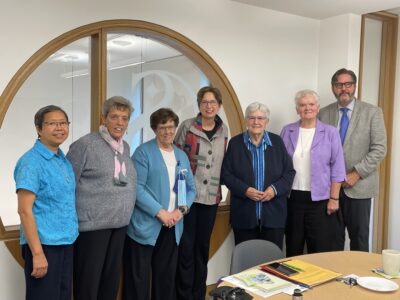
Dr. Hilda Koster, a professor of feminist theology and ecotheology, has been named the new holder of the Sisters of St. Joseph of Toronto Chair in Theology. Dr. Koster joined the University of St. Michael’s College’s Faculty of Theology in July 2020 and was appointed head of the Elliott Allen Institute for Theology and Ecology (EAITE) earlier this year.
“We welcome Dr. Hilda P. Koster to the Chair for 2022 onward and look forward to how her eco-feminist perspective will enrich theological studies for students and faculty,” says Sister Georgette Gregory, who is Congregational Leader for the Sisters of St. Joseph of Toronto.
Calling it “a great honour and pleasure” to be named Chair, Dr. Koster says she is grateful for the Sisters’ support for her work, and for that of the Faculty overall, noting that “this Chair reflects the Congregation’s longstanding commitment to theological education in feminist and ecological theology.
“The fact that this important Chair is now attached to the Faculty position in ecological theology offers important recognition of the leadership in the field of ecological theology that the Faculty of Theology, through the Elliott Allen Institute for Theology and Ecology, has provided for the past 30 years,” Dr. Koster says. “I look forward to a closer collaboration with the Sisters of St. Joseph of Toronto and hope to create opportunities for our students to learn from and get involved with the Congregation’s important eco-justice ministry and its advocacy work on clean drinking water.”
The Sisters of St. Joseph of Toronto established a Chair in Systematic Theology at St. Michael’s Faculty of Theology in 2007. Dr. Koster is the third person to hold the Chair, previously held by Dr. Margaret O’Gara and then Dr. James Ginther.
“We welcome this opportunity to support the Faculty of Theology, to commit to the advancement of theological education, and to honour the legacy of our Sisters at St. Michael’s College,” Sister Georgette says. “For 110 years we have contributed to St. Michael’s College as students and as educators in undergraduate and graduate studies. This includes opening St. Joseph’s College (1911 – 2006), a Catholic women’s college and residence. The Sisters and the University of St. Michael’s College will be forever linked by a shared dedication to Catholic education,” she says.
University President David Sylvester describes the Chair in Theology as yet another way the Sisters of St. Joseph of Toronto have offered invaluable service and inspiration to St. Michael’s.
“From teaching and administrative work to their mentoring and residence for students, the Sisters of St. Joseph of Toronto have shown extraordinary leadership at St. Mike’s for over a century,” he says.
“Dr. Koster’s work in ecotheology and feminist theology speaks to issues of critical importance to our world, echoing themes raised in papal documents such as Fratelli Tutti and Laudato si’. We are profoundly grateful for the Sisters’ support, which will help our students as they find ways to respond positively and productively to the concerns and challenges of the modern world,” he says.
Dr. Koster, whose courses this academic year include Our Common Home: The Origins, Theology and Implications of Laudato si’, will be hosting her first St. Michael’s conference in November. The online event, Doing Theology Amid a Changing Climate: Crossing Divides, takes place November 11 and 12 and includes keynote speaker Dr. Ilia Delio’s leture, “Earth’s Fragility and the Crisis of Transcendence: Why Science and Religion Must be Reconciled.”
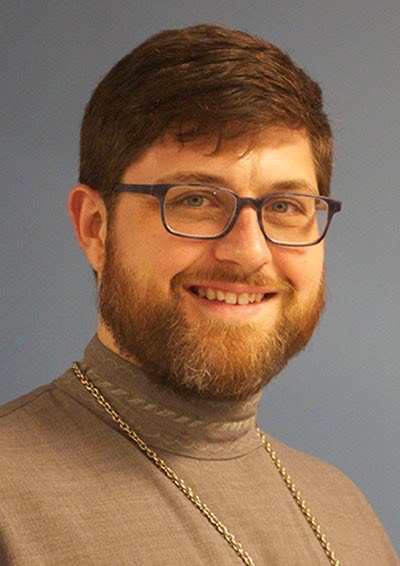
Father Andrew Summerson has joined St. Michael’s Faculty of Theology as Assistant Professor of Greek Patristics. Describing his work in Patristics as a vocation, Summerson says that, as a Byzantine Catholic priest and a scholar of the tradition, his goal is “to be a responsible interpreter for its members and for the scholarly and ecumenical community of theologians. As Eastern Catholics, our theological grammar is that of the Fathers. In order to be properly fluent in my own tradition, I went about learning their language.”
Summerson holds an S.Th.D. in Patristic Theology from the Pontifical Patristic Institute “Augustinianum” in Rome. His book, Divine Scripture and Human Emotion in Maximus the Confessor: Exegesis of the Human Heart, was published by Brill earlier this year.
His most recent teaching appointment was at Calumet College of St. Joseph, in Indiana.
“Andrew’s passion for, and dedication to, Patristics will serve our students well. We have pleased to have such a strong addition to the Faculty” says Interim Dean John L. McLaughlin.
“The University of St. Michael’s College has a proud history in its concern for historical studies while engaging the contemporary world,” says Summerson. I see my own work for St. Michael’s with the Metropolitan Andrey Sheptytsky Insititute of Eastern Christian Studies as aligned with St. Michael’s heritage: engaging the touchstones of the Eastern Christian past for the life of the world we live in today.”
In the fall semester, Summerson will teach History of Christianity I and Foundations to Eastern Ethics, while in the winter semester he will teach Contemporary Issues in Eastern Christian Moral Theology and The Three-Personed God: Eastern Christian Perspectives.
Early Christian texts aren’t meant to be sipped like wine; they must be chugged like beer,” he says. “I like to read primary sources with my students and treat them not like delicate artifacts, but living voices that speak true statements about God and the Church today.”
Summerson’s position is a Contractually Limited Term Appointment. The position, which is renewable twice to a maximum of three years, is held in conjunction with the Metropolitan Andrey Sheptytsky Institute of Eastern Christian Studies.
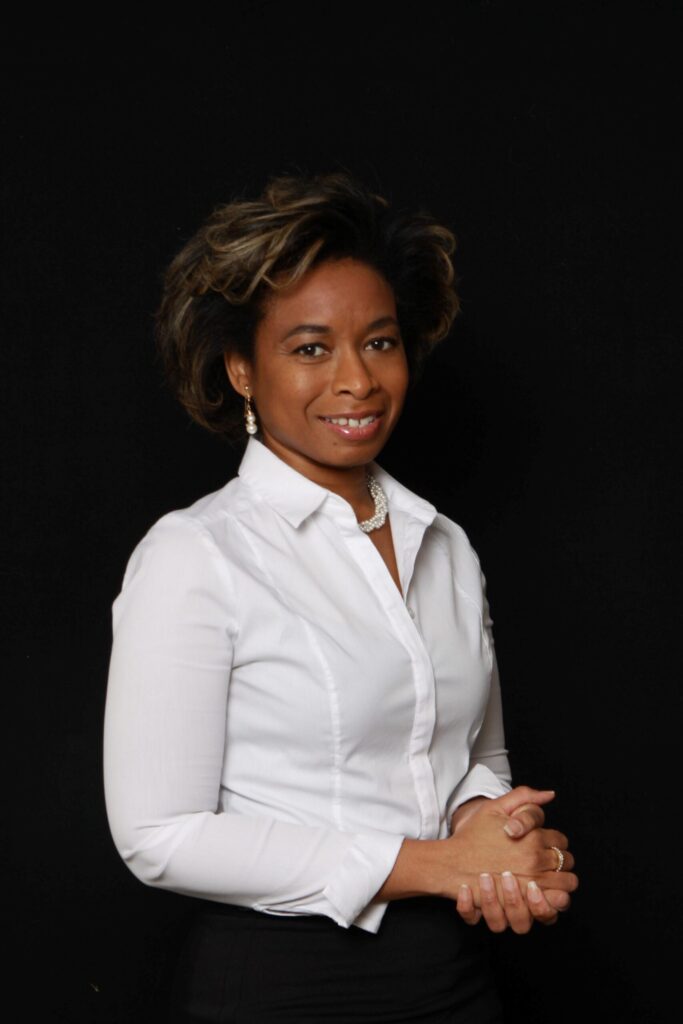
Theology students have the opportunity to enrol in an exciting new Faculty class: Black Lives Matter in the Classroom. The course, originally scheduled for last winter, was moved to the intersession, making it more accessible for our Master of Religious Education students, although this will be an offer of interest to students in various degrees across the Toronto School of Theology.
Black Lives Matter in the Classroom is a Basic Degree-level course to be taught by Dr. Marie Green. It will address how educators can become better aware of—and better able to respond to—systemic injustices facing Black students at school.
Many who see the course title Black Lives Matter in the Classroom may think of it as a unit coming out of OISE, but Dr. Green sees a strong theological underpinning to her course, and an equally strong justification for teaching it at a faculty of theology.
“In the eyes of God Black lives matter. We are all created in the image and likeness of God. The Black Lives Matter movement is, at its core, a human rights movement so it is absolutely possible—and necessary—to view this course through a theological lens.
“In this course we will challenge beliefs, assumptions, approaches, and biases,” says Dr. Green, who was awarded the Faculty’s 2020 Governor General’s Award. “Everyone has biases, and students will reflect on their impact on the classroom, and hopefully become motivated to be agents of change.”
Along with the usual readings and lectures, Green says classes will also feature guest speakers who can offer up tangible examples of equity and inclusive education. She says these examples will be particularly beneficial to those who do not have a lived experience of racism, or an understanding of the intergenerational harm of the legacy of slavery and other racist historical realities.
“We know that there’s a legacy of racism in Canada, and to deny that is to ignore the impact of residential schools, segregated schools, and more recently, streaming practices in public schools.”
The legacy, Green points out, manifests itself in many ways. Black students continue to be underrepresented in post-secondary institutions, for example, while also experiencing a significantly higher rate of suspensions in high school. At the same time, many Black high school students find themselves discouraged by teachers and administrators from pursuing more academic streams, limiting their future opportunities.
“We have seen violence against Black bodies so overtly displayed on our streets in recent times,” Green says, “but there is a different kind of violence taking place in our schools and classrooms. It is the violence of low expectations, lack of validation, and lack of cultural affirmation. This course will equip educators and other practitioners with resources to help them apply the critical theory perspective needed to support Black student success.”
With a topic so clearly in the public eye following a year of protests, Dr. Green expects difficult but constructive conversations where everyone has something to contribute and something to learn. “One of the benefits of teaching online,” she says, “is the ability to use Zoom breakout rooms, allowing students to have meaningful and engaging discussions, with the instructor able to visit all groups.
“I want to share tangible tools that all participants can use to address topics of equity and justice,” she says, “which is absolutely critical for student success.”
SMP3416: Black Lives Matter in the Classroom will run Tuesdays and Thursdays from 18:00–21:00, beginning July 13 and ending August 5.
Christine Way Skinner has been a lay minister for thirty years, a mom for almost that long and a partner to Michael for longer. She is the author of books for both adults and children and, for the next few years, will be a St. Mike’s doctoral student.
A Fork in the Road

What do you do when you are in the middle of a pandemic, you are a few years from retirement and your parish ministry job of twenty-two years is eliminated? Well, let a few tears fall. You rage a little bit. Then you sign up to do a doctorate in theology. Perhaps it might not be what everyone does…but it is what I did.
St. Ignatius of Loyola has been my lifelong guide to discernment. Do you feel a sense of consolation in your decision? It is from God. A sense of desolation? Look for another direction. I had begun a doctorate many years ago, before I had children and before I began parish ministry. The immediacy of mothering and ministry always took precedence over writing and so, after a decade, I withdrew from the program. I was grateful for the education I had received while in that doctoral program and used it extensively in parish ministry. It allowed me to provide adult religious education that nourished the faith of parishioners who wanted to think deeply and broadly about their faith. It supported me in developing religious education programs for children that were not only engaging but sophisticated. The time spend studying at that level had not been wasted.
The longing to learn, to think, to question, to explore, and to challenge my perspectives persistently coursed through my veins throughout the years. I fed it by attending academic conferences and reading voraciously. It seemed enough. For a time. But about 10 years ago, I found myself visiting university websites and began printing off application forms for various doctoral programs. A Doctorate in Ministry seemed the most appropriate as I couldn’t contemplate leaving parish ministry. A D.Min. would spare me the burden of choosing one over another. The printed forms always remained in my “inbox” – uncompleted – until another year passed and they would be recycled and replaced by new versions.
Then, in 2020, my life took a radical turn. I knew immediately the opportunity that was before me. As my youngest son filled out his applications for post-secondary education, I filled out my application for post-post-post secondary education. The bulk of my immediate mothering responsibilities behind me and the ever-expanding tasks of my beloved ministry suddenly part of my history, I was free to surrender to that persistent longing. And so, after many years, I actually filled out an application. I connected with professors from a lifetime ago and collected transcripts of courses that I barely remembered taking—and some that I had relied on daily. I spoke to new professors and thought deeply about which of the many possible directions my study might take. In February, just days after my 55th birthday, I was accepted into the PhD program at St. Michael’s College for the fall of 2021.
It has been a radically different experience contemplating doctoral studies at the age of 55 from the experience when I was 23. I approach it, paradoxically, with a great deal more humility and a great deal more confidence. When I was younger, I was painfully aware of how much I didn’t know. But I was afraid of my ignorance being exposed. This, I no longer fear. At 55, I remain conscious of how much I still do not know. Indeed, I am mindful that I will die having learned but the smallest fraction of what there is to know about the world. And, as student of theology, an even smaller fraction of what there is to understand about the Mystery of God. At 55, I also recognize that I have lived enough days to have gleaned a drop or two of wisdom and that it is my responsibility to contribute those drops in the vast ocean that is human thought. It excites me to know that this is the human condition. Each of us has something beautiful, wise and true to teach. Each of us has even more beautiful, wise and true things to learn.
It is liberating to begin studies at this age. I now know that not one of my papers will be the last word on any topic. I will be able to write them with a certain freedom from obsession because of that. I now know that we can only learn by admitting what we do not know. There is a freedom in that, too. I am privileged to have raised my children, bought my home and need very few material possessions. So, more freedom – to focus on study without the burden of working long hours to ensure a sustainable future (although I will certainly need to work some).
As a gift, I embrace this opportunity – denied, I recognize – to many but offered, surprisingly and grace-fully to me. I study, therefore, for the greater glory of God and for the service of God’s people. For this, I live in gratitude.
Read other InsightOut posts.
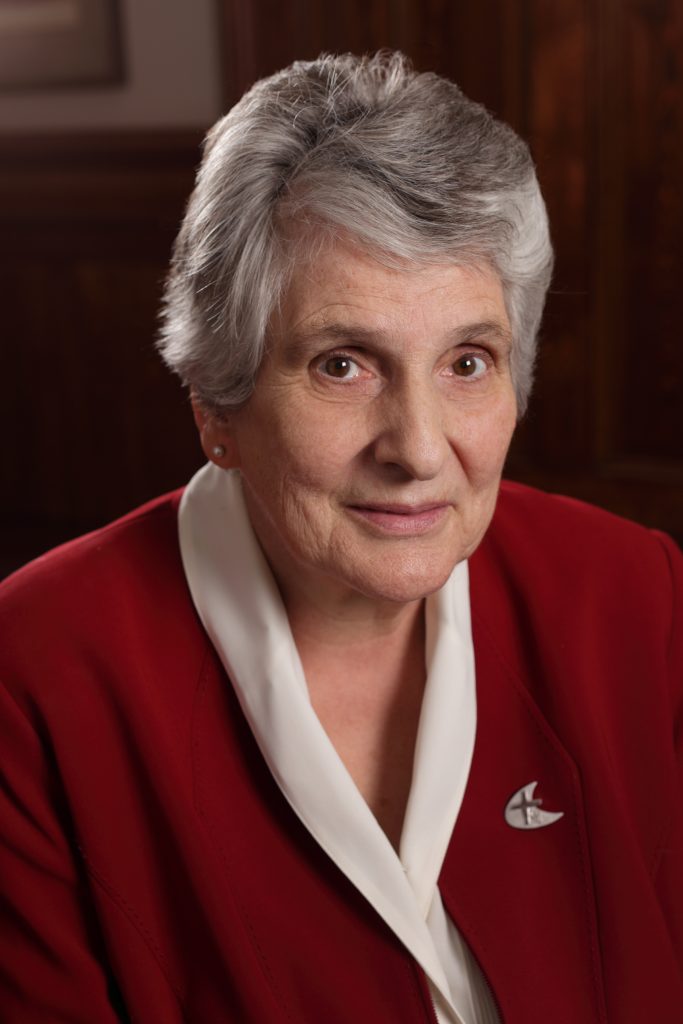
The University of St. Michael’s College offers heartfelt congratulations to Sr. Anne Anderson, C.S.J., on being named this year’s recipient of the Lifetime Achievement Award from the Catholic Health Alliance of Canada.
“Sr. Anne’s dedication and contributions to both health care and higher education in Ontario have been boundless,” says University President David Sylvester. “She has brought the same passion to health care that she has provided to St. Michael’s in her lengthy career here. We remain grateful for her insights and energy.”
Chair of the St. Joseph Health System Board of Directors, Sister Anne has been a past President of the Catholic Health Association of Ontario and member of the Board of Directors of the Catholic Health Association of Canada.
She was appointed President and Vice Chancellor of the University of St. Michael’s College in Toronto in January 2009, having previously served there as Interim President as of July 2008, in addition to her duties as the Dean of the Faculty of Theology. Sister Anne has been a member of the Sisters of St. Joseph of Hamilton since 1958, and served the Congregation as General Councillor and General Treasurer from 1999-2009.
The Lifetime Achievement award was made at the CHAS annual conference, taking place virtually May 6 and 7. The alliance states that “Catholic Health Care in Canada has been blessed with a legacy of faithful leaders whose dedication throughout their careers has built the ministry and ultimately brought healing to persons and communities.”
Sr. Anne, it notes, it notes, is one such leader, a person who has “inspired and mentored numerous others in Catholic health care and whose accomplishments, over the course of a career, have strengthened the ministry.”
“Whether it’s encouraging and supporting students or safeguarding—and advocating for—patient-focussed healthcare, Sr. Anne is a powerful ally. This honour is well deserved,” says Faculty of Theology Interim Dean John L. McLaughlin.
The Regis-USMC Steering Committee has received all sub-committee reports. The reports represent an enormous amount of hard work, and have contributed to significant progress toward our objectives. The Steering Committee has struck a drafting committee to prepare a report that will be presented to both the St. Michael’s College Collegium and the Regis College Governing Council in mid-June 2021.
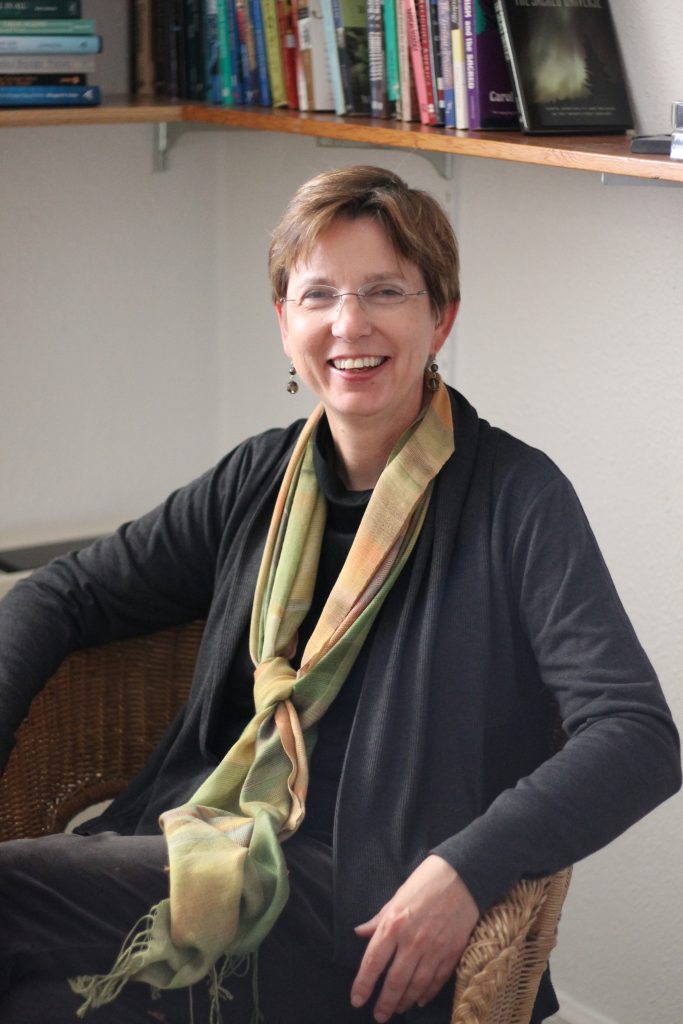
The new director of the Elliott Allen Institute for Theology and Ecology, Dr. Hilda Koster, sees the EAITE moving forward in the spirit of Laudato Si’, with particular attention to the needs and concerns of women, minorities and Indigenous communities.
The Institute, celebrating its 30th anniversary this year, was created by Fr. Stephen Dunn to address growing interest in the intersection between faith and the natural world.
“It is a great honour to be appointed Director of the Elliott Allen Institute, which has played such a prominent role in the development of ecological theology in Canada, especially by way of its sustained attention for the work of the visionary theologian Thomas Berry,” says Dr. Koster. “I am very grateful for the important work of the Institute’s founder Fr. Stephen Dunn, C.P., and his successor Dr. Dennis O’Hara. It is a privilege to carry their legacy forward.”
Strong leadership of the EAITE reflects the university’s core values expressed in St. Michael’s 180 strategic plan, says University President Dr. David Sylvester.
“We place great importance on our mandate to promote respectful dialogue on care for each other and for our common home. The work of the Institute helps to further St. Michael’s core values, and Dr. Koster will be an invaluable addition,” Dr. Sylvester says.
The Faculty of Theology is especially pleased to have found someone so well equipped to run a centre known around the world for its groundbreaking research and training, says Interim Dean Dr. John L. McLaughlin.
“Dr. Koster’s appointment as Director of the Elliot Allen Institute is good news not only for St. Michael’s but for anyone who cares about ecological theology as well as environmental and social justice,” Dr. McLaughlin says. “Since the EAITE was founded by Fr. Stephen Dunn in 1991 it has been shining a light on the kinds of issues Pope Francis addressed in his 2015 encyclical Laudato Si’: to recover our relationship with the natural world while also working for environmental justice.”
The need to examine ecological concerns in a theological light has never been greater, Dr. Koster says.
“Historically Christianity has not paid much attention to humanity’s relationship to the natural world but in light of climate change, overconsumption and species extinction this has become an essential area of theological reflection,” she says.
“Studying Theology and Ecology allows students to make connections between their faith traditions with knowledge of and appreciation for the more-than-human world. Yet ecotheology also will allow students to think deep and hard about the spiritual and moral challenges that result from our human caused destruction of precious ecosystems, and the suffering this is causing to vulnerable human communities.
“The Elliott Allen Institute therefore takes its lead from Pope Francis’ insight that ‘a true ecological approach always becomes a social approach; it must integrate questions of justice in debates on the environment, so as to hear both the cry of the earth and the cry of the poor (Laudato Si’, 49)’. We need educators, chaplains, social workers and scholars who have the competency to work with others to realize a more just and sustainable future for all, especially the poor.”
Born in the Netherlands, Dr. Koster received her Bachelor of Arts and Master of Divinity degrees from the University of Groningen. After further study at Princeton Theological Seminary and the Candler School of Theology at Emory University in Atlanta, she earned her doctorate at the University of Chicago. She joined St. Michael’s Faculty of Theology in July 2020, with teaching areas of ecotheology, feminist theology, and ethics. She assumes the directorship of the EAITE on July 1, 2021.
Describing the new Director as a “wonderful addition” to the Faculty, Rosemary Boissonneau, Dr. Koster’s research assistant, says Dr. Koster “challenges her students to look deeper and investigate theologically the conceptual frameworks and structures of domination underlying the socio-ecological crises of our times. I am confident that under her directorship, the Elliott Allen Institute for Theology and Ecology will be reinvigorated to continue its legacy as a vital centre of ecotheological learning and research.”
The EAITE is a collaborative teaching and research institute which offers a certificate of specialization in Theology and Ecology, as well as stand-alone Graduate Diploma in Theology and Ecology. Its interdisciplinary, collaborative nature brings a range of academic voices from the sciences and humanities into conversation on matters of the day.
The 10-course diploma is aimed at professionals and students who wish to integrate the study of environmental issues and theology in their professional careers, as well as for those who wish to study the theological and ethical dimension of environmental problems. It includes five foundational courses, one in-depth course, two ecology and theology-specifics courses, one experiential course, and one capstone course.
The newly revised certificate is open to anyone enrolled in any of the graduate programs at the Toronto School of Theology seeking to specialize in Theology and Ecology. Certificate requirements vary depending on the program being completed.
“The Elliott Allen Institute will continue to be a place for innovative theological education and scholarship, with attention to the voices of women, minorities and Indigenous communities,” says Dr. Koster.
For more information on the Elliott Allen Institute’s offerings, please contact Programs Coordinator Anthony De Feo or Dr. Koster directly.
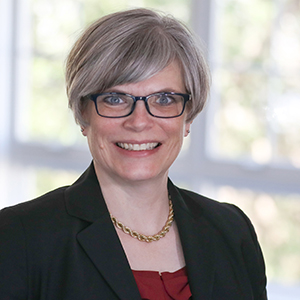
The University of St. Michael’s College is celebrating the appointment of Dr. Cynthia Cameron to the Patrick and Barbara Keenan Chair in Religious Education as a crucial step in renewing the vital relationship the University has with Catholic educators.
“The appointment of Dr. Cameron embodies St. Mike’s commitment to honour and build upon these historic partnerships in Catholic education through teaching and research, serving teachers and administrators not only here in Toronto but also across the province and, indeed, the country,” says University President Dr. David Sylvester.
Cameron, who has a special interest in the development of Catholic adolescents and the impact of ministry in schools, is currently an assistant professor of Religious Studies at Rivier University in New Hampshire. She will join St. Michael’s Faculty of Theology on July 1, 2021. She has also taught at Boston College, Loyola University New Orleans and Sacred Heart University in Connecticut.
“I am delighted to be joining St. Michael’s because it is an extraordinary opportunity to work in a world-class faculty and to think theologically about Catholic education with colleagues and students who are as passionate about it as I am,” says Cameron, who earned her doctorate in Theology and Education from Boston College. “It is also an honour to be the next Keenan Chair and to be a part of important conversations about Catholic religious education in Ontario.”
Cameron’s research focuses primarily on the intersection of Catholic theological anthropology and questions of age—and particularly in regard to adolescents. Her work responds to the question of how age affects the ways we think about what it means to be human.
The question is of particular importance to how ministry is carried out in the Church, and especially in school settings with adolescents, she says.
“My current project involves bringing one age and gender—female adolescence— into conversation with both theological anthropology and developmental psychology in order to think about the mission of all-girls’ Catholic high schools. In it, I suggest that the all-girls’ Catholic high school is a particular place where adolescent girls can fully flourish in a culture that often marginalizes and even damages them,” she says.
Cameron’s research and specialization will be of particular interest to the many Master of Religious Education (MRE) students studying at St. Michael’s who work at the high school level, says the Faculty’s Interim Dean, John L. McLaughlin.
“We are delighted to have Dr. Cameron join the Faculty,” McLaughlin says. “A key component of our institutional mission as a Faculty is to provide educators with a strong theological base to help their students take on life’s big questions. Dr. Cameron’s area of expertise will offer our MRE students invaluable insight and direction.”
Cameron will teach courses within the MRE program, including the Philosophy of Catholic Education, Faith Development Across the Lifespan, and Religious Education in Multifaith Contexts, as well as courses for the MTS and MDiv programs. She will also teach and supervise graduate students through the Graduate Centre in the Toronto School of Theology.
The Keenan Chair was established in 2002 thanks to the generosity of Patrick and Barbara Keenan , launching a major graduate teaching initiative in religious education in Canada’s largest English-speaking Catholic university. Each spring, the University also hosts the Patrick and Barbara Keenan Lecture.
St. Michael’s is a Roman Catholic Faculty of Theology in the Toronto School of Theology, an ecumenical federation of seven theological schools affiliated with the University of Toronto. The Faculty is committed to theological teaching and research that is interdisciplinary, ecumenical and sensitive to multi-faith and multicultural contexts. We seek to form students for service in Church and society through faithful and rigorous scholarship grounded in the Catholic intellectual tradition.
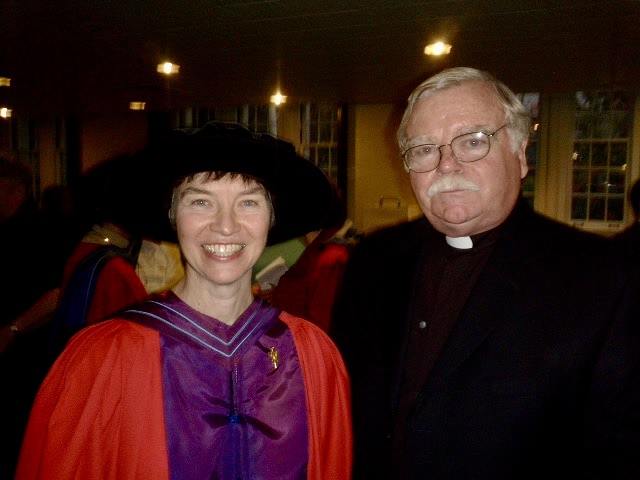
Michael Fahey, S.J. pictured with the late Dr. Margaret O’Gara
The University of St. Michael’s College is mourning the death of former Faculty of Theology Dean Michael Fahey, S.J., a man described as a perceptive theologian, an astute mentor and an exemplary leader and administrator.
Fr. Fahey died Friday in Massachusetts.
“I was saddened to hear of the passing of Michael Fahey, and I offer my condolences to his family and to his religious family, the Society of Jesus,” said Interim Dean John L. McLaughlin. “As an MDiv and then PhD student during his two terms as Dean I experienced firsthand his exemplary leadership. He was tireless in promoting the faculty and students.”
Dr. Anne Anderson, CSJ, former president of the University of St. Michael’s and herself a former dean of the Faculty, concurred.
“Dean Fahey left an indelible legacy at USMC. He was enormously proud of the Faculty of Theology and its scholarship,” she said. “He was also an astute mentor for many students, quietly requiring excellence, while he made connections and opened doors that launched many talented young theologians into to the world of academe. His perceptive analyses of theological perspectives will be missed both locally and internationally.”
Dr. Michael Attridge, who teaches systematics at the Faculty, recalled his first encounter, in 1992, with Fahey. Attridge was in the Elliott Allen Lounge when Fahey approached and introduced himself. The following week, Fahey asked if Attridge would like to do some research work for him.
“He was working on a paper on the post-synodal apostolic exhortation “Christifideles laici” and wanted me to generate a bibliography. Over the next several months, I did so, meeting with him weekly,” Attridge remembered. “He taught me how to search the library catalogue, to think about keywords and also to look for those words in other research languages… He taught me to go to the shelf in the library and look at the books around the volume I was interested in to see what else was there. He showed me the importance of studying the footnotes and bibliography to see what other works might be useful. And finally, he taught me how to use non-traditional indices like the Ephemerides Theologicae Lovanienses. At the end of the four-month project, I produced a bibliography of 200–250 entries. He then asked me to redo it as an annotated bibliography and showed me how to do that. I realized then that I was not doing the bibliography primarily for him, but he was showing me how to do research.”
Fahey then supervised Attridge’s MA thesis on the Eucharist in Anglican Roman Catholic Dialogue and served as a reader on Attridge’s doctoral dissertation.
Fahey, who made major contributions to the study of the theology of the Eastern Church, and to the ecumenical dialogues between the Roman Catholic Church and the Orthodox and Anglican churches, was also known for his kindness, and his care of students was legendary.
“At conferences, doctoral students (not just his own) often found themselves being introduced and their academic abilities extolled to senior scholars, even if we didn’t realize until later the professional stature of some of those people,” McLaughlin recalled. “At the same time, he offered annual workshops back ‘home’ on what initially seemed mundane matters, such as how to organize your first CV or what to do and what not to do at a ‘job dinner’; once again, it was only later that we realized how important these little things would be as we entered into the job market.
“I regularly heard from my fellow students about his attention to their progress through the doctoral program, providing careful and detailed feedback on their work in progress, preparing them for their dissertation defence, and providing glowing recommendations as they applied for various positions. Even after he left us for Marquette University, he continued to be involved with St. Michael’s, serving as an external examiner for doctoral defences, cheerfully offering advice to faculty and students, and always quick to respond to any request for help. He did all this while maintaining his own high academic profile, through his many publications, conference presentations, invited lectures and as editor of Theological Studies.”
As General Editor at Theological Studies, he was known for helping young theologians develop their thoughts and their writing style.
“He took great care with those who submitted articles for consideration and was proud of the fact that even the ones who were rejected, thanked him. He loved to tell the story of one person who wrote: ‘Thank you. That’s the nicest rejection letter I’ve ever received,’” Attridge said.
Fahey led a full and fascinating life. A graduate of Boston College and of the University of Louvain, he held a master’s degree in Romance languages from Fordham University, a licentiate from Weston School of Theology in Cambridge, Mass., and a doctorate in Theology from the University of Tübingen. He was talented cook, an accomplished linguist and a dedicated traveller.
In a June 2005 editorial in Theological Studies, Fahey recounted studying systematic theology in the late 1960s with Professor Joseph Ratzinger (later Pope Benedict XVI) at Tübingen. (Fahey also studied with Hans Küng.)
“In the ensuing years when I would meet Ratzinger, whether in Rome, Toronto, or elsewhere, I would remind him of the earlier Tübingen days,” Fahey wrote. “He would inevitably respond something like: ‘Ja, ja, das war lange her!’ which I took to mean: ‘a lot of water has flown over the dam since then!’”
At one point, famed Canadian Jesuit theologian Bernard Lonergan lived in the same residence and Fahey would speak about Lonergan pacing the halls of the residence, muttering to himself, “It’s all there. I know it’s all there,” Attridge said.
He was awarded an honorary Doctorate of Divinity from St. Michael’s College in 2005.
In 2006, Dr. Attridge and Dr. Jerry Skira of Regis College published a festschrift in honour of Prof. Fahey entitled In God’s Hands: Essays on the Church & Ecumenism in Honour of Michael A. Fahey, S.J.
“Prof. Fahey’s legacy continues to carry great weight at St. Michael’s, both for the measure of his scholarship and for his care for his students. We offer the Jesuits our deepest condolences,” St. Michael’s President David Sylvester said
The Faculty of Theology liturgy of Wednesday, March 24 at 1:30 p.m., will be offered for Fr. Fahey. A Zoom link will be available via inquiry@usmctheology.utoronto.ca.
“With the passing of Michael Fahey, the Church and the Academy have lost a leading scholar, and St. Michael’s has lost a good friend,” McLaughlin said. “May he rest in peace and may his memory be a blessing.”
Fr. Alexander M. Laschuk, PhD has been appointed to a three-year term as Executive Director of the Metropolitan Andrey Sheptytsky Institute of Eastern Christian Studies (MASI). His appointment follows a yearlong appointment as interim director that saw the institute shift its instruction and lecture offerings into an online context while emphasizing collaboration with other institutions.
“In the past eight months as Interim Executive Director, Fr. Laschuk has enhanced the position of the Sheptytsky Institute as an autonomous academic unit of the Faculty of Theology,” said Dr. John L. McLaughlin, Interim Dean of the Faculty of Theology at St. Michael’s. “His willingness to continue providing this outstanding leadership at MASI holds great promise for the Sheptytsky Institute’s ongoing development as a centre of academic excellence in Eastern Christian Studies.”
Fr. Laschuk has civil and ecclesiastical doctorates in canon law from Saint Paul University and the University of Ottawa. His research interests include ecclesiology, penal law, and procedural law and he regularly publishes in these areas in addition to canonical consultancy and advocacy work with dioceses and clients across North America. He has taught regularly with the Sheptytsky Institute since 2010.
During Fr. Laschuk’s term as interim director over the past academic year, the Sheptytsky Institute has both shifted its instruction to remote delivery to accommodate pandemic restrictions and introduced multiple new lecture series to expand its offerings to the larger community. In addition to monthly series focused on hospital ministry during COVID and on campus ministry, MASI has launched a Friday Lenten lecture series on the Church Fathers. Presented by scholars from a variety of institutions, the Lenten series was specifically designed to support the needs of priests, 75 of whom are registered for the course.
“We see a need to provide continuing education in an accessible manner to clergy,” Fr. Laschuk says of the initiative, adding that the Ukrainian Eparchy of Toronto has encouraged the institute in this direction.
The shift to a predominantly online context as a result of the pandemic has also made new kinds of collaboration possible between MASI and other institutions. Seminarians in the past year have joined MASI courses from places as far away as England and Edmonton as a result of these connections.
Going into the future, Fr. Laschuk sees MASI as having a unique role to play in the life of the University. “St. Mike’s is a top-tier Catholic university, and we want to be comprehensive in our presentation of the Catholic faith, including attention to the Catholic East,” he says. Graduates of the St. Michael’s Faculty of Theology are bound for contexts in which they will encounter and work with Eastern Christians, and he considers it essential for those grads to understand the essentials of their faith and traditions.
This preparation goes beyond the classroom, as MASI has always emphasized the liturgies and practices that define the life of Eastern Christian communities. “Our chapel is open to anyone who wants to come, and can provide an experience in Eastern Christianity for anyone who attends,” Fr. Laschuk says.
Norm Tanck, CSB is the Associate Pastor of St. Basil’s Parish. He entered the Basilian Novitiate in Erindale, ON in 1967 and made his first profession of vows in 1967. He received his M.Div. from USMC in 1973 and was ordained a priest in 1974. Norm served as St. Mike’s Director of Campus Ministry and College Chaplain from 1982 to 1985.
A Different Kind of Lent
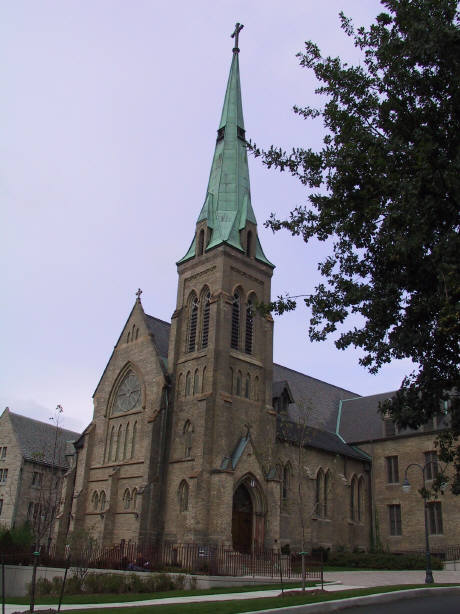
As I write this, I do not know what Ash Wednesday and Lent will look and feel like this year. St. Basil’s Parish has plans for when and how ashes will be distributed. We will have short continuous services during the day. If you are on campus, you can check St. Basil’s Parish website to see how you can register for a time to receive ashes (Information for Ash Wednesday). The way we receive them this year will be different. If you can come in person, they will not be smeared on your forehead as in the past, but sprinkled on the top of your head, as they do in Rome.
Every year in the past St. Basil’s Church would have overflow crowds of people coming to receive blessed ashes on their foreheads. Parishioners, members of the USMC community, local residents, government workers, businesspeople and shoppers would leave the church and go into the world around them bearing the Cross of Jesus Christ for all to see.
There may have been a sense of solidarity in the church, but on Bay Street, in Eataly, in the MacDonald Block, or Robarts Library, I imagine one could feel conspicuous, self-conscious, even vulnerable. Some, however, may have felt proud to profess their faith in such a public way.
There may be a sense of relief this Ash Wednesday that we might not have to face the stares and quizzical looks, maybe even the ridicule of others. We may not even have to face the challenge to look at our lives and assess what needs to change for us to live a good life in relationship to God, others, the rest of creation, and ourselves.
This kind of self-focus, self-assessment and call to personal conversion, transformation, and change is only part of what Ash Wednesday and Lent is about. Often, we forget or maybe ignore the call the is given to us, to the Church.
The first reading for our Ash Wednesday liturgy tells us: “…call a solemn assembly; gather the people. Sanctify the congregation; assemble the aged; gather the children, even infants at the breast” (Joel 2:15-16a). The people, a corporate reality, is called to change. The Lenten call to repentance is a call to the Church herself to change, and a warning to humanity that the path it is on will result in ruin. The prophet Joel uses the image of a famine to portray a people, a nation, in crisis. Joel is not one of the happiest books in the Bible. But I think he is a relevant prophet for us today.
Walter Bruggeman, a Scripture scholar who specialized in the Psalms and the Prophets, said that a prophet has three functions. The first is to announce that the old order is ended—not that it is going to end but that it is already over. The second function is to let the people sing their songs of lamentation, to grieve their loss. The third is to give the people a new hopeful and energizing vision for the future.
This year, as I reflect on what Ash Wednesday may mean as we begin the second year of our pandemic crisis, I am struck by this corporate call to repentance and change. It is a call that is given to the Church so that like Joel we can become a prophetic witness to the world. COVID-19, like Joel’s agricultural crisis, is emblematic of the cumulative issues and many crises that threaten the common good of the human family and of all of creation.
In his latest book reflecting on our present COVID-19 crisis, Pope Francis says, “Every now and then, however, great calamities awaken the memory of (our) original liberation and unity. Prophets who sought to recall the people to what really matters, to its first love, suddenly find eager audience. Times of tribulation offer the possibility that what oppresses the people – both internally and externally – can be overthrown, and a new age of freedom begin… Crisis has shown that our people are not subject to blind forces but in adversity are capable of acting” (Pope Francis, Let Us Dream: The Path to a Better Future. New York, Simon & Schuster).
The Pope uses a familiar model to reflect on the issues and respond effectively. We begin by seeing what is going on, being attentive to the situation. Then we must discern what needs to be done and choose a plan of action. And finally, we must do it.
This model is good for our personal Lenten discipline and conversion, but this year, it comes as a special challenge for the Church and our prophetic witness. What do we have to announce? How do we let go of the past? And what is our hope for the future, not only for ourselves but for the world in which we live?
Pope Francis in the epilogue of his recent book writes, “A crisis forces you (us) to move, but one can move without going anywhere. In lockdown many of us left the house for essentials or walk around the block to stretch our legs. But then when we get back to where we were and what we were before, like a tourist who goes to the sea or the mountains for a week of relaxation, but then returns to her suffocating routine. She has moved, but sideways, only to come back to where she started”.
He goes on to say, “I prefer the contrasting image of the pilgrim, who is one who decenters and so can transcend. She goes out from herself, opens herself to a new horizon, and when she comes home, she is no longer the same, and her home won’t be the same… This is a time for pilgrimages”.
This is a time for us to look, choose, and act.
Read other InsightOut posts.
Not even a pandemic can stop Christmas from coming to St. Mike’s.
While the campus is quiet and missing many of the traditional seasonal activities this year—the alumni Christmas tea and the Schola Cantorum Advent concert are two notable, sorely missed examples—our gorgeous Christmas lights will still illuminate the grounds to bring cheer both to those students in residence as well as to neighbours and passersby.
To ensure that help gets to those in need, the annual toy drive, which sees St. Michael’s team up with the University of Toronto campus police and the Society of St. Vincent de Paul, is accepting donations online to buy gift cards for families so that parents can pick out the perfect items for their loved ones. Donations of gift cards are also being accepted at the security desk in Charbonnel Hall at 81 St. Mary St. Donations are being accepted up until Friday, December 4.
And in this season of giving, the University has been particularly touched by the generosity of the creative minds who came up with a way to compensate for the fact the annual golf tournament fundraiser was COVID-cancelled. Two golf tournament sponsors—Mackenzie Financial and CIBC, who are represented by event co-chairs Barry McInerney and David Scandiffio—made donations of $10,000 each this year instead of sponsorships. USMC matched these donations with proceeds from previous years’ tournaments to create a $40,000 expendable fund, allocated care of the Registrar’s office, to help students with exceptional needs related to COVID.
This approach parallels the Faculty of Theology fund created earlier this year, which was built from donations and matched by St. Michael’s. Together, these gifts represent the continued loyalty of golf tournament sponsors and the commitment of alumni, faculty, staff and the university to helping students during this challenging time.
At a time when food banks and social service agencies are seeing soaring demand, the generosity is being spread widely. Another golf tournament sponsor, Mawer, donated $5,000 in lieu of sponsorsip. This, too, was matched with donations from previous years and augmented by other alumni gifts, creating a gift of $12,500 to support the Out of the Cold program at St. Basil’s Church.
While an Advent Vespers service followed by dinner is one of the highlights of the Faculty of Theology’s social calendar, Vespers will be observed online this December, with a social gathering to follow. And since there’ll be no dinner cheque for the SLC to pick up this year, they’re offering a great incentive to partygoers, promising to make a $15 donation to the Into the Cold program for each person who attends the online party.
The undergrads also have online fun planned, with a Winter Festival from Dec. 4 to 6 featuring decorating Christmas ornaments with the commuter dons, a Kelly’s Corner, and a family dinner all lined up.
And while most of us will find this a quieter, slower-paced Advent season, without the usual trips to the mall or holiday parties, there is no doubt we could all use some peace. With that in mind, St. Basil’s is hoping to open the church for prayer from 7:30 to 8:30 a.m. and 12 to 1 p.m. Monday to Friday, 5 to 6 p.m. Saturdays, and 12 to 1 p.m. and 4:30 to 5:30 p.m. on Sundays. Capacity when the church is open is restricted to 10 people. During these prayer times, a priest is usually available to hear confessions, except for the 7:30 to 8:30 a.m. time periods.
COVID-19 may have changed this holiday season, but the heart of St. Mike’s just continues to grow.
“The whole is greater than the part, but it is also greater than the sum of its parts.” (Pope Francis, encyclical Fratelli Tutti (3 October 2020), # 145.
We write to inform our communities that representatives of the Board of Regis College, and the Collegium of the University of St. Michael’s College, have met recently to explore a mutual desire to renew long-standing discussions regarding a closer institutional relationship between the two Catholic institutions.
We are pleased to report that these very fruitful meetings have led to the establishment of a Steering Committee that will oversee, on behalf of the two governing bodies, the formulation of an alliance between Regis and St. Michael’s. The work of the Regis-USMC Steering Committee and its anticipated sub-committees, and the deliberations of the respective governing bodies, will be guided by the following shared principles:
- The commitment to forge a world-class centre of excellence in Catholic theological study whose mission is to promote teaching, research, and formation to serve the needs of the Church and society, here in Canada and globally;
- The commitment to consult all stakeholders (including the administration, the faculty, staff, students and alumni/ae, of each institution, as well as the sponsoring religious orders/ congregations). The continuation and cultivation of a cordial relationship with the Archdiocese, while keeping the Cardinal informed of plans and on-going developments;
- The commitment to orient governance of Regis and St. Michael’s to a deepening union for the sake of enhancement of their mission.

David Sylvester, PhD
President and Vice-Chancellor
University of St. Michael’s College

Thomas Worcester, S.J., PhD
President
Regis College
Theologian Karl Barth famously advised younger colleagues to base their work on both the Bible and the newspaper. Now, two new courses offered by the Faculty of Theology at the University of St. Michael’s College are doing just that, reflecting theologically on the evils of racism and clerical sexual abuse, topics that regularly make front-page news.
Theology of Radical Evil and Suffering will look at the experience and testimony of Jewish, African American and Indigenous individuals and communities who experienced extreme evil and suffering at the hands of those reclaiming what they understood to be their Christian faith, values and way of life.
(Sexual) Abuse and the Catholic Church, in turn, aims to explore how the present sexual abuse crisis informs—and proposes the need to reform—the understanding of the church as body of Christ.
“These are very challenging—and very necessary—courses,” says Interim Dean John L. McLaughlin. “We are educating people who will be helping to find the answers to society’s ills. They need to understand root causes and be able to recognize systemic challenges before they can begin to effect change.”
Radical Evil and Suffering “will offer a different approach to evil, as often we look at both God and evil at once in abstract philosophical terms,” says Dr. Jean-Pierre Fortin, who will be teaching the course. “This course will have a more practical approach, based on self-narratives, determining agency and how we experience the impact of evil on our personal identities and lives. How as Christians do we listen to victims when Christianity is on the side of the perpetrator?”
Along with readings from theologian Dorothee Soelle and philosopher Simone Weil on the nature of suffering, the course also features the works of such writers as Holocaust survivor Elie Wiesel, Dr. M. Shawn Copeland, who is a specialist in African American Catholic theology, Aboriginal writer Thomas King, and documents from the Truth and Reconciliation Commission (TRC).
Dr. Fortin, who is the author of Grace in Auschwitz: A Holocaust Christology, says his years living in Chicago while teaching at Loyola University exposed him to the reality of the African-American experience, and allowed him to hear prophetic voices. As a Canadian, he felt the ongoing fallout from residential schools and the injustices revealed via the TRC highlighted the need to discuss injustices suffered by Canada’s Indigenous peoples and reflect constructively on a responsible Christian response.
(Sexual) Abuse in the Church, which is being co-taught by theology professors Drs. Darren Dias, OP, and Michael Attridge, is one of the first of its kind to be taught in Canada.
“The church has gotten better, in the sense that the present number of cases has decreased, but the crimes that have been committed are a permanent wound,” Dr. Dias says. “After (1989’s) Mt. Cashel scandal, people thought it couldn’t happen again. Then came the magnitude of Pennsylvania (where a grand jury report indicated the church had covered up abuses committed by more than 300 priests over a 70-year span) and we began to realize that this was happening around the world, in any number of cultures and linguistic groups, whether the United States or India.”
The course will be delivered in three sections: the first will be inductive, using data such as statistics and ethnography; the second will look at structural, systemic issues such as celibacy, clericalism and power; the final section of the course will be deductive, looking at what church is and what the people of God are called to be. The last section, notes Dr. Attridge, will look at Scripture, and theologically grounded teachings from Pope Francis and others. Each class will begin with the testimony of survivors.
“If we think of church as sacrament, with the moral responsibility to be the body of Christ, the presence of God in the world, ask yourself what it means when the Church, called to be an instrument of God’s love, behaves in this way,”says Dr. Attridge. “We are talking about Church in a responsible, methodological way.”
Dr. Dias agrees.
“This is a pervasive issue and Catholic universities have to address it, both because we have witnessed degrees of abdication within the church and because we are informing people who will be in ministry,” he says.
Theology of Radical Evil and Suffering (SMT5610HS) is offered Tuesdays from 14:00-16:00 in the fall semester.
(Sexual) Abuse and the Catholic Church (SMJ3/6505HF) is offered staggered Saturdays from 9:00-13:00 in the fall semester.
What does community look like in the face of a pandemic? For the Faculty of Theology at the University of St. Michael’s College, community has meant professors digging deep into their own pockets and inviting others to join them to start an emergency fund for graduate students struggling with finances due to COVID-19.
To date, the fund has received more than $30,000 in donations from a small group of professors, staff and alumni and the university has offered to match up to $50,000.
When the pandemic began to take hold, the University of Toronto quickly established an emergency fund for students, but because the Faculty of Theology’s degrees are issued by St. Michael’s rather than UofT, graduate students studying at the faculty are not eligible for the UofT relief funding.
Having been graduate students themselves, however, Faculty professors Drs. Darren Dias and Michael Attridge recognized that their students might be facing any number of challenges, ranging from job loss—particularly tough for single students with no supplementary income—to additional expenses because travel restrictions kept them grounded in Toronto. International students, they note, are not eligible to receive CERB funding from the federal government.
“As soon as [Dr. Dias] reported that students were asking if any funding was available I knew creating assistance was the right thing to do,” Dr. Attridge says.
The two professor chatted and then opened up the conversation to their colleagues. In the broader brainstorming session it was suggested that professors establish a fund to help students unable to help cover costs such as groceries, rent or other standard expenses.
St. Michael’s President David Sylvester received the idea enthusiastically and took it one step further, proposing to match donations up to $50,000 from a University fund.
“The Faculty of Theology is in a position to generously fund many students in terms of tuition, but we do not cover day-to-day living expenses,” Dr. Dias explains. “Graduate students often live close to the poverty line. Coronavirus would only make things worse.”
Doctoral student Mariia Ivaniv agrees.
“It is a challenge for an international student to be alone in a foreign country, but to be alone in a foreign country during the world pandemic is….a huge struggle,” says Ivaniv, who comes from Ukraine. “As a student in such a situation, I was happy to hear about [the] initiative… It shows [the professors’] desire not only to develop the big theological ideas but to practice Christian generosity.
“This kind gesture will help students to overcome a lot of challenges and feel protected and supported.”
Another student, who preferred not to be identified, noted that Toronto is a very expensive city, offering as an example his rent of $1,000 a month for a basement apartment.
“Finances are probably the most difficult thing about being a PhD,” says the student, who was forced to stay in Toronto for the summer, even though his work hours were reduced, due to conditions in his home country.
“Response has been great,” says Ken Schnell, whose regular role is Advancement Manager of the annual fundraising campaign, but who is also overseeing this special project. After the initial donations from professors, the advancement office launched the next phase of the campaign and is reaching out to the wider community of alumni and partner organizations to invite them to contribute. “We are delighted by the generous response, to date.”
“Our students tend to be shy about asking for any kind of help,” says Emil Iruthayathas, the faculty’s Student Services Officer, who is notifying students by email about the fund and how to apply.
Funding will be on a semester-by-semester basis and capped at $2,000 a semester per student. With the $32,000 already received and the matching amount from the university, the fund sits just shy of $65,000.
“Since we do not know how long the pandemic will last we want to ensure we can keep some money flowing to students for as long as possible,” says Dr. Dias.
“This kind gesture will help students to overcome a lot of challenges and feel protected and supported,” says Ivaniv.
For more information or to contribute to the Faculty of Theology Student Emergency Fund please contact Ken Schnell at ken.schnell@utoronto.ca or call 416-926-7281.
Anthony De Feo is the Programs Coordinator at the Faculty of Theology at the University of St. Michael’s College. He began his time with the Faculty of Theology back in November of 2019, taking over for Catherine Mulroney. He graduated with his Honours B.A. in Religious Studies and Italian from McMaster University and his Master of Divinity degree from USMC. He lives in Stoney Creek, ON with his wife, Cristina, and their three-year-old daughter, Catarina.
Rethinking How We Do Things
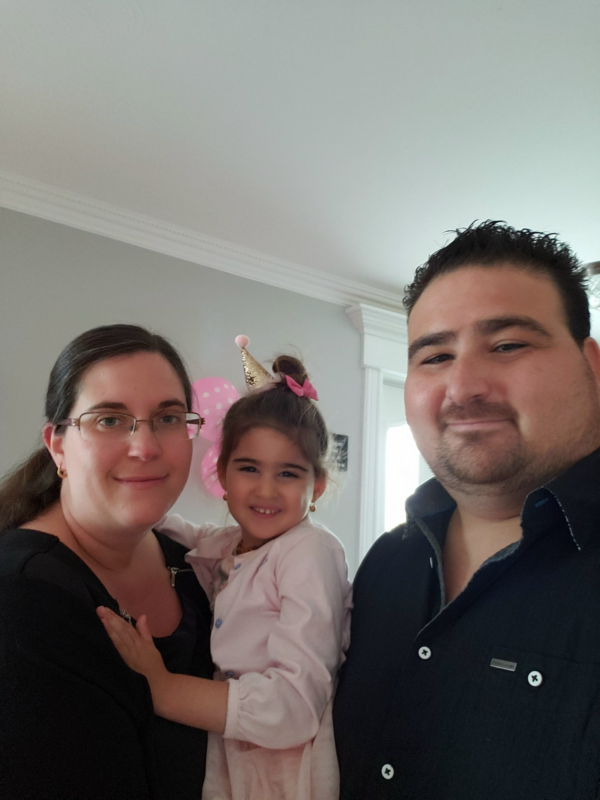
Five a.m. alarm clock: I sulkily hit the snooze button and slowly roll out of bed, ready to begin my journey to the office in Toronto. The train leaves promptly at 7:20 a.m. from Aldershot station, about a 20-minute drive from my house in Stoney Creek. To make it to the train on time so I am in the office by 9 a.m., I leave the house no later than 6:45, providing time for a proper parking spot and to load up my PRESTO before the train leaves. Shower, get dressed, eat a quick breakfast, and out the door I go; then on the train to Union Station, where the second “adventure” of getting onto the TTC awaits. I get off at Bay Station and hit the Tim’s on Wellesley to get my morning cup of coffee, then on my way to Alumni Hall. Emil is usually already hard at work, ready to greet me as I saunter past his office, stopping for a brief chat about the previous evenings’ Leafs game or how neither of our children slept the night. The day usually starts with checking the many emails that came in overnight, from students asking about information on their courses and reaffirmations that they are on the right track. Diana comes in not too long after, and the three of us chat a bit before getting “lost” in our work; though, before long one of us would usually ask “Is it lunch time yet?” as we couldn’t wait to go to our favourite lunch hot spot: EATALY! As you can imagine, the afternoons were a little harder to get through because of having eaten delicious food and especially after a bombolone (Italian doughnut). However, we got through the days easily with the help of student drop-ins, conversations with faculty, and many phone calls and emails being made.
Fast forward to mid-March. No longer being woken up by a 5 a.m. alarm to remind me I had to catch a train, the commute from Stoney Creek to Toronto turned into the commute from my bedroom to my “living room office.” No longer worried about getting on a crowded GO train or TTC subway. The worry now was whether my internet would hold up for the Zoom appointments I had that day; or whether my three-year-old would make an appearance at our Faculty Council meeting. Face-to-face conversations with students turned into many back-and-forth emails; morning conversations between colleagues turned into many WhatsApp messages and frantic Zoom meetings to talk about what had to be done that week. It very soon became “the norm” and we had to adapt quickly to our new circumstances. Course planning in the lounge turned into strings of emails between me and TST, making sure we had the right course information for the upcoming academic year. Zoom became a normal way of communication between me and our students, meeting to plan for what courses they had to take in the Fall and Winter. Since the COVID pandemic has caused many to re-think how we do things, we as a Faculty of Theology have decided to run our Fall courses remotely, not yet knowing what the Winter term will hold. The hope is that we can return to some in-class learning, but only time will tell. For now, we will continue to forge ahead and are planning a virtual Welcome Day, many Zoom liturgies to come, and a possible online Convocation.
Only a handful of times does my daughter want to know what “papa is doing,” or decides to peek her head into one of my student appointments. I have the benefit of not having to juggle working from home and taking care of my daughter at the same time because my wife has also been home since March; this has been a blessing in disguise. Though there have been challenges, it has been nice to be home with my family and be able to experience some of the things I would otherwise miss while away at work. We are lucky to be able to enjoy nice lunches together outside on our deck in the beautiful summer weather; It isn’t EATALY, but it is perfetto!
Read other InsightOut posts.
Fr. Alexander Laschuk, PhD is a priest of the Ukrainian Catholic Eparchy of Toronto. He is currently the Interim Executive Director of the Metropolitan Andrey Sheptytsky Institute in the Faculty of Theology, in addition to his responsibility as Judicial Vicar of the Toronto Regional Tribunal. He lives in Trinity-Bellwoods with his wife and daughter.
Finding Stillness in Chaos
I am a Catholic priest. Unlike most you know, I am married and have a six-year-old daughter (with number two on the way). Also unlike most priests you know, I do not spend much of my ministry in a parish. Instead, I live my priestly ministry in the curia, where I work as a canon lawyer. There are seven dioceses in Ontario for which I am responsible. Additionally, I seem to have a specific skill set—I fix problems. Sometimes those problems are in my own Eparchy, which extends from the Ontario border to the Atlantic. At other times my service is to the universal Church, which brings me to dioceses throughout the English-speaking world. My ministry means I am frequently away from home, which can add up to two or even three months in a year.
This all came to a crashing, screeching halt in March. I remember my last day in the office with my staff—we already were encouraging people to work from home. It was the feast of St. Joseph and there were zeppole on my desk. The State of Emergency was declared shortly thereafter, and we all began a brave new adventure.
In my case, this has meant being physically grounded—a real blessing in some ways as now I am home every day to put my daughter to bed. But it has also been chaos. When the Archdiocese moved to “remote work” except for essential staff it meant that in addition to my own job I suddenly had to keep 26 people busy. We were in the midst of opening a new tribunal office in the suburbs to remove the “physical distance” that, Pope Francis reminds us, prevents people from accessing the tribunal.
In our small Ukrainian Eparchy many parishes needed help applying for government support; I became the go-to guy with all these acronyms that soon became all too familiar: ROE, CERB, CEWS, and CEBA. At our parish in Trinity-Bellwoods, instead of hearing Easter confessions I became a videographer and learned far too much about live-streaming, while at my daughter’s school, the online class sessions every morning and afternoon became the anchor of her (and our) day. I realized how lucky we were when I spoke to other kindergarten parents whose children would only have one (or no) session a week.
My wife, who suffers from difficult pregnancies, was often bed- or couch-ridden and was, as I termed her, a “quarantine professional” who never left the apartment except for medical appointments. The usual downtown comfort of the constant hum of people and traffic turned into silence, and often the only sounds were screams in the night from the growing number of people on the street and in the park with nowhere else to go. As bedtime not so quickly approached for my daughter, there would be the silent prayer to God: just one more hour, Lord. Get us there, peacefully if possible. When she’d finally go down it would be frantic work until I fell asleep to catch up on all those things left behind in the workday.
More than four months have passed. The world is awakening from its pandemic-induced slumber. We have set up a chapel in the parish archives where I celebrate mass with my wife and daughter. For my daughter’s sixth birthday we ran around individual cakes for her party on Zoom. We’re getting really good at making dinner as a family instead of constantly eating out. I’ve started a new job as Interim Executive Director at the Metropolitan Andrey Sheptytsky Institute here at USMC. I can’t go into my office at Windle House and my predecessor can’t move out. I’ve not been on an airplane in six months. Our new home has been delayed nearly a year. The parish has spent thousands on PPE. I overhear my daughter giving her friends Zoom advice. My car dashboard is covered in blue masks. My wife rejoices that we’ve almost run out of hotel shampoo.
This time has left me frequently thinking of Elijah, who we call Elias in the East. When he went to find the Lord God, the Voice was not in the earthquake, nor the fire, but in the light breeze (3 Kings 19). Here, in the unnatural silence of abandoned downtown, the Voice of God blows with the breeze across the abandoned storefronts and the tents in the park. I hope we can all find a moment to stop and hear it, finding stillness in this time of chaos.
Read other InsightOut posts.
Dr. John L. McLaughlin, Interim Dean of the Faculty of Theology, is pleased to announce that Dr. Hilda P. Koster will be joining the Faculty of Theology as an associate professor in Ecotheology. Dr. Koster comes to St. Michael’s from Minnesota’s Concordia College, where she held joint appointments in Religion, Gender Studies and Environmental Studies.
“The addition of Dr. Koster to our Faculty underscores the importance of both ecological and feminist theology to the University of St. Michael’s College,” says Dr. McLaughlin. “She will carry forward the groundbreaking teaching and research of eco-theologians Fr. Stephen Dunn and Dr. Dennis O’Hara, as well as the important work in feminist theology conducted by professors such as Sr. Ellen Leonard and Sr. Mary Ellen Sheehan.”
Dr. Koster will teach courses for the Faculty’s three basic degree programs—the Master of Theological Studies, the Master of Divinity and the Master of Religion Education degrees—as well as teach and supervise graduate students through the Graduate Centre in the Toronto School of Theology. In the 2020-2021 academic year her courses will include Introduction to EcoTheology, Catholic Social Teaching, and a new course titled Ecofeminism, New Materialism and Ecological Theology.
She will also help shape the activities and certificate program of the Faculty’s Elliott Allen Institute of Theology and Ecology (EAITE), which was established in 1991 to allow students to acquire a specialization in theology and ecology.
“The University of St. Michael’s College has been a leader in ecological theology through the Elliott Allen Institute. It is a privilege and an honour to further this tradition of visionary ecotheological education and scholarship,” says Dr. Koster. “My own work in ecological theology is done from an eco-feminist perspective. To me environmental and gender justice are interconnected.”
Born in The Netherlands, Dr. Koster received her Bachelor of Arts and Master of Divinity degrees from The University of Groningen. After further study at Princeton Theological Seminary and the Candler School of Theology at Emory University in Atlanta, she earned her doctorate at the University of Chicago.
Dr. Koster has published articles and book chapters on eco-feminist theology, and edited two books on Theology and Climate Change. The book Planetary Solidarity: Global Women’s Voices on Christian Theology and Climate Justice (Fortress, 2017), co-edited with Grace Ji-Sun Kim, gathers eco-feminist theological reflections on the intersection of gender and climate justice by feminist/womanist/mujerista theologians from both the minority and majority world. Together with Ernst Conradie, she published the T&T Handbook of Christian Theology and Climate Change (Bloomsbury, 2019) to create a dialogue between religion scholars, ethicists and theologians situated within a high carbon footprint context and those representing climate vulnerable communities in low carbon footprint world.
St. Michael’s unique community owes much to the people who have worked at the College and contributed to its culture over many years. Employees who this year celebrate work anniversaries ranging from 5 to 30 years were honoured by the College with service awards.
Many of those honoured this year belong to Facilities & Services and the physical plant, including Steve Craig (10 years), Isabel Louro (15 years), and Irene Wiseman (15 years). These departments were among the few that remained largely on campus over the summer to provide essential services, focusing on health and safety.
Members of the Office of the Principal and the Registrar’s Office include Jean Talman and Guillermo Mejia (both 30 years), representing decades of faithful service to St. Michael’s students in sorting out everything from questions about program requirements to the logistics of convocation. Given the Office of the Registrar’s fast transition to remote service delivery in response to COVID, it remains possible for even a veteran of 30 years in the department to experience something new at work.
The list of honorees also includes admired professors such as Christianity and Culture’s Michael O’Connor (15 years), esteemed members of the Kelly Library such as Remi Pulwer (15 years), and staff and faculty from still other departments whose work continues to strengthen the bonds of St. Michael’s community even in a time of physical isolation.
In addition to these figures who continue to serve, St. Michael’s also honours two members of the community who have concluded their work for the school. Fr. Peter Galadza retired from his position as Director of the Sheptytsky Institute of Eastern Christian Studies this summer. In addition to decades of teaching and research at the institute, he oversaw its transition to St. Michael’s from St. Paul’s in Ottawa. Debra Matthews in the Office of the President concluded her career at St. Michael’s this year as well after providing direct support to three presidents during her tenure. She has retired in order to spend time with another community: that of her children and grandchildren. St. Michael’s wishes both Fr. Peter and Debra all the best in their next chapters.
Noel McFerran has worked as a librarian at the University of St. Michael’s College since 1998. His current position is Theology and Rare Books Librarian.
“Be Right Back!”
I spent last Wednesday morning in the Kelly Library providing curbside pickup service to faculty and students. As a librarian, it was exciting for me to see the library taking further steps to provide library materials to patrons while maintaining the health and safety of everybody involved.
Since mid-March I’ve been working from home, keeping very busy responding to emails from faculty and students about their course work and research. Wednesday was one of my first times back inside the Kelly Library. The most important thing was to be trained in how to function in my regular work environment during a pandemic. I thought that I knew all about social distancing, wearing masks, and sanitizing hands—but it’s so much more important in a workplace where there are other staff using the same desk and equipment. Just like in the supermarket, we’re maintaining a one-way route in the library in order to reduce face-to-face encounters between staff.
Every day the Kelly Library receives a computer-generated list of books and DVDs which patrons have requested through the UofT Library Catalogue. One staff person looks for these items on the shelves. Most items are where they are meant to be, but occasionally we have to search for something which has wandered from its regular home. Items then get checked out to patrons. Right now all items are signed out until September 18, 2020.
Another Kelly staff person, working from home, sends personalized emails to patrons telling them that their books are ready to pick up. Sometimes patrons respond with special requests (e.g. “Can a friend get my books for me?”).
At present patrons can pick up their requested items at the Kelly Library anytime Monday to Friday between 9:00 a.m. and 4:00 p.m. The pick-ups ebb and flow. I filled the low periods with other library work to keep myself busy.
The first encounter between a library patron and staff is through a glass wall where the patron shows their library card. (I had real difficulty reading the card through the glass, so I might need to make an appointment for an eye exam!) You can’t really hear people on the other side of the glass, so we have various printed signs which communicate the most frequent things (like “Be right back”).
Staff retrieve the patron’s bag of books and place it on a table outside the library under the overhang. Even then there is reduced interaction between staff and patrons. Smiling doesn’t mean so much when you’re wearing a mask, so I tried to wave in a friendly way.
The response from faculty and students to the Kelly Library’s curbside pickup service has been very positive. My colleague Risa de Rege, who has worked many shifts in the past week tells me, “People have been very grateful that we’re offering curbside pickups, and are also respectful of our space and policies.” In the first week, 76 patrons submitted requests for 141 items. As more people learn about the service and how easy it is to use, that number is likely to increase. So far, though, we’ve been able to respond quickly to requests.
Nobody wants the COVID pandemic to go on any longer than it has to. But for the present and near-future, the Kelly Library is developing solutions to continue to provide library service to our faculty and students. I love being a part of that, knowing that my work contributes in a small way to the academic success of others.
Read other InsightOut posts.
The Metropolitan Andrey Sheptytsky Institute (MASI) heads into the 2020-2021 academic year with new leadership and a new faculty position in Patristics.
Fr. Alexander M. Laschuk has been named Interim Executive Director of MASI following the retirement of Fr. Peter Galadza on June 30 of this year. Fr. Laschuk is a priest of the Ukrainian Catholic Eparchy of Toronto and Eastern Canada, and serves in numerous ministries, including as Judicial Vicar of Toronto’s marriage tribunal. Until recently, he was also economos, or finance officer, of the Eparchy of Toronto and Eastern Canada. Fr. Laschuk has civil and ecclesiastical doctorates in canon law from Saint Paul University and the University of Ottawa. His research interests include ecclesiology, penal law, and procedural law and he regularly publishes in these areas in addition to canonical consultancy and advocacy work with dioceses and clients across North America.
Fr. Laschuk has regularly taught with the Sheptytsky Institute since 2010, and continues to teach in the Faculty of Canon Law at Saint Paul University, Ottawa, where he served as Interim Director of the Sheptytsky Institute in 2013-2014.
Dr. Sean Argondizza-Moberg has joined MASI on a one-year Contractually Limited Term Appointment as an Assistant Professor in Greek Patristics. Specializing in Christian asceticism in late antiquity, Dr. Argondizza-Moberg earned his doctorate at Catholic University of America’s Center for the Study of Early Christianity. The position, located within the Sheptytsky Institute, is renewable to a maximum of three years. Dr. Argondizza-Moberg is currently working on a book on monasticism and classical culture.
“We are delighted to have both Fr. Laschuk and Dr. Argondizza-Moberg joining us,” says Dr. John L. McLaughlin, Interim Dean of the Faculty of Theology. “Fr. Laschuk is a skilled academic who will offer strong leadership at MASI as it looks toward the future, while Dr. Argondizza-Moberg’s work in Patristics will strengthen our offerings to students in this key field.”
The Sheptytsky Institute is an autonomous academic unit of the Faculty of Theology of the University of St. Michael’s College (USMC) in the University of Toronto (U of T). It specializes in Eastern Christian Studies, including the theology, spirituality, liturgy, history, and ecclesial polity of the Eastern Christian Churches, both Orthodox and Catholic. MASI students specialize in Eastern Christian studies within the basic-degree and graduate degree programs of St. Michael’s College. All degrees are conjointly conferred by St. Michael’s College and the University of Toronto.
Emily VanBerkum (USMC MDiv 2015) is the Dean of Student Residence at Loretto College, and John Paul Farahat (UofT DMA 2019) is Director of Music and Principal Organist of Saint Basil’s Church.
Enjoying Life’s Quiet Moments
“How many times have you noticed that it’s the little quiet moments in the midst of life that seem to give the rest extra-special meaning?” — Fred Rogers
The story of the proposal is really a two-part saga. Last year around this time, we were vacationing in Chamonix, France. Standing at the base of Mont Blanc, eyes gazing up at the breathtaking alpine landscape with gelato and marzipan cookies in hand, we considered ourselves incredibly grateful.
Unbeknownst to one of us, an engagement ring had been discreetly tucked away in our luggage for a surprise proposal in the Alps. But that carefully chosen landscape would fall through following an ill-timed fall down an old stone church staircase moments before that destined date-night dinner. Instead of a picturesque engagement ring reveal in a historic gazebo on a crisp late summer night under a sky of twinkling stars…a torn ligament, a pair of crutches, and a wheelchair ride through the Geneva airport.
One month later—ankle reasonably healed—we took a relaxed evening stroll along Toronto’s Queen’s Quay. Nearing sunset, on an ordinary park bench looking out to the calm waters, a proposal happened at last. A wild success: two elated smiles (and no torn ligaments). It was a perfectly tranquil, joyful moment. We laughed at the story of the-Chamonix-proposal-that-almost-was, and exclaimed to each other that 2020 was the year to be married—a year of perfect balance and harmony. We unhesitatingly chose Saint Basil’s, a parish to which we have both happily belonged since our student days, and set a date for September, 2020.
Much has changed in the world since we made initial arrangements. While our 2019 selves were focused on venues, vendors, realizing the “wedding vision,” and planning for out-of-country family members to attend, our 2020 selves have been more concerned with health, safety, and grappling with our new reality.
Our new central question was shared with many others: do we go ahead with the wedding, or do we postpone?
Our engagement story provided us with a providential lesson. The elaborate getaway proposal in Chamonix—with bells, whistles, and grand gestures—was replaced with a quiet proposal close to home, with only the most essential elements: the two of us, the “big question,” and a whole-hearted promise to spend our lives together. Indeed, the most though-out plans do not always go according to plan. Often, it is the beauty of the “quiet” moments that we cherish so deeply. It’s these instances that capture a moment in time, leaving an indelible mark on our minds and hearts.
Therefore, we have decided to move ahead with the originally scheduled date.
Establishing a sacramental union in Saint Basil’s, even without the larger guest count, elaborate reception, or flourishes that we had originally imagined, allows us to be true to what is most foundational: that marriage is a vocation in which the couple is drawn together for a purpose greater than themselves. Just like the proposal, our wedding day will be a reminder to find joy and contentment in the quiet, less elaborately planned moments of our married lives.
The beginning of our married life, surrounded by a small gathering of immediate family, will be at the forefront of our special day. And while we know the wedding day doesn’t make the marriage, in the end, perhaps the apparent “quietness” of the day will be everything we didn’t know we needed.
Read other InsightOut posts.
Catherine Mulroney is a communications officer at the University of St. Michael’s College. She is also a double alumna of St. Mike’s, holding a B.A. in English and Mediaeval Studies and a Master of Divinity degree. That equals many hours in Kelly Library and many, many overdue fines.
Raising Our Voices
It began—as many of the best things do—with someone volunteering an absent colleague for a little extra work.
Our new St. Mike’s blog, InsightOut, is the result of an after-hours conversation with Communications Director Laurie Morris and Theology prof Dr. Darren Dias on March 16, the last day we were all present on campus. Dr. Dias mentioned that his colleague, Dr. Michael Attridge, was self-quarantining at home after a research trip to Italy.
“It’s a good story,” Fr. Darren said. “You should ask Mike to write something for the website.”
Then the wheels began to turn. While not one of us could predict just how the comings weeks and months would play out, we knew we were facing an extraordinary moment in the university’s history. There would be value, we thought, in hearing each other’s experiences in, and thoughts about, living through such a momentous period.
Four months later, we now have a pattern established of InsightOut blog posts running on the St. Mike’s home page every Monday and Thursday. Each story, each opinion, is unique. And as the person privileged with soliciting and receiving submissions, I am humbled by the chance to be part of the process.
Graduate student Fr. Gustave Noel Ineza, O.P., for example, spoke about his childhood during the Rwandan genocide and urged us not forget the suffering of the broader world as we focus on local troubles.
Alumnus Dr. Christopher De Bono,Vice President of Mission, People and Ethics at Vancouver’s Providence Health Care, wrote about how moving he found his neighbours’ nightly ritual of banging pots and pans and making noise to celebrate the dedication of health care workers.
Interim Principal Dr. Mark McGowan, meanwhile, a professor of History and Celtic Studies, submitted a video explaining the typhus epidemic of 1847 in light of the current situation.
Professors have written about what their subject areas tell them about the pandemic, while students have talked what St. Mike’s means to them. And alumni members like Patricia Dal Ben, along with her colleague John Kostoff, a member of St. Michael’s Collegium, offered their professional wisdom on how families can keep a faith life alive when unable to get to Mass.
Some people have shyly offered to submit while others, when approached with a specific topic, agree with grudging good humour.
Coming posts will touch on the reality of working from home as a parent, how we are preparing for the coming academic year, and even how to get married during a pandemic. Pieces have ranged from moving to amusing.
Anyone who has worked through these past months will have experienced their colleagues in new ways. Zoom meetings reveal family photos or a glimpse of a partner or pet. A phone call might be interrupted by a delivery person at the door of what has become a home office.
For those of us working at St. Mike’s, the blog has taught us about family, we’ve heard admissions from those who miss their colleagues, we now know about our officemates’ hobbies, and we have gained insight into who we are as a community and what makes us unique. When we are at our best, it seems, we are closer to being family than colleagues.
But lest this sound like busy work or a grand vanity project, it’s anything but. While we’ve gained insight into our colleagues, the blog’s purpose is very much outreach. Having worked on planning various campus events, I know how people look to St. Mike’s to keep them engaged with the world and continuing on a path of lifelong learning. And if we can’t do that in person, some reflections and mini-online lectures are a sound alternative.
Parents of future students may come away from this blog reassured that not only are the people who’ll be working with their children skilled, capable professionals, they are also decent and caring people.
Future students can read the blog and find out some of the cool work happening on campus, and look forward to engaging in the kinds of discussions that make university a once-in-a-lifetime experience.
And alumni can engage with InsightOut and know that their alma mater remains vibrant and in good hands.
One of the great ironies of this time of masks and social distancing is that through it we have been brought closer together. We now know more about each other and, more often than not, knowledge brings with it respect. We have learned to work together in new ways and have seen the value in teamwork.
As we approach the fall, this blog will begin to pivot toward other aspects of life at St. Mike’s, looking ahead to a time when we can put the pandemic behind us.
If you are connected with St. Mike’s and would like to participate in InsightOut, please send me an email to chat about a submission.
Having heard the stories of the St. Mike’s community, I am confident we will head into the fall ready to take on pretty much anything. As the hashtag says, we really are all in this together.
Read other InsightOut posts.
Kelly Library patrons can once again hold physical books from the collection in their hands through a new curbside pickup service.
To support the community’s access to materials while also following public health guidelines, library staff can now accept requests from any patron with a valid UTORid through the UTL catalogue for select physical items in the collection that are not held in the Hathitrust Digital Library. These items are then made available for pickup in a safe and appropriately distanced manner.
“Curbside pickup of materials is an exciting move toward reinstatement of our services and in our ongoing effort to support students and faculty,” Chief Librarian Sheril Hook says. “As we launch and evolve the service, the health and safety of our community is a top priority, with safety precautions implemented at each step of the borrowing process, following guidelines outlined by the University of Toronto Libraries and Toronto’s public health authorities.”
After they receive a pickup notice from library staff, patrons can visit to pick up materials between 9 a.m. and 4 p.m. Monday to Friday in front of the library. Visitors using the service will queue in a waiting area and then proceed to approach the window near the book return slot under the awning of the library, and boxes marked with tape on the ground will indicate where patrons should wait in order to maintain a safe physical distance. The library will not be open to visitors indoors, and all pickups will be handled outside. Patrons who cannot come in person can place a note in the catalogue request for their friends or family members to pick up materials for them.
The service makes available materials that have otherwise been inaccessible to patrons in any format during the pandemic. In addition to the physical items now available for curbside pickup, patrons can request a PDF scan of a single book chapter or journal article from the library’s circulating collection not available through Hathitrust. Physical items being lent out will be due back by August 31, 2020, although this date may be updated as plans continue to change during closures.
The Kelly Library has made available full instructions for using the service, including health and safety guidelines and FAQs.
St. Michael’s pulled out all the (virtual) stops on Thursday to honour three key leaders as they move on to new roles and responsibilities. More than 90 people gathered online to celebrate the careers—thus far—of Principal Randy Boyagoda, Theology Dean James Ginther and Fr. Peter Galadza, Director of the Metropolitan Andrey Sheptytsky Institute of Eastern Christian Studies (MASI).
Festivities began with a slideshow of each man in action on campus—Fr. Peter with students at Windle House, Dean Ginther presiding at convocation, and Principal Boyagoda in Rome with Gilson Seminar students—all set to the jazzy strains of Natalie and Nat King Cole’s duet of “Unforgettable.”
Then President David Sylvester kicked things off with a welcome to guests, who ranged from students and Collegium members to colleagues and family. Dr. Sylvester recalled his own welcome party two summers ago, bemoaning the fact that the assembled could not celebrate in person in the sunshine of Scollard Park, as he had been feted.
As the program unfolded, however, the inability to gather together did not stand in the way of heartfelt praise for each man. Dr. Ginther offered a tribute to Fr. Galadza, who is retiring from MASI, citing his “dogged commitment to academics,” his “passion for Eastern Christian studies” and his deep faith.
The Dean recalled that even though the two men were doing doctoral studies at the same time at St. Mike’s, it was only during the negotiations in 2017 to bring MASI from St. Paul’s University in Ottawa to St. Michael’s that they met, and Dr. Ginther expressed great admiration for Fr. Galadza’s dedication to students, MASI and the Church.
In response, Fr. Galadza offered his thanks, and expressed his delight at finally being able to spend more time with Olenka, his wife of 41 years.
“God bless all of you,” he said, and guests responded with a flurry of virtual toasts and clapping emojis.
Then Dr. Sylvester offered thanks to Dean Ginther for his service to the Faculty of Theology, noting that, as both men are mediaevalists, the former knew the latter’s academic reputation long before the two met, given Dr. Ginther’s profile as a scholar of Robert Grosseteste and his work in digital humanities.
Calling him a champion of the Faculty, the President cited the Dean’s “tireless work” in renewing the graduate division of St. Michael’s, citing three new hires as an exciting indication of things to come.
Dr. Ginther responded with thanks to faculty staff and his colleagues, and told those assembled how much he is looking forward to returning to the classroom after his year-long research leave.
“It’s been 12 years” since he’s had a leave, he noted.
This prompted another flurry of toasts and clapping icons.
Then it was Dr. Boyagoda’s turn to be honoured. With some gentle teasing, the President noted that if he left anything out in his introduction “Randy would fill it in.”
Dr. Sylvester thanked the outgoing Principal for his vision for St. Michael’s, noting that he was at the forefront of the renewal of the university’s programming and repetition, helping to restore St. Mike’s to its place as the leader in Catholic education.
In his response, Dr. Boyagoda, who has been named Vice Dean, Undergraduate in the Faculty of Arts & Science at the University of Toronto, offered thanks to many people, and then concluded his remarks with an anecdote.
He had just been the basement of Elmsley Hall with a young colleague to seek out furniture for the office he will maintain at St. Mike’s, as he will teaching the Gilson Seminar next year. The new employee who greeted him thought he was a student.
“I’m leaving here feeling young!” he proclaimed, and everyone offered a virtual toast.
Then came a round of comments from such notables as Collegium Chair Fr. Don McLeod, CSB, and Dr. Christopher Brittain, Dean of Divinity at Trinity College.
It was not the in-person party that anyone had imagined, but it was a heartfelt send-off, and the community wishes all three godspeed as they head off in new directions.
Andrew Selvam is currently the Acting Chaplaincy Teacher at St. Joseph CSS in Mississauga. He is also a science and religious studies teacher with the Dufferin-Peel Catholic District School Board. He is currently pursuing his Master of Religious Education degree at St. Michael’s Faculty of Theology. He enjoys music, hanging out with friends and family, and travelling.
A Language of Love, Unity, and Joy
The day was March 12; I remember it clearly. I had just finished with our chaplaincy team meeting in the library when a student asked me if it was true…that they would be closing schools for three weeks because of COVID-19. I immediately went to my computer to confirm what I hoped wasn’t true and, lo and behold, it was. We would be away from school for at least three weeks. Immediately the news cycle was flushed with what was becoming a worldwide pandemic and, as each given week passed, it seemed more and more likely that the school year would happen away from the school.
After March Break, it was a very slow waiting game. Retreats, social outreach programs, and student engagement activities would have to be put on hold. The way relational ministry would have to be delivered would look very much different. I had been reading all the emails from our school board offering all of the different platforms for learning, but I stood there for a moment and wondered “How do I connect with students?” From the beginning, it became a get-go of mine to make sure that, in as many ways as possible, I was going to make it feel as much as it could for students like we had never left. My first digital daily reflection went out on the feast day of the patron of our school, St. Joseph, more important than ever as the patron saint of families and the universal church. The Holy Spirit that I always felt travelling through a school would be called upon to help me figure out this new upper room. And that was just my motivation. I needed the Holy Spirit also to do the work of expanding this upper room, now neighbourhoods apart from each other and along a digital superhighway.
As each new day rolled out, each reflection and activity would focus more on refocusing our “new reality” into something positive, something to come alive through the Spirit. Meeting with students using videoconferencing applications made it as close to kids coming by the office as I could. Three-and-a-half months later, it has transformed into an opportunity for us to hear each other, talk about the struggles of the day, of the week and of the month, and offer support when needed. With the chaplaincy team back in full swing, I was ecstatic that, more than ever, kids were looking for ways to be engaged outside of the classroom. Each discussion we had and prayer we said felt like therapy for the mind and the soul, for the kids and for me.
But distance-learning causing frustrations wasn’t the only thing on the minds of staff and students. The number of deaths of relatives of staff and students was on the rise, and I asked the Spirit to just give me the right words to say when I picked up the phone to offer my condolences and support in any way that I could. It also became apparent that many of our families had parents unable to work, raising the possibility of not being able to put food on the table. The St. Vincent de Paul society helped us out, as did our generous staff, to provide food and gift cards for our neediest families.
I have to say I had my reservations. I did not know what distance chaplaincy would look, but it has been more than enlightening. It has shifted me out of my comfort zone in a way only the Holy Spirit can, and moved me to find energy reserves I did not think I had. We had just celebrated Easter at the beginning of this pandemic, and we know that we are an Easter people called, as Christ did, to work to make anew. More than anything, though, we have been called to be a Pentecost people—gathered together, filled with our blessed gifts, so that people outside our Upper Room can hear us speak in a language that they could understand—a language of love, unity, and joy.
Read other InsightOut posts.
Dr. Darren Dias teaches in St. Michael’s Faculty of Theology, specializing in Trinity, Religious Diversity, and teaching methods. He is currently working of a SSHRC funded project with colleagues Gilles Routhier (Laval) and Michael Attridge (St Michael’s) entitled: “One Canada, Two Catholicisms: Divergent Evolutions in the Catholic Church in Quebec And Ontario, 1965–1985.”
When the Monastic Cell Meets a Zoom Meeting
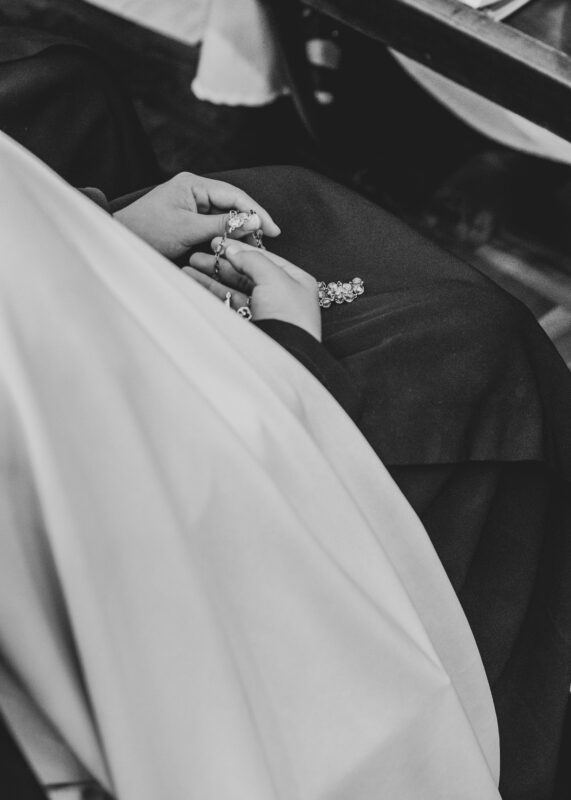
When someone enters a religious order or institute for consecrated life they begin with the novitiate. Monastic orders like the Benedictines, Cistercians, and Trappists, mendicant orders like the Franciscans, Dominicans, and Carmelites, or apostolic congregations like the Basilians, Sisters of St Joseph and the Lorettos—everyone begins in the novitiate. This is an intense period of no less then twelve months when the novice is removed from his or her normal life and confined to the novitiate community. The novice leaves behind his or her job, or studies, and the comfort of one’s usual network of relationships, and enters into something new. One is suddenly disconnected and inserted into a foreign reality. Novitiate is the beginning of a process of formation into a particular history, charism, spirituality, theology and way of living.
My novitiate was spent in the Priory of St. Albert the Great in Montreal. The large priory was built to house about 100 friars in 1960 (just before the exodus of so many religious). The complex includes a large conventual church, refectory, community rooms, ‘cells’ (bedrooms), pastoral institute, administrative offices, even a pharmacy, swimming pool and its own postal code. Although on the campus of the University of Montreal, St. Albert seemed like an oasis in the midst of the hustle and bustle of urban university life. One could easily survive without leaving the complex for weeks, maybe months.
St. Albert seemed to have preserved much of the medieval character of the Order of Preachers: a separate choir for the religious in the chapel, long refectory with an alcove for the reader, silence in the halls, habited religious moving from choir to refectory, etc. The rhythm of my day unfolded according to the schedule of the liturgical hours (prayers): lauds and Eucharist in the morning, mid-day prayer, and vespers; after each hour, the appropriate meal was served. Between prayer and meals there were blocks of time for contemplation and meditation (naps); study, common and individual; and work, on-site labor to meet the needs of the community (cleaning, gardening, snow removal, etc.).
The imposed confinement in March due to COVID-19 has felt in many ways like a return to my novitiate experience. The rhythm of life that developed in the wake of the confinement was not unfamiliar. My life was not punctuated primarily by apostolic activities—teaching, lectures, parish ministry—but around common prayer. Always being home has meant that morning or evening activities no longer make it possible to skip common prayer for a different “priority.” Of course, through technology many of activities continue, but in drastically different ways. The sacrosanct private space of the “monastic cell” has been displayed on Zoom for all to see.
For centuries, religious have in some way retreated from the world, for love of it, into a voluntary confinement. Withdrawal means making space for the other, especially for the most vulnerable and in need. This is not a space of escape from the world, but a space of intimate encounter, where the “joys and the hopes, the griefs and the anxieties” (Gaudium et spes) are appropriated and placed before the Triune God in prayer. Since COVID-19 began, this prayer has been mottled by petition and supplication for healing and reconciliation.
Religious communities, even ones rooted in monastic or medieval notions of “separation from the world,” are not unaffected by pandemic. In 1918 Archbishop Paul Bruchesi of Montreal wrote a pastoral letter praising the work of many religious communities during the Spanish Flu epidemic. Apostolic religious communities were on the frontlines of health care and social assistance then. In these twilight years of religious life in Canada, religious communities experience solidarity with the victims of COVID-19 differently. Less than directly serving those most affected by the pandemic, many religious have become its victims.
If religious communities were aware of their vulnerability before the pandemic, how much more keenly are they aware of it today? In 2014, Canada counted about 11,600 religious. Of that number 50% were over 80 years old and 44% between the ages of 60-80. Already in 2014 fully 25% of all religious lived in long-term care homes. Many religious communities have been devastated by the coronavirus. In Ontario, the Jesuits temporarily shut down their retirement facility. Half of the residents in the Residence-De-La-Salle, a mixed religious community care facility in Quebec, have died. Some religious communities have lost up to one third of their members due to COVID-19.
My return to my novitiate experience, coupled with the witness of those who have been affected by the disease, reminds me that religious life is an ongoing process of becoming ever more vulnerable. A voluntary confinement does not separate religious from the world around them, but brings the vulnerability of that world into the heart of who we are.
Read other InsightOut posts.
June 8, 2020
Dear members of the St. Michael’s community,
I trust this message finds you in good health and holding up in these uncertain times. The 2019/2020 academic year has ended like no other, and I have watched our community respond with grace, courage and resilience to the challenges created by the COVID-19 pandemic. Once again, St. Michael’s is showing that even in very difficult times, our strength and generosity marks us as an anchor of hope in our community.
Social media use of #allinthistogether has gathered traction as the world responds to COVID-19, but I am particularly struck by how, at St. Mike’s, we really are in this together. Together, our students, faculty, alumni, and staff have worked to respond to these unique times, enabling classes to continue while ensuring the safety and security of campus, and the community. Students have been particularly resilient, and they have shown great understanding and patience in the face of a dramatically upended school year. As I look forward not only to the coming academic year but also to the future of St. Mike’s, I am confident that the lessons learned in these challenging days will help strengthen this incredible place, a place with compassion and community at its very heart.
When it became clear in mid-March that we needed a drastic response to the looming health crisis, creative problem-solving swung into action across the University. Within days, faculty and staff began offering classes and advising remotely, and students rose to the challenge. Residence students were able to pack up and head home early. The library remained open online, even offering a town hall on research. With a dedicated skeleton staff on campus to ensure that our students who could not leave were safe and supported, colleagues began working remotely, and virtual meetings became the norm. For the first time in history even Collegium and Senate meetings moved online.
This period will forever be remembered as a time when the world faced challenges above and beyond the norm, and we offer our support to those who are suffering. For St. Mike’s, the pandemic has forced us to sacrifice some much-loved traditions. We had to cancel spring reunion on campus and move to online anniversary activities, and the Class of 2020 missed out on an in-person, on-site convocation. As always, however, our community has responded with energy and hope. Whether it’s our Student Life team working on a virtual orientation for the incoming class, staff in the Registrar’s office taking additional time and care to respond to new and returning students’ concerns, or one of our students arranging to donate thousands of masks to protect those still on campus, this community is motivated by a concern for others, and it has been deeply moving and inspiring to witness.
We were in the midst of our St. Mike’s 180 planning when the pandemic hit. The pause in this project has allowed us time to reflect on our efforts to date and has affirmed what we already knew, that it is the strength of this community that is helping us weather this difficult storm and gives us hope for the future. We remain focused on our plans for renewal and I look forward to restarting conversations with you all about who we want to be as an institution and how we plan to achieve that. Obviously, we are stepping into a very different world, but St. Mike’s is prepared and must take up the mantle of leadership and think of new ways to build hope for our university and society, through our academic and student life programs and through our alumni and community partnerships.
Looking ahead to the 2020-2021 academic year, much remains unknown and difficult decisions must be made in the face of ongoing uncertainty. The health and safety of our community continues to come first, as well as the ability to reopen and resume operations when we are able to do so safely. The university is also facing challenges with regard to reduced revenues, and must also ensure that it remains fiscally sustainable. In early April, we implemented a hiring freeze, along with temporary redeployments. More recently, faced with prolonged shutdowns of parts of our campus and operations the University has worked with the United Steelworkers so that employees in our Facilities and Services Department and Physical Plant Departments can self-identify if they are willing to take a temporary leave. Staff who are affected by this decision have already heard from us directly.
Despite the challenges we are facing as the result of the pandemic, we remain committed to our community and charting a path forward. We are doing everything we can to sustain our workforce and adapt as we move through this crisis. We have established an advisory group, focused on plans for the fall, and we will continue to follow advice from public health and government guidelines. The University of Toronto has recently announced a plan to support employees in working from home where possible until at least September. St. Michael’s is part of this collaborative effort to achieve a gradual and safe reopening of the city’s workplaces.
Fortunately, in addition to calling on the expertise of our in-house resources, we can also tap into the knowledge and best practices of organizations such as Universities Canada to help us continue to do what we do best as a centre of learning and faith committed to building the common good.
Our Collegium remains a strong sounding board and a source of advice, responding wisely and compassionately to the unique concerns raised by the pandemic. Last week, the USMC Senate discussed the impact of COVID-19 on our academic community. We head into the coming year in especially capable hands, with former St. Michael’s Principal Dr. Mark McGowan returning as Interim Principal, as Prof. Randy Boyagoda becomes Vice-Dean, Undergraduate in the Faculty of Arts & Science at U of T. As well, Dr. John McLaughlin will again serve as Interim Dean of the Faculty of Theology as Dean James Ginther returns to the classroom following a leave. We are also very fortunate to have continued great student leadership, and I have already begun to work with Cianna Choo and the newly-elected executive of SMCSU.
While there is still so much we do not know about the course of this pandemic, rest assured that we will continue to communicate via email, social media and our website, stmikes.utoronto.ca, with important information about the 2020-2021 academic year and how and when the campus will reopen. Yes, we are in extraordinarily challenging times, but we are truly all in this together, and with your help St. Michael’s serves as an anchor of hope, an engaged and compassionate community dedicated to serving the greater good.
I am proud to be a member of this remarkable community.
Gratefully,
David Sylvester, PhD
President and Vice-Chancellor
University of St. Michael’s College
Educators and alumni members John B. Kostoff and Patricia Dal Ben are the authors of One Home at a Time: Realizing and Living Out Our Domestic Church, Novalis 2019. John, who is the Executive Director of the Ontario Catholic Supervisory Officers’ Association, graduated with a Bachelor of Arts in 1977 and now serves as a member of the University of St. Michael’s College Collegium. Patricia, who is Curriculum Consultant: Religious Education, Family Life and The Arts with the Halton Catholic District School Board, graduated with a Master of Theological Studies degree from the Faculty of Theology in 2017.
Building the Domestic Church
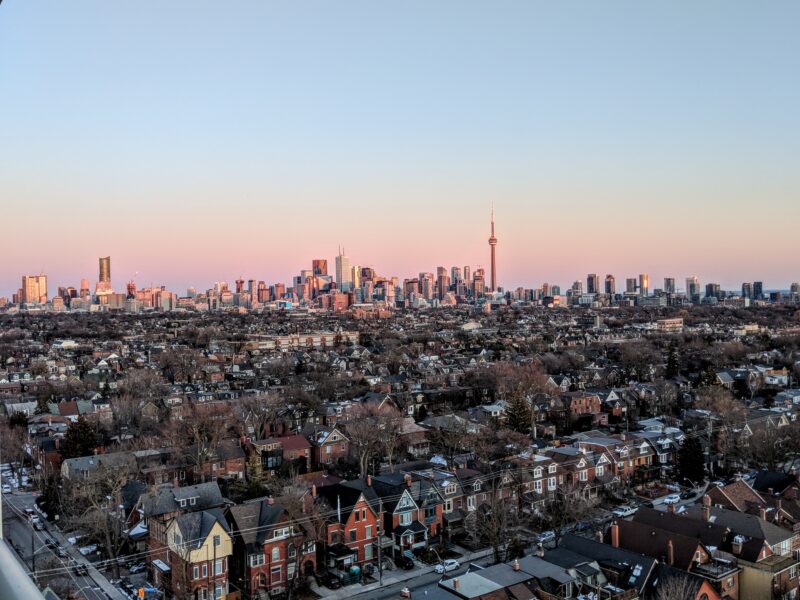
Since the beginning of this pandemic, home is where we have been called to “stay safe” and where we have been staying for weeks on end. Home has never meant so much to so many people. It is the place we have baked, binged, and worked. It is the place we have homeschooled and the place where we have celebrated virtual mass. It is also where we have wept and worried and then worried some more. So how has your notion of home changed during this time? Or has it?
Long before this pandemic, home was, in part, where mass was celebrated; not the way we celebrate it today or with hope in the near future, in our bricks and mortar churches, but celebrated nonetheless. The Apostles sat in the upper room after the crucifixion trying to reimagine what this “new” life was going to look like. Luke the Evangelist recounts in the Acts of the Apostles that “Day by day, as they spent much time together in the temple, they broke bread at home.” (Acts 2.46a) The Catechism of the Catholic Church also reminds us that,
“In our own time, in a world often alien and even hostile to faith, believing families are of primary importance as centres of living, radiant faith. For this reason, the Second Vatican Council, using an ancient expression, calls the family the Ecclessia domestica.” (1656).
The home church or domestic church has a long-standing tradition in our faith experience, and this notion was reignited by Bishop Fiordelli at the Second Vatican Council. St. John Paul II called the family “another invaluable expression of the apostolate of families” (Letter to Families, p. 16, 1994). The Church has continually valued and called on the faithful to create anew the reality of being home.
Article after article, post after post, people are reaching deep to look at what matters and realigning how we project into the world and how we deal with all that is happening and all that is still unknown. Missing our churches, the community, THE celebration is important, but never has there been such a time to reinvigorate our home churches. What we do now in our domestic church will have a profound effect on the future of our universal Church. We have a responsibility to develop the domestic church as authentic projections and expressions of our collective baptismal call.
As we celebrate Pentecost and the birthday of the Church, let us not forget how important that first house church was, and the responsibility we all have to nurture and support that growth and faith development in our own homes with the people we call family. The domestic church has been instrumental in laying the foundation of what is most important to this temporal life. From those early moments of gathering and now, thousands of years later, without a church building or the ability to gather in our places of worship—how then do we claim to be Catholic? How do we delineate in our homes that our faith tradition matters? The new evangelization has come to us in a bold and enticing way. How we understand what is happening in our world will forever change how we participate in Church. There has never been a better time to be taking stock of our domestic church so that when we unite once again to the source and summit we will have done our best to proclaim as good and faithful servants in our homes and beyond.
Read other InsightOut posts.
Throughout the seasons of Lent and Easter, Dr. Darren Dias, OP, who teaches systematics at the Faculty of Theology, has shared his homilies with the broader university community. For the Feast of Pentecost, he spoke on the subject of race and renewal.
Pentecost 2020: Act 2:1-11; 1 Cor 12:3-7, 12-13; John 20:19-23
Today we celebrate the renewal of creation when the risen Lord appears amidst his disciples and breathes life into them, as God first breathed life into Adam (Genesis 2:7). But today the last words of George Floyd—a 46 year-old father of 2 brutally murdered by police because he was black—echo in our midst: “I can’t breathe.”
This week the Ontario government warned that confinement and distancing regulations will not be relaxed as expected because of the increase of COVID-19 cases. We see these especially in lower income and new immigrant areas of the city where pockets of racialized persons live. We have spent the entire Easter Season in confinement and now at its completion, it looks like it will be prolonged.
Perhaps not unlike the disciples we lock our doors out of fear of the real dangers lurking about; locked in our homes or in the bubbles created by masks and gloves and safe distance. Yet Pentecost in John’s Gospel account is the moment when Jesus appears to the disciples, meets them in their fear, and releases them from it by breathing the Spirit of new life into them, and then sending them into the world on a reconciling mission. But we remain locked up, anxious about COVID-19 , and for racialized persons like me, fearful of the lurking plague of violence. So what kind of Pentecost can we celebrate this year?
In the narrative from Acts we read another account of the giving of the Holy Spirit. A violent wind fuels the tongues of fire that appear over the disciples. These are external manifestations of the Holy Spirit’s presence in the community. Likewise, the disciples’ preaching, understood by speakers of various foreign languages, Parthians, Medes, and Elamites, Libyans, Romans, Cretans, etc., is a manifestation of the Spirit’s power.
Pentecost is often seen as a remedy to the confusion of the multiple languages that resulted from the destruction of the tower of Babel in Genesis 11. Now we don’t have readings from the Hebrew Bible during the Easter season, but if you remember in Genesis 11 the whole earth is said to have spoken one language. This makes the people of earth powerful and they decide to build a tower to the heavens as a testament to their power. In response the Lord comes and scatters the people, replacing the single language that seemed to be constitutive of their powerful abilities with many languages. The people become confused because they are unable to understand one another due to the multiplicity of languages and their building project is left unfinished. If a multiplicity of languages that resulted in confusion was divine punishment for the Promethean building project, then Pentecost might be understood as its remedy.
For example, Gregory of Nazianzus writes:
“But as the old Confusion of tongues was laudable, when men [sic] who were of one language in wickedness and impiety, even as some now venture to be, were building the Tower; (Genesis 11:7) for by the confusion of their language the unity of their intention was broken up, and their undertaking destroyed; so much more worthy of praise is the present miraculous one. For being poured from One Spirit upon many men, it brings them again into harmony.” (St. Gregory of Nazianzen, Oration 41)
But in the narrative from Acts 2, Pentecost does not result in a single language like Babel but is about being able to understand one another. Multiple languages are not replaced with a single language: all are speaking their own language but they understand one another.
In his reflection on Genesis 11 and Pentecost, Gustavo Gutierrez, OP, claims that the builders of Babel are punished not because of a rivalry with God and God’s ensuing jealousy, but because Babel is a “political attempt, totalitarian in nature, to dominate people.” Clear allusions to the imperial project of the tower’s construction are seen in Peter Bruegel’s painting of the Tower of Babel. Bruegel (1525-69) paints the Tower of Babel to look like one of the greatest symbols of western imperialism, the Roman Colosseum. Though a Catholic himself, Bruegel alludes to the singularity of the Latin language in the Roman Catholic Church in depicting a stylized version of one of Rome’s greatest landmarks, compared to the myriad of vernacular languages used by Protestants in the low countries of his time.
That human community is expressed through a single language is a fiction. Gutierrez argues that a single language aims at a more efficient domination of the other through “the flow of orders coming from the central authority.” Dominating and oppressive imperial projects are impeded by diversity, especially diversity in language. A single, imposed language is an abuse of language and power. Pentecost, on the other hand, is about the life giving option of diversity. This diversity of languages makes dialogue, mutual understanding, inter-personal exchange and unity possible precisely through the diversity.
The gift of the Holy Spirit did not change the immediate situation of the disciples. They still struggled with Jesus’ new mode of presence and they still feared the authorities and their message was met with resistance. But they were able to establish new ways of being community together and beyond themselves. The disciples were able to move beyond themselves to build relationships with those who were most different, strangers and foreigners.
As Pope Francis reminded us during Holy Week, the world has been sick in many ways, even before COVID-19, but many of us with privilege thought that we would not get sick. Evils like white supremacy that render human persons into things with no worth, existed before George Floyd breathed his last. But many of us imagined that we were either not susceptible to or not implicated in structures of power and race. This Pentecost we are reminded that we too can get sick and that the violence of racism looms large.
The gift of the Holy Spirit compels us to creative and bold ways to build-up human relations in their wonderful diversity. Three examples come to mind from this past week. First, this weekend the College Theological Society decided to hold its annual conference online due to COVID-19. This virtual gathering made it possible to relate to one another, to break out of our confined spaces, and to become a community of teachers and learners once again. Another example is the Atlanta Chief of Police who met with protestors in the wake of George Floyd’s murder. She did not condemn them or order them to go back home. Instead she listened to them and affirmed them in their justified fears. Protestors and police spoke peacefully and meaningfully to one another. Last, today in our zoom Eucharist we find ourselves constituting community in a new way to share in word and sacrament across special divisions. I’ve never heard so many of you say that our weekly time together has become the highlight of their week. COVID-19 reveals the depth of our need to become community.
Every Pentecost is the re-birth of the church anew into a particular time and place and context, each with its own joys and sorrows. The visible manifestation of the Holy Spirit in Pentecost today may be very similar to the first Pentecost: reaching across boundaries to understand those who live differently, speak differently, experience reality differently. Through speaking and the use of language—which is always first by listening—we exchange breath. Every language exchange includes the exchange of breath (but no ‘moist’ speaking). In these times when it has become dangerous to breathe, we are called to exchange life-giving breath as the disciples did, using language to build in inclusive community.
Our Spirit-given diversity challenges singular and dominating forms of power that dehumanize, and that ignore the breath of divine life, the Holy Spirit, who dwells in all creation, in every human being. This gift offers us countless and bold ways to build communion and inclusive community where diversity breathes life.
Gustavo Gutierrez, “Between Babel and Pentecost,” in Gustavo Gutierrez, Essential Writings ed. James B. Nickoloff (Maryknoll: Orbis Books, 1996)
The Vatican has designated May 16–24, 2020 Laudato Si’ Week to mark the 5th anniversary of the completion of Pope Francis’s groundbreaking document Laudato Si’: On care for our common home. (The document was formally signed on May 24, 2015 and released on June 18, 2015.) The global campaign is sponsored by the Vatican’s Dicastery for Promoting Human Development, and is designed to spur Catholics to become more involved in environmental action.
Dr. Dennis O’Hara, who authored the reflection below, edited a book on Laudato Si’ with Matt Eaton and Michael Ross. The book, Integral Ecology for a More Sustainable World: Dialogues with Laudato Si’, brought together scholars from around the world with diverse backgrounds, including Chris Hrynkow, Cardinal Turkson, Brother Guy Consolmagno (Director of the Vatican Observatory), Sue Rakoczy, and John Haught. Drs. O’Hara, Eaton and Hrynkow are graduates of the Elliott Allen Institute for Theology and Ecology at the Faculty of Theology, and Michael Ross is an EAITE doctoral student.
Laudato Si’ Five Years Later
Even before its promulgation on June 18, 2015, the papal encyclical, “Laudato Si’: On Care for Our Common Home,” had created tremendous advance interest. At the time, I was serving as Director of St. Michael’s Elliott Allen Institute for Theology and Ecology (EAITE) and thus was frequently invited to speculate on the possible content of the encyclical, including on a student radio show, at a conference on religion and cosmology at Yale University, and in parishes of both Christian and non-Christian faiths.
Prior to its official release, I was given an advance copy of the encyclical so that I could prepare for the anticipated media attention. Interviews for radio, television, and newspapers punctuated the next several days, to be followed by talks at conferences, for school boards and NGOs, and in many parishes, both in Canada and Korea. This unprecedented interest was echoed in the encyclical’s enthusiastic reception at the 21st Conference of the Parties (COP21) of the United Nations Framework Convention on Climate Change at Paris in 2015, resulting in the Paris Climate Agreement. The encyclical inspired the formation of hundreds of new Catholic organizations to advance its goals, including the Global Catholic Climate Movement (a global network of 900 Catholic organizations) and the Catholic Climate Covenant as well as numerous initiatives of religious orders and the expansion of the work of Catholic NGOs to address an increased concern for our common home. It also spurred the interfaith project Living the Change, and the formation of the Vatican Dicastery for Promoting Integral Human Development. The encyclical continues to be favourably referenced in academic circles among diverse disciplines, including theology, ecology, economics, justice, social studies, healthcare, and more.
With the advantage of five years since its release, a retrospective assessment of Laudato si’ gives a fuller appreciation of its accomplishments. For decades, ecotheologians had acknowledged the Christian teaching that there are two books of sacred revelation—viz., scripture and creation—bringing a renewed focus to exploring the theological and ethical implications of a more sympathetic and scholarly reading of the latter. They had been pioneering a deeper understanding of humanity’s role within the epic of evolution and advocating for a more integrated understanding of the myriad of justice issues related to the ecological crisis. Pope Francis’ first encyclical validated their decades of innovative work.
The call of Laudato si’ to recognize the integral ecology of creation and to engage in conversations of respectful dialogue with diverse voices from all sectors of society, emphasized the intersectionality of ecological, ethical, economic, political, social, gender, and justice issues. Through such efforts, the encyclical articulated a more robust and integrated version of Catholic Social Teaching. Concurrently, it required the conversion of ourselves and our cultures, eschewing a consumerist individuality in preference for the health of the common good and our common home. As the magnitude and urgency of the ecological crisis in its multiple forms became better understood within more disciplines and by more people, the comparable magnitude, complexity, and intersectionality of this conversion also became more apparent.
Nevertheless, such awareness has not spurred an adequate response within either secular or religious institutions. For example, the concentration of greenhouse gases in the atmosphere continues to increase while the vitality of life on Earth declines despite generally universal calls for a vigorous reversal of both. This past November, the retiring president of the U.S. Conference of Catholic Bishops described climate change as “important but not urgent.” Yet as Msgr. Bruno Marie Duffe, secretary of the Dicastery for Promoting Integral Human Development warns, ” the alarming speed of climate change caused by human behavior and the choices we make threaten the very survival of species, water and air quality as well as food security. These are huge challenges…and the Paris Agreement is an absolute minimum and in fact does not go far enough.” Despite fine rhetoric, few nations are likely to reach the pledges they made with that agreement.
Laudato si’ continues to challenge this delinquency among nations and within its own Church. Its observations, assessments, and calls for action often serve as a standard against which efforts are measured or as an interlocutor that nurtures or guides responses to global crises. The contrast between the analyses and aspirations of the encyclical, and the anemic responses and sclerotic leadership still too often seen, shows that while the encyclical has had significant impact, the conversion it prescribes is far from realized. Like every good encyclical, Laudato si’ needs to be read and re-read to better understand and apply its message.
Professor Emeritus Dennis Patrick O’Hara is the former Director of the Elliott Allen Institute for Theology and Ecology at the St. Michael’s Faculty of Theology, where he taught from 2002-2019, and directed many theses in ecotheology and ethics. He was also an associate member of the graduate faculty at the School for Environment at the University of Toronto. In addition to teaching courses in ecological theology, spirituality, ethics, and sustainability, he has worked for the World Health Organization and Health Canada researching and preparing policy positions. He regularly delivers both popular and academic lectures in Canada and the USA but has also lectured in Europe and South Korea. Prior to becoming a theologian, he practised as a chiropractor and naturopathic doctor, and taught at colleges of both of those professions.
Moments of Grace and COVID-19
Basil of Caesarea, in Rule LV: Whether the Use of Medicinal Remedies is consistent with the Ideal of Piety, instructs that a serious illness can be sufficiently disruptive to our normal patterns of living that it can force us to consider the circumstances that led to our illness and to re-evaluate our choices so that we can once again align our life with the telos of God’s creation. This opportunity can be identified as a moment of grace, on a religious level.
Thomas Berry notes that moments of grace can also occur on cosmic and historical levels, such as the dispersal of primary element via the explosion of stars or the development of photosynthesis. Throughout the 13.8-billion-year history of the universe, change occurs when systems reach the most tension that they can creatively endure. At that point, systems evolve irreversibly by transforming into a new level of order and complexity by resolving the dangerous tension in an unprecedented way. In many respects, we are at such a moment, in part due to the COVID-19 pandemic and in part due to an ecological crisis magnified by climate change.
The people who are suffering the most due to the ecological crisis with its complex interwoven array of hardships will undoubtedly be least able to withstand the consequences of the COVID-19 pandemic with its threats to personal health and reduced access to supportive infrastructures. Both the ecological crisis and the COVID-19 pandemic are anthropogenic crises on a global scale, and both require a commensurate response. This pandemic has demonstrated the enormous actions we will take when we decide to act for the common good as a single Earth community. Despite decades of exasperating delay to curtail climate change, when faced with this pandemic, nations rapidly instituted measures to restrict travel, pause economies, enforce physical distancing, and impose domestic isolation. Perhaps such a collective and purposeful response could become a rehearsal for addressing Earth’s ecological challenges as we creatively seek ways of being that are mutually enhancing for us and the rest of the Earth community.
Pope Francis, in an interview with Austen Ivereigh from the University of Oxford concerning this pandemic, noted that the great uncertainty of this present moment is “a time for inventing, for creativity” because “every crisis contains both danger and opportunity: the opportunity to move out from the danger” through conversion, including “the decisive step to move from using and misusing nature.” Ecotheology reminds us that we have a common origin and share a common sacred story with all of Earth. We need to reframe our choices to better align with the creative dynamics and the telos of that story for we will go into the future as a single Earth community or not at all.
Read other InsightOut posts.
Dr. Callie Callon is a New Testament scholar at the Faculty of Theology who has also taught at the undergraduate level for St. Michael’s. She is an expert in ancient physiognomy, looking at how early Christians used appearances to praise or impugn others. Her book, Reading Bodies: Physiognomy as a Strategy of Persuasion in Early Christian Discourse, was published in 2019 by Bloomsbury Publishing.
Healing Moistly in Ancient Times
Recently, Prime Minister Trudeau rather infamously suggested that wearing masks during the current health crisis will help prevent the transmission of the virus through saliva, or, as he phrased it, by “speaking moistly” on others in close proximity. As cringeworthy as this “terrible image” is to a contemporary audience, it likely would not have evoked the same reaction in an ancient Mediterranean one. In this context the use of saliva was considered by some to be highly efficacious in treating a number of various ailments.
Perhaps the most famous examples of this are found in the New Testament, where Jesus is depicted as using his own saliva in conjunction with healing some sensory afflictions. In the Gospel of Mark Jesus heals a person with hearing and speech impediments through his touch, prayer, and by spitting (7:31-53). Visual impairments are healed by him with the assistance of a topical application of his saliva in two accounts. In Mark, Jesus spits directly into the eyes of a supplicant prior to laying his hands on him (8:22-26). In the Gospel of John Jesus forms a paste made from saliva and earth which he the applies to the blind man’s eyes before instructing him to then go and wash in the pool of Siloam (9:6-7).
However, these were not the only people who were held to have regained their vision through the application of saliva in ancient texts. According to the first/second century historians Suetonius and Tacitus, the emperor Vespasian accomplished a similar feat through the use of his saliva (Vesp., 7.2; Hist., 4.81). Pliny the Elder, a natural historian from the first century, also attests to the use of saliva for ocular disorders, asserting that ophthalmia could be remedied by daily application of the spittle of a fasting person (N.H. 28.7). According to him, a fasting woman’s spittle was considered an extremely effective treatment for bloodshot eyes (N.H. 28.22)
Beyond eyesight, Pliny further relates a tradition that seems to have held the application of spittle from a fasting person as a particularly effective treatment for a variety of different complaints. To cite but a few examples, it was thought that the application of this type of spittle behind a person’s ear would soothe a disordered mind (N.H. 28.5), could be used to treat boils (N.H. 28.7) and to remove leprous spots (N.H. 28.7), and that a “crick in the neck may be got rid of by carrying fasting spittle to the right knee with the right hand, and to the left knee with the left” (N.H. 28.7).
Non-topical uses are also attested for a host of different ailments, ranging from warding off snakes to prevent poisonous bites (although should it enter their throats it purportedly destroys them [N.H. 7.2]), as a preventative against contracting epilepsy (N.H. 28.7), and as a means to secure the desired outcome of a healing incantation regarding foot pain, with the rather interesting stipulation that the accompanying words “must be recited sober” (Varro, Agr. 1.2.27).
Far from being a transmitter of health complications, in some ancient Mediterranean thought saliva was viewed as a means to resolve or even prevent them. While our present circumstances necessitate keeping our saliva to ourselves, there is still a wealth of actions drawn from the gospels that we can, have been, and should emulate: compassion, faith, love and care for others. And of course, social distancing (Mark 1:35; Luke 5:16; Matthew 14:13)!
Read other InsightOut posts.
Sheril Hook, chief librarian at the John M. Kelly Library, tells the story of a University of Toronto professor calling her recently for help. The professor simply couldn’t find the materials he was searching for—Syriac-Latin text editions for the Patrologia Orientalis series, as well as articles from Analecta Bollandiana. With just a little digging, she found them, digitized from the Pontifical Institute for Mediaeval Studies (PIMS) collection, which is housed at Kelly.
“U of T is one of the top research libraries in North America. I was confident I could find the materials,” Hook says.
A library can be hard enough for an expert to navigate, so asking students to find resources remotely during physical distancing can be a challenge for those already stressed over papers, exams, and an uncertain summer.
In response, Hook and Noel McFerran, Kelly’s Theology and Rare Books librarian, are hosting a virtual town hall on Wednesday, May 6 for students in the basic and advanced degree programs at the Faculty of Theology. The afternoon session is perfect timing for theology students enrolled in intersession courses. Eligible students have received an email with instruction on how to access the online gathering, and it will be recorded for anyone who cannot make the 3-4 p.m. time slot.
The librarians have three goals for the hour-long session, which will include a 15-minute presentation, as well as time for questions posted to the forum. First, they want to do a close look with students at the U of T catalogue, delving into some of the more advanced ways to search it to discover digitized materials.
“We’d like to show people how to find materials they didn’t anticipate being online,” Hook says.
Then, they will highlight materials that have been made temporarily available to students. While in this period of physical distancing due to COVID-19, for example, students can call on the HathiTrust Emergency Temporary Access Service.
The third thing McFerran wants to stress is that the Kelly librarians are constantly discovering new materials.
“Send us an email and ask us about availability,” he says. “Just last week I had to say ‘sorry, it’s not available’ to a request, but this week that material has been digitized, so I was able to help the student after all.”
“This is a great new opportunity for learning,” says Hook, who notes that Kelly Library plans to expand sessions in the fall semester to include undergraduate students as well. “It’s important to feel comfortable in asking for help. If you can’t find something, we will look for you, as we very likely have it.”
Ann Mathew graduated from St. Michael’s College, University of Toronto, in 2019 with a double major in English and Christianity & Culture. While an undergraduate, she served as an editor on Saeculum, the student peer-reviewed journal associated with the Christianity & Culture program. She has just completed her first year of the three-year Master of Divinity program at the Faculty of Theology. A member of the Faculty’s Student Life Committee, she also sits on one of the subcommittees preparing for the coming visit by the Association of Theological Schools, the Faculty’s accrediting body.
Adjusting to the New Normal
Writing this draft in the glory of the Risen Lord, I am also thrilled to have completed my first year of the Master of Divinity program at the Faculty of Theology at St. Michael’s College. Although this global situation of the COVID-19 pandemic has deeply affected all of our lives, taking a special toll on the state of classrooms, the fact that I had enrolled in a couple of introductory online courses at the Faculty meant I was quite prepared for the virtual classroom setting. That being said, this shift in one’s surroundings was indeed surprising.
Being a commuter student, this change was admittedly rather welcome. To avoid rush hours and wind chills between home and campus for the second half of the Winter semester was an unexpected blessing in the present circumstances. The faculty and administration were rather prompt in addressing us about the changes that were about to take place. In light of the various final papers and deadlines, I recall the commute to campus to hoard up on library books before the closure. While many online resources have been made accessible to us by the university, there were still a few books that I needed to check out. My transit experience on March 16th was interesting, insofar as that, during what would have been an otherwise crowded morning commute, the TTC subways ran almost barren to the bones. Strategically planning my time between the Emmanuel College and John. M. Kelly libraries, I managed to bring home some 12 books. The ride home was eerie in that many at Union Station were homebound—luggage and neck pillow-clad, with no return date in sight.
The remaining four weeks of classes flew by and we all seemed to adjust to our Zoom meetings, despite technical difficulties with Internet crashes at home, screen shares and background noises. Given the limited access to research materials, my professors graciously agreed to deadline extensions, along with concessions to primary sources. Throughout my undergraduate years, the Kelly Library gave witness to my eremitic lifestyle as each semester concluded. This time, however, my family got to experience my two weeks as a recluse. Truth be told, I rose with Christ on Easter Sunday as I submitted my final research paper.
The whole world has more or less been brought to a halt. Each one of us plays a crucial part in maintaining normalcy, and the community at St. Mike’s has helped me adjust to this new normal, especially during the most stressful time of the semester. Currently, I am awaiting the commencement of online courses in the summer. Until then, I am passing time by engaging in some leisure reading, creative writing, family prayer, card games and such. As Archbishop Cardinal Collins often mentions in his daily homilies, let us continue to demonstrate our “love for our neighbour” in these days of keeping to our homes. May we find inspiration in the most trivial of things, all the while getting a step closer in knowing ourselves and emerge out of this phase as finer human beings.
Read other InsightOut posts.
Rev. Dr. Marc Doucet is an alumnus of the Faculty of Theology, graduating in 1980 with a Master of Divinity degree. He earned a Doctor of Ministry degree from St. Stephen’s College in 2018. He is a Registered Psychotherapist with the College of Registered Psychotherapists of Ontario. He is also past Chair of the Education Standards Commission and past President of the Board of Directors of the Canadian Association for Spiritual Care. He currently serves as the manager and CASC Clinical Educator at Toronto’s University Health Network.
Pastoral Care in the Midst of a Pandemic
I was sitting on the window ledge in the hallway of one of our ICUs checking in with one of my staff spiritual care practitioners to see how she was doing in the midst of COVID-19 and what support I could offer her and the rest of the team. As we talked she held a folded piece of white paper in her hand. After we chatted for a bit, she told me that she had an older male patient who had come in COVID+, was vented, and would probably die in the next few days. His adult son could not come to visit because he was quarantined. In checking in on his elderly parents who lived on their own, the son had found his father collapsed on the kitchen floor and his mother dead in bed from COVID. The piece of paper the spiritual care practitioner held was a letter written by the son: he had asked her whether, if he wrote a letter of goodbye to his dad, she would take it in and read it to him.
As I left her and walked down the hallway I was struck by the profoundness of the moment, and what it means, and calls for, to minister in the midst of a pandemic. I reflected on the strength and conviction she has to be able to walk into a patient’s room and read such an intimate letter—a letter that will be the last contact a father has with his son—a letter that will have lasting impact on a son; to do this not once but to be called on again and again in the coming weeks. This has become a major role for us to play: to connect families with their loved ones because of “no visitor” policies. People are going to die without their loved ones there in their last moments of life, and this will make grieving more difficult and complicated for families and loved ones. But spiritual care practitioners will be there!
We often use images such as “being present with people”—“journeying with people”—when speaking about pastoral care. But the presence we’re being asked to provide, the invitation to journey with patients during a pandemic, calls for something else from within. It’s not so much about creating a therapeutic relationship, drawing upon psychotherapeutic modalities for interventions (as important as all of these are); but to read a letter to a dying patient from their loved one requires a deep personal spiritual well, out of which flows this desire and willingness to “show up” and journey with, not with theory and knowledge to support us, but with a sense of commitment and purpose in our own lives.
I hear echoed in our work the words of Paul in Philippians when he speaks about the Christ event: He “did not regard equality with God…but emptied himself…taking on human form.” There is something incarnational about this work. It is literally giving “flesh”—not from some distant, safe place (phone, FaceTime, etc.)—to minimize the distance, the safety, and to enter, not only experiences, but literally into patient rooms, and nursing stations. In the midst of a pandemic spiritual care practitioners are leaving their security and walking into the devastating humanity of others.
Read other InsightOut posts.
Dr. Reid B. Locklin is Associate Professor of Christianity and the Intellectual Tradition at the University of Toronto, a joint appointment with St Michael’s College and the Department for the Study of Religion. His research focuses on a range of issues in Comparative Theology and Hindu-Christian Studies, particularly the engagement between Christian thought and the Hindu tradition of Advaita Vedanta. He also writes on the scholarship of teaching and learning in theology and religion.
Catholics and Hindus, Together Alone
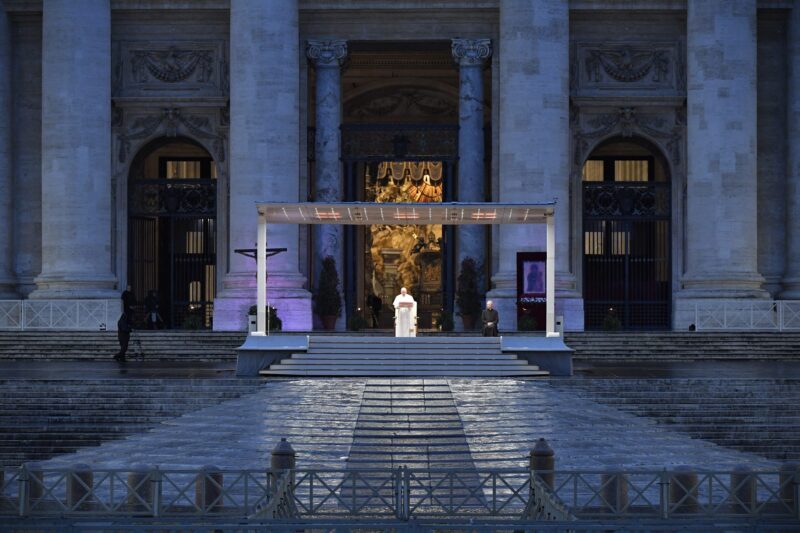
Like many Toronto Catholics, I began my observance of Holy Week this year in front of my family’s television, watching the Cardinal’s celebration of Palm Sunday in St. Michael’s Cathedral. A little over a week earlier, on March 27, I sat transfixed in front of my laptop computer as the pope pronounced a special Urbi et Orbi blessing to an eerie, empty St. Peter’s Square. My devotional life has moved nearly entirely online.
Catholics, of course, are not unique in this respect. Consider an “e-Satsangh” hosted on Facebook Live by the New York City-based Hindu movement Sadhana on April 2. In this event, a pandit offered a ritual puja in his apartment, presenting Sanskrit verses, water and other offerings to several Hindu deities well suited to the present crisis. These included the elephant-headed god Ganesha from a local temple in Flushing, New York; Arogya Lakshmi, the Goddess in the form of mother, health and power; and Sudarshana Vasudeva Dhanvantari, the god Vishnu in the form of a medicine healer. Following the puja, from a different apartment, one of Sadhana’s co-chairs guided virtual participants in a short meditation and hymns for the flourishing of all living beings. Discussion followed, ranging from the visceral—one participant sought advice on grieving the loss of a friend to COVID-19—to broader questions of advocacy and political organization. The focus here was on action: pragmatic service to those who are vulnerable, and also ritual action for their health and well-being.
Still more direct is the approach taken by residents of the Indian city of Mumbai, according to a widely circulated report. There, it seems, the Novel Coronavirus has been personified as an antigod or demon (asura). On the eve of the popular festival of Holi, effigies of this antigod—called Coronasur—were created and ritually destroyed, in an effort to halt the virus.
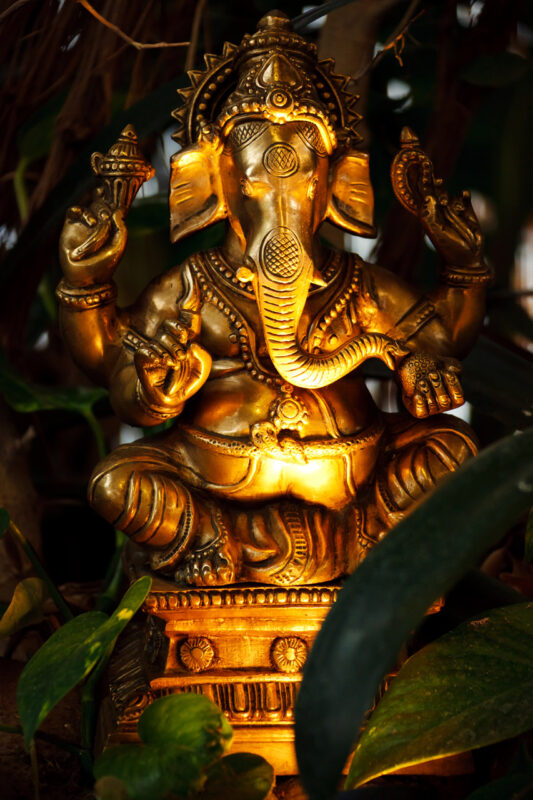
As a Catholic, I admit some discomfort with these rites, at several levels. But, also as a Catholic, I am obliged to approach such discomfort with an attitude of dialogue and exchange, rather than fear or condemnation. What might I learn from my Hindu neighbours about being a person of faith in this time of pandemic?
I think that the examples of Sadhana and even the Coronasur effigy offer an important reminder that Catholics, no less than Hindus, believe in the authentic power of ritual prayer. When Pope Francis raised the Blessed Sacrament and pronounced the Urbi et Orbi blessing on March 27, he was flanked by two icons that had defeated plagues in the past, Mary Salus Populis Romani and the Crucifix of San Marcello. This was a spiritual blessing, to be sure, an indulgence for those unable to receive the Rite of Reconciliation. But it was also an invocation of the power of God to intervene on behalf of those who are sick, and to arrest the devastation of COVID-19.
In the present crisis, some voices on the secular left and the religious right have called persons of faith to make a false choice: to follow the recommendations of public health officers, or to trust in the power of our shared prayer. Most Catholics, like most Hindus, refuse this choice. We embrace both the best science and the deep wisdom of our ritual traditions.
And so we vacate our churches and temples, and even St. Peter’s Square, to “flatten the curve.” But that need not, and cannot, stop us from persisting in our prayers. In this, Catholics, Hindus and many other others stand together, even while we are alone.
Read other InsightOut posts.
Dr. Christopher E. De Bono is Vice President of Mission, People and Ethics for Providence Health Care (PHC) in Vancouver. A practical theologian, a Clinical and Organizational ethicist, and a certified Spiritual Care chaplain, Christopher earned his BA and PhD at St. Michael’s.
A Novel Ritual for a Novel Virus
In the densely apartment-laden West End of Vancouver where I live, a ritual erupts every night at 7, when for between three and five minutes, people open their windows, go to their balconies, or congregate at a safe distance on the rooftops of their buildings. Why? To make a lot of noise.
Some clap, others shout. Many just bang kitchen pots and pans. Some even bring loudspeakers and drums and beat out a rhythm.
The result, which you might think should be cacophonous, is neither harsh nor discordant, but almost harmonious. I find it strangely comforting. And it has become something I prepare for every night.
But before I decided to become an active participant, I first heard this now-ritual noise-making on my walk home late in the evening. It was early in this crisis. After a long day working in health care to “flatten the curve” and to plan for those who would soon arrive at our hospitals with the novel corona virus, I wearily headed home for some much-needed rest.
As I left the hospital, I found myself surrounded by the noise of this novel ritual that has emerged as a reaction to a novel virus. Immediately I felt deeply happy, more resilient. I felt proud to hear the community acknowledge so many courageous frontline staff in acute and community care, so many researchers seeking solutions, and so many long-term care staff courageously limiting the spread among those individuals most at risk.
As a senior leader at Vancouver’s Providence Health Care, a Catholic health system famously known for its downtown St. Paul’s hospital and its long history of innovative work with marginalized groups, I already felt called to do my best. I also already knew the seriousness this novel virus posed and continues to pose.
So while we—and so many health care and essential care workers across the country—continue to work tirelessly to prepare for the surge, planning for the worst while hoping for the best, I take solace in this noisy and celebratory end-of-day ritual.
As a practical theologian, I am reminded of what I learned during my undergraduate and post-graduate student days at St. Michael’s: Rituals bring comfort. Rituals help us find meaning. Rituals bring connection. Rituals also give us a sense of control, because they are predictable.
Right now, we need all four of these things. This new virus has disrupted our comfort and has destabilized our sense of who we are. It has interrupted our very ability even to be physically close to human beings. It has increased our feelings of helplessness. And so much more. And this is why I am grateful for the creativity, hope and affirmation this new ritual offers.
A novel virus needed a novel ritual.
Read other InsightOut posts.
University of St. Michael’s College President David Sylvester is pleased to announce the appointment of Dr. John McLaughlin to a two-year term as Interim Dean of the Faculty of Theology, effective July 1, 2020.
Dr. McLaughlin served as the Faculty’s Interim Dean in the 2014-15 academic year prior to Dr. Ginther’s arrival.
“St. Michael’s is fortunate to have such a capable administrator with a strong familiarity and history in the Faculty” says Dr. Sylvester. “Dr. McLaughlin’s presence in the Dean’s office will help make this process seamless, and I look forward to working with him in this role.”
A professor of Old Testament/Hebrew Bible, Dr. McLaughlin earned a BA from St. Thomas University in Fredericton, NB before enrolling at the University of Toronto, where he earned an MA in Philosophy. He then studied Theology and Scripture at St. Michael’s Faculty of Theology, earning an MDiv and a PhD.
Professor McLaughlin joined the St. Michael’s faculty in 2002 after teaching for seven years at Wheeling Jesuit University in Wheeling, West Virginia. He is an Associate Member of the Graduate Faculty with the Department of Near and Middle Eastern Civilizations at U of T, and is a past President of the Canadian Society of Biblical Studies. He currently serves on the Editorial Board of the Journal of Hebrew Scriptures and as an Associate Editor of the Catholic Biblical Quarterly.
Current Dean Dr. James Ginther completes his five-year term on June 30 of this year. After a 12-month research leave, Dr. Ginther, a mediaevalist and historical theologian, will return to the Faculty to teach and conduct research.
Dr. Sylvester has expressed his gratitude for Dr. Ginther’s service over the course of his term in the Dean’s office. “I would like to thank Dr. Ginther for his tremendous service to our community as a member of the President’s Advisory Group and Senior Administration team, in his leadership within the Toronto School of Theology, and in many other collaborative initiatives, including in his field of expertise at the Pontifical Institute of Medieval Studies and the Centre for Medieval Studies,” he says. “I look forward to Jim’s return to campus following his leave and to his renewed leadership at the University.”
Fr. Gustave Noel Ineza, OP, is a doctoral student at St. Michael’s Faculty of Theology. Born and raised in Rwanda, he lived through the 1994 genocide against the Tutsi and went into exile for a month in what was then Zaire. His family left the refugee camps and returned to Rwanda after three members of his family developed cholera. He studied in the minor seminary and joined the Dominican Order in 2002. He studied Philosophy in Burundi, and Theology in South Africa (SJTI/Pietermaritzburg) and the UK (Blackfriars/Oxford). Ordained in 2014, he worked for Domuni (www.domuni.eu) and was a chaplain to university and high school students. In 2018, he came to Canada to pursue studies in Christian-Muslim dialogue. He is currently reading on post-colonial approaches to the taxonomies assigned to religious traditions (Muslims and Christians) by colonial powers in Rwanda.
In Solidarity with the Suffering
When it was announced in Canada that COVID-19 was knocking at the door, multitudes rushed to shopping malls to buy as many provisions as they could, to be “prepared” for the pandemic. One item in particular was a major target of the worried crowds: toilet paper. Looking at images of people with trolleys full of toilet paper, one thought came to mind: “People are planning to eat a lot.”
I was reluctant to write this post because it is not easy to introduce a distressing subject in the middle of a global lockdown caused by a pandemic. It would be adding distress to distress. However, anyone interested in humanitarian crises has to know that disasters differ in intensity.
As I write this reflection on April 7, the whole world has started commemorating the Rwandan Genocide against the Tutsi, one of the worst genocides of the history of the world. Twenty-six years ago, in 100 days, about a million people died in a genocide, yet the rest of the world seemed disinterested by — or unaware of — what was happening there. Nations sent contingents of soldiers to Rwanda to remove their citizens from what the world knew to be genocide while at the same time trying to ignore the plight of the Tutsi for reasons no one has yet managed to logically explain to me.
After the genocide, masses of Rwandans moved to what was then Zaire – now, the Democratic Republic of Congo – seeking refuge. For a couple of weeks, we thought the world did not know that Rwanda existed. I was 11 years old.
Today, as the world closes in on itself to fight a ruthless pandemic, it is easy to forget there were ongoing crises around the world before COVID-19. No one forgot, I suppose, that Syria was in the middle of a bloody war, that Yemen never saw the end of another almost internationally ignored horrific conflict.
As a young child in Rwanda during the genocide, I would spend the day looking up at the sky to see if planes would bring United Nations troops. A few months later, in the refugee camps, I saw UN workers and knew we would get food soon if cholera did not first decimate my family, as three members were already infected. There was hope because, at that age, I knew that there were not so many crises going on in the world. I can imagine there is nothing as frightening as knowing that you may die soon of hunger or be killed, and that no one will even know about it because the whole world is afraid of something you consider a minor threat to you in light of all the other challenges and threats you face. Today, the UN relief agency UNHCR and other humanitarian organizations are reminding people that crises are still happening around the world and that charitable people should not forget those who are hungry, in refugee camps,or being persecuted because they belong to minorities.
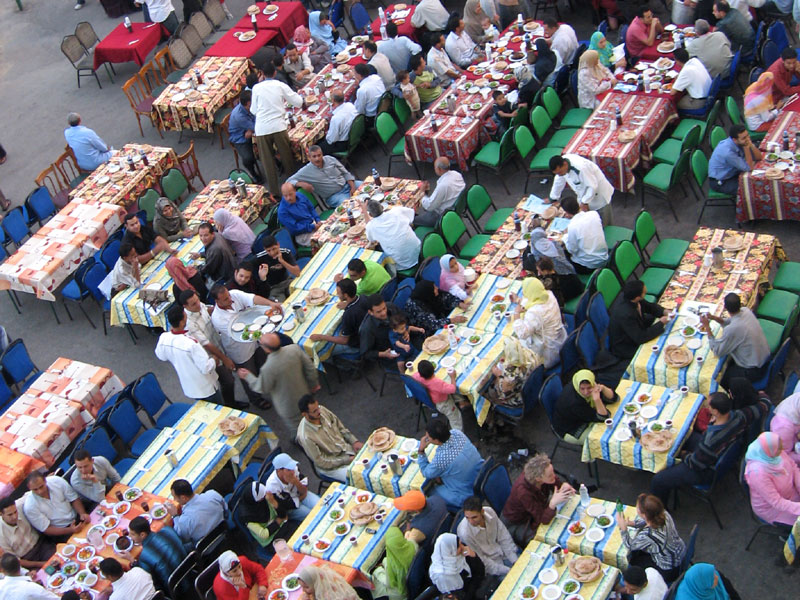
Consider this pandemic as experienced by poverty-stricken families in extremely poor countries. After the confinement began in Canada, it took only a couple of days to have African countries announce total lockdowns. In most African countries, a lockdown means staying inside your compound-house, your hut, or just in a small house that hosts more than eight people. A five-week confinement without a job for a family of five is nothing less than a death sentence. Fortunately, some countries have started distributing food, but very few people manage to get it. Worse, all those without homes and who had relied on charitable people’s provisions will have to find other means to feed their families. The city of Cairo has announced that the famous charity tables (mawa’ed al rahman) that adorn the streets during Ramadan for poor people to eat after a day of fasting were not going to be set this year. Having been in Cairo during the 2012 Ramadan month and having shared food at Al Abbasiah and Midan Al Tahrir with people from all strata of society, I understand how this will impact poor communities.
It would be inconsiderate to end without mentioning another shared worry for African people around the world. Two French doctors, Dr. Jean-Paul Mira, head of the Intensive Medicine and Intensive Care units at Cochin Hospital, and Professor Camille Locht, director of research at INSERM, discussed on a French talk show the plausibility of testing COVID-19 vaccines on the African continent. The suggestion raised an outcry from many who did not grasp there are many other places where testing is in progress. The overall perception from both ordinary people and many African celebrities, including the WHO’s Director-General Mr. Tedros Adhanom Ghebreyesus, was that Africa would once again be that continent where people are considered lab-rats, where foreign countries go to test their unsure economic and political theories, drugs, or just to dump hazardous industrial wastes. The WHO Director-General called those French doctors’ attitudes a colonial hangover. Whatever intention those doctors had, their statements were inappropriate enough to worry an entire continent and all those who care for its inhabitants. Would that mean that when a vaccine is finally discovered African countries will still need to overcome trust issues before making it available to their people?
As we struggle to accommodate the strenuous new routines caused by home confinement, let us think of all those dealing with COVID-19 while facing greater and deadlier calamities. May solidarity with those who suffer be the major lesson we may take from these distressing times.
Read other InsightOut posts.
Because public masses have been cancelled due to the coronavirus pandemic, Dr. Darren Dias, O.P., has shared his homily for Easter.
Dr. Dias teaches in St. Michael’s Faculty of Theology, specializing in Trinity, Religious Diversity, and teaching methods. He is currently working of a SSHRC funded project with colleagues Gilles Routhier (Laval) and Michael Attridge (St. Michael’s) entitled: “One Canada Two Catholicism: Divergent Evolutions in the Catholic Church in Quebec And Ontario, 1965–1985.”
Seeing the God of Life
Easter Morning: John 20:1-18
The resurrection narrative of John’s Gospel account centres around the words “saw/look.” In the lection today we hear multiple instances. Mary Magdalene arrives in the dark, sees the stone removed from the entrance from the tomb and runs. The beloved disciple sees the wrappings in the tomb, but does not enter; he stops at the entrance. Peter goes into the tomb and sees the wrappings and the cloth rolled up. And then the beloved disciple enters the tomb and sees and believes. Mary stands outside the tomb weeping, and looks in and sees two angels there; she turns and sees Jesus but does not recognize him. And what are Jesus words to her?: “Whom are you looking for?” And when Mary realizes that she has encountered the risen Jesus she declares: “I have seen the Lord.”
The contrast of light and darkness, blindness and sight runs throughout John’s Gospel account. Today we discover what, ultimately, John is speaking of: the darkness of Good Friday to the brightness of Easter; from Mary initially arriving at the tomb in the dark, a darkness that left her unable to see, to her encounter with the light of the risen Christ that enables her to declare: “I have seen the Lord.”
Mary’s declaration is not only testimony of the man Jesus being raised from the dead, but a witness to something more. Indeed, the God and Father of the risen Lord is our God and Father, too. A new relationship has been established in the cross and resurrection that we have all been made children of God: “I am ascending to my Father and your Father, to my God and your God.”
Celebrating Easter during the global COVID-19 pandemic raises many questions for us. Some of us stand at the entrance of the tomb staring in; some are looking at the linens confused; some have witnessed miracles and are still unsure of what’s going on; some have had a profound encounter with the Lord and don’t know which way to run. Each of us is on a unique journey of faith, a journey that is a constant back and forth from the darkness of Good Friday to the light of Easter. We all stand in the empty tomb this morning and ask ourselves: what’s going on? What could this mean?
In the midst of a health crisis that has resulted in suffering, illness, anxiety, and death, a situation that has affected every aspect of our daily lives —even our ability to celebrate Easter as we normally do—it may seem difficult to find God. But our narrative today reminds us that we are often unaware that what we are looking for in right in front of us. Like Mary who is looking for the dead body of Jesus when she is staring right at it—fully alive. The resurrection surely teaches us that ours is a God of surprises. None of Jesus’ followers ever expected him to be crucified, and even less could they imagine a resurrection. The God of life is often revealed in the places and spaces beyond any expectation or imaginings.
Today we stand at the entry of the empty tomb, the linens are wrapped up, and we don’t quite know what to make of things. All the resurrection accounts we read this Easter season are the stories of coming to see with the eyes of faith, whether Doubting Thomas next week or the Emmaus narrative the week after.
This morning the reality of the empty tomb confronts us. The experience of the risen Lord and the reality of COVID-19 empower us to see the world and our own lives like never before; to declare: I have seen the Lord.
Dr. Jean-Pierre Fortin is Assistant Professor of Practical Theology in the Faculty of Theology. Dr. Fortin teaches the Theology of Ministry and Reflection Seminar classes and also oversees field placements, an essential aspect of the Master of Divinity and Master of Religious Education programs at the Faculty. His research includes work in ecumenical dialogue.
Challenging Our Usual Ways of Living
According to the Gospel of John, when Jesus is brought before Pontius Pilate, he tells the Roman governor: “For this I was born, and for this I came into the world, to testify to the truth. Everyone who belongs to the truth listens to my voice” (John 18:37, NRSV). Jesus was born, came among us to bear witness to the truth. For Christians, who profess to be followers of Jesus, a fundamental task and challenge is to bear witness to Jesus. As it invites us to experience and celebrate the mystery of Christ’s Passion, death and resurrection in particular fashion, the Lenten/Easter season is a most suited time for us to reflect on the quality of the witness we bear to Christ.
The current COVID-19 pandemic has so challenged our usual ways of living, relating to, and serving one another that we are summoned to be creative and devise new ways of being faithful disciples of Christ. What does it mean to bear witness to Christ, celebrate and give praise to him in times of social distancing and isolation? How is the truth about the human condition (flaws and blessings) unveiled when humankind is confronted with challenges such as a global viral pandemic?
The recent closing of the USMC campus and the transfer of courses to online platforms have enabled me to witness both the turmoil that such a sudden change creates: administrators, professors, staff and students struggling to learn how to give/take courses, hold/participate in meetings, and host all sorts of academic activities online. The cancellation or postponing of so many public events, lectures, conferences, liturgies—even pub nights—led me to perceive that this year’s Lenten season would in a very real sense last much longer than 40 days. The extent of the transformation to which my working environment was being subjected fully came home when I realized I no longer had access to campus libraries and my office. At the same time, I have also witnessed how instructors and students have managed to break through technological walls to recreate communities of learning that enable insightful reflection and sharing.
In a time such as this, when we are likely to feel deeply unsettled, inadequately equipped, and summoned to take initiative and exercise leadership in unprecedented ways, we may relate to Pontius Pilate, who admits to being profoundly challenged by the person and words of Jesus when he responds to his testimony with an honest question: “What is truth?” (John 18:38) Pilate opens himself to the fact that he is encountering a reality he did not foresee. This encounter with truth in person may alter who he is in profound ways.
During this Holy Week and the following Easter season, then, as we face the COVID-19 pandemic, we may reflect on the ways Jesus questions our assumptions about our usual way of living and following him. We may also think about the questions we have been carrying with us for some time (perhaps a long time) which we know we should ask to Jesus in person. What are the questions that would liberate us, allowing us to pursue the truth revealed in Jesus in more faithful, complete fashion—especially now, in challenging times? We may bring these questions before Jesus in our prayer, with the desire and hope of being transformed so as to be able to bear witness to the truth that he is in and for times such as these.
Read other InsightOut posts.
Because Sunday Mass has been cancelled due to the coronavirus pandemic, Dr. Darren Dias, O.P., has shared his homily for this, the Fifth Sunday of Lent.
Dr. Dias teaches in St. Michael’s Faculty of Theology, specializing in Trinity, Religious Diversity, and teaching methods. He is currently working of a SSHRC funded project with colleagues Gilles Routhier (Laval) and Michael Attridge (St Michael’s) entitled: “One Canada Two Catholicism: Divergent Evolutions in the Catholic Church in Quebec And Ontario, 1965–1985.”
Tears of Compassion
John 11:1-45
“Jesus began to weep” is the shortest verse in the NRSV English translation of the New Testament. Yet this short verse says something terribly important about Jesus and his solidarity with us in our moments of difficulty and suffering.
In John’s Gospel account, Jesus’ friend Lazarus is ill and Jesus is summoned to his side by his sisters, Martha and Mary. But instead of hurrying to be with them, he waits another two days. He says that the death of Lazarus is an occasion for Jesus to be glorified. Jesus confidently refers to Lazarus’ death as “merely sleeping” and even says, “I’m glad I was not there so you may believe.” Jesus is strangely sanguine about his friend Lazarus’ death.
But as Jesus’ gets closer to the tomb, he becomes increasingly emotional. Twice, the Gospel lection says, “Jesus was greatly disturbed.” And then he began to weep. But why how do we account for this change of emotional state? One moment he seems placid and confident and the next he weeps. Does Jesus not think he will be able to “awaken” Lazarus anymore? Does Jesus suddenly doubt the life of the resurrection? Or the power of God to be glorified? Why the change?
In the Gospel lection, we read that “When Jesus saw Mary weeping, and the Jews who came with her also weeping, he was greatly disturbed in spirit and deeply moved…Jesus began to weep.” It was in his encounter with those who suffered loss and were grieving that Jesus began to weep. He is not weeping for Lazarus. He is weeping with, sharing in the suffering of others. Compassion is the source of Jesus’ tears.
Though Jesus is confident in his belief in the life of the resurrection, it doesn’t negate the real suffering of those who loved Lazarus, his sisters Mary and Martha, their friends, and Jesus himself. At the coming celebration of the Lord’s Passion on Good Friday we will read about Jesus in the letter to the Hebrews: “For we do not have a high priest who is unable to sympathize with our weaknesses, but one who has similarly been tested in every way.”
Compassion comes from the Latin word “to suffer with.” We often experience the suffering of others, whether vicariously or else because we have memories of similar suffering. Suffering is part of our human condition. And solidarity in suffering reveals the depth of our humanity.
The current COVID-19 crisis reminds us how interconnected the human family really is. We are “deeply moved” by the dedication of medical professionals and other front line workers. When I’ve gone to the store to buy necessities, I’ve been struck by the friendliness and dedication of workers in drugstores and grocery stores in very difficult circumstances. We are “disturbed in spirit” by the lack of ventilators for all those who may need them. We “weep” at the deaths of so many around the world, and of their families who are unable to bury them at this time. We are experiencing a deep sense of togetherness around the globe because we are all affected, and we all wait with some anxiety, for an unknown future. As we stand at the entry of the tomb, we ask what will Easter look like this year.
Our Gospel lection today reminds us that the God of life is not unaffected by our situation. Indeed “the Christ, the Son of God, the one coming into the world,” our “high priest” weeps with us, with compassion for the suffering, anxious, sorrowful and grieving.
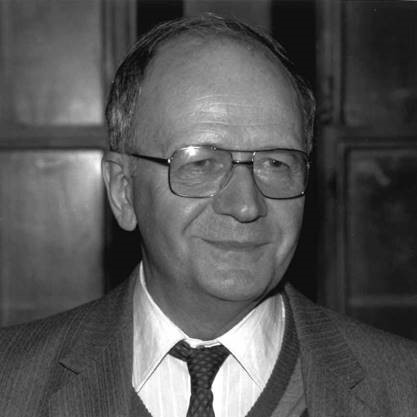
The Pontifical Institute of Mediaeval Studies (PIMS) is mourning the death of long-time faculty member Fr. Édouard Jeauneau, who died at the age of 95 on Monday, Dec. 9, 2019 in Chartres, France.
Fr. Jeauneau was a Professor of Medieval Philosophy at PIMS and the Centre for Mediaeval Studies (CMS) at the University of Toronto from the 1975 through to 1995. He was named Institute Professor at PIMS in 1990 and was awarded an honorary doctorate in 2002.
His involvement in the medieval community in Toronto began following a formal invitation in 1974 to join the PIMS Faculty from Rev. E.A. Synan, Praeses, and Rev. James McConica, CSB, Chairman of the Search Committee.
Until 2015, he spent about eight months each year working on his many projects here in Toronto, most notably the five-volume Periphyseon of Johannes Scottus Eriugena (Turnhout: Brepols).
Fr. Jeauneau was consistently awarded substantial Social Sciences and Humanities Research (SSHRC) grants, and hired a long string of Centre students to work for him, paying them generously. He also trained many of these students in reading the particular handwriting in the manuscripts and in editing the texts.
Among the honours bestowed on him over the years was the position of Directeur de Recherche Honoraire au CNRS in Paris, France’s National Centre for Scientific Research, and an appointment as a fellow of the British Academy.
A funeral Mass will be held Monday, December 16 in his small home town of Coudray-en Perche, about 60 km from Chartres.
His presence will be missed by all who knew him.
In her own student days, Dr. Colleen Shantz would occasionally find herself hung up on a phrase sometimes heard in classrooms: “Scholars used to say…”
Her response? If past theories on a subject could be superseded or dismissed, “what makes this one more reliable?”
Now an associate professor of Christian Origins and Biblical Studies in the Faculty of Theology at the University of St. Michael’s College, Dr. Shantz has taken those thoughts and applied them to her chosen field. Much of her research focuses on how experience, whether emotional, ritual, or social, helped to form early Christian communities.
While confessing that she values the historical-critical method of Scripture study, which sees scholars work to place a text in its original context in an attempt to glean further information, she argues that relying solely on one method to learn about the Bible runs the risk of putting a box around the subject, confining it.
Instead of thinking of Scripture study strictly as a trajectory, with progress toward greater and greater truth, she argues we also need to engage with “what aches, what’s messy” in order to answer the questions of our own time.
“Instead of progress measured, we should be asking what we need to be in richer relationship with subjects,” she says.
This is precisely the approach Dr. Shantz will use when she delivers the 10th annual Meagher Lecture on Thursday, Nov. 28 at 7 p.m. in Charbonnel Lounge.
Her paper, titled “Did Early Christians Believe the Bible?’ will look at the early Church and how its members’ experiences can help us understand how to be Christian in a more meaningful way today.
“Religion is more than doctrinal statements. Systematics is the captain of the theology ship with its rational, propositional approach but religion is also far more – imagination and affect, for example,” she says. “Doctrine alone doesn’t help us to understand why people are religious—either in the ancient world or now.“
As an example, she cites St. Paul’s reference to the “parousia”, a term that would have had significantly different symbolism to the early Church than it would today. Where, she asks, is the common ground, the field of play that brings Scripture alive to those engaging with it today? A key part of the answer, she argues, comes from the transfer of emotion, allowing modern readers and listeners a sense of what early Christians took away from Scripture.
Dr. Shantz describes herself as having “lived my way in” to her current field. She began her post-secondary studies in medical science, with thoughts of pursuing physiotherapy or a related career, but the religious studies electives she took during her B.A. were a powerful influence, leading her to switch her focus and pursue a Master of Divinity degree at what was then Waterloo Lutheran Seminary.
Having decided on a career in youth ministry – “I had this ongoing sense I wanted to be helpful” – she found that professors were encouraging her to carry on her studies. In time, she realized that “there are always more questions to ask” and opted instead to pursue her doctorate at St. Michael’s Faculty of Theology, focusing on the role of feeling and meaning as a way to connect modern Christians with an ancient document.
Today, as well as a member of St. Mike’s Faculty, Dr. Shantz also serves as Director of the Graduate Centre for Theological Studies at the Toronto School of Theology.
In explaining her choice of topic for the Meagher Lecture, she notes a decrease in active engagement with the Bible, citing, for example, a documented drop in applications to do doctoral work in Scripture.
But the Bible is living, breathing document, she argues, and we need to offer different modes of engagement to ensure the transfer of feeling – and thus, understanding.
“We need to reframe the field of play to make space for meaningful questions,” she says.
The Meagher Lecture takes place Thursday, Nov. 28 at 7 p.m. in Charbonnel Lounge, 81 St. Mary St., Toronto. The lecture is open to all. Refreshments to follow.
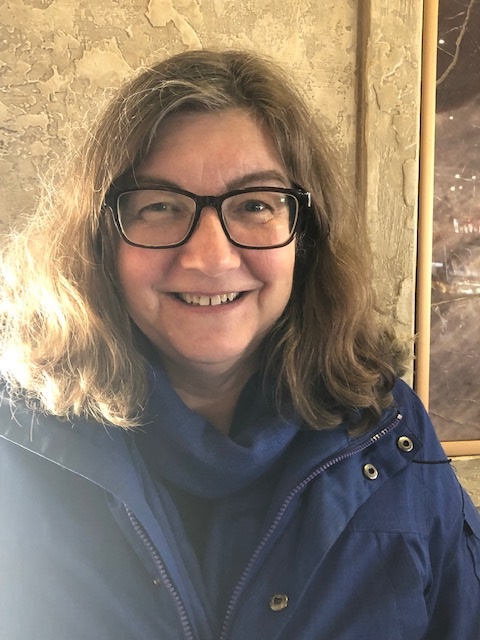
If there’s a club for people holding three degrees from St. Mike’s, move over and make space for the newest triple alumna, Rosemary Boissonneau.
Rosemary will be awarded her MA in Theological Studies from St. Michael’s Faculty of Theology on Saturday, Nov. 9, 2019, having received a Master of Theological Studies in 2017, and a BA, with a major in French and a minor in English, in 1987.
“It was interesting when I came back to St. Mike’s (in 2011) because I was a mother and a teacher and my oldest was in university herself,” she recalls. “What I found was the same hospitality, the same sense of welcome as my undergrad days, but because the Faculty of Theology is small, the sense of community was more pronounced, the sense of Catholicity more informed.
“There’s a real sense of identity and, given the size of the place, it’s easy to get to know people.”
The faculty impressed her for multiple reasons. One of the first courses she took when she returned to school was with Old Testament scholar Dr. John McLaughlin, who, as Rosemary describes, “sets rigorous standards” not only for the content of work submitted but also in his expectations regarding the mechanics of papers. They were standards, she notes, that she applied to all subsequent work to ensure she was meeting the McLaughlin bar and making the most of her education.
There was the fact that classroom topics would be addressed from a range of viewpoints, whether it was one of feminist theology or eco-theology, as well as the expectation that students would use inclusive language as much as possible.
She had the opportunity to learn the workings of a university by serving a term as a student representative on the Collegium, St. Michael’s board overseeing governance of the university.
And then there was Eco-theology Faith and Practice, a week-long course held at the Villa St. Joseph Retreat Centre in Cobourg, taught by Sisters Linda Gregg and Mary Rowell, CSJ. The course confirmed Rosemary’s interest in eco-theology, and led her to studies with eco-theologian Dr. Dennis O’Hara at St. Michael’s Elliot Allen Institute for Theology and Ecology.
“I always cared about the environment but the summer after Laudato Si’ came out I saw Dennis on a panel, which included a talk about the need for climate activism, and since I was working half-time to complete my studies, I felt I had the time to get involved.”
Her goal was to combine spirituality with justice, and that led to her work with ClimateFast, a volunteer organization whose goal is to encourage politicians to take greater – and faster – action on climate change, as well as work with #FridaysforFuture, the group behind the student climate strike.
It also played a hand in her MTS thesis, entitled The Christological Symbolism of Water in the Gospel of John.
“Rosemary is not merely intelligent but also thoughtful and morally motivated. She cannot only grasp complex ideas but she reflects on them in order to integrate them with other knowledge that she has gained,” says Dr. O’Hara. “This invariably prompts her to action, to reframe her own life and encouraging others to follow suit in their own way. She will willingly pay the price for a right course of action. This is why most professors relish her presence in class.”
Reflecting on her time at the Faculty, Rosemary says it enhanced her worldview.
A deeper understanding of Scripture, for example, has “helped me articulate what I believe,” she notes.
It has also left her an even busier woman, because even though she’s back to teaching full-time, she’s finding it impossible to set aside the volunteering she started when she was working reduced hours to complete her studies.
As she talks about finding a way to balance the rest of her life with the possibility of returning to do doctoral work, there’s little doubt she’ll find a way.
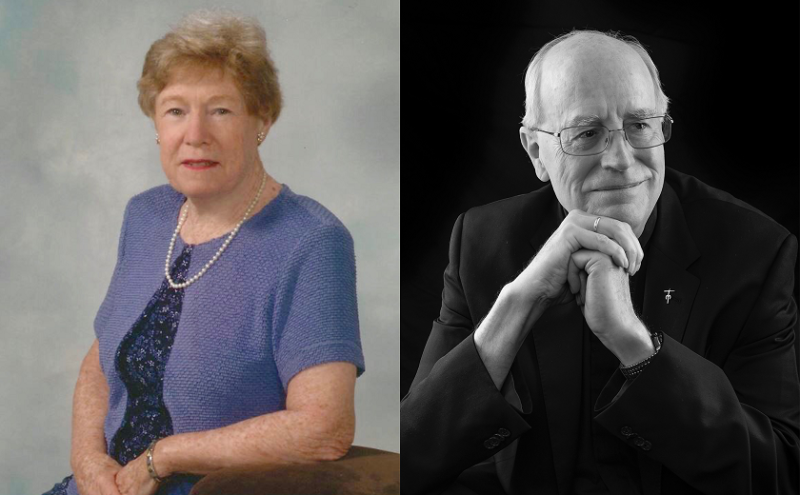
At the Faculty of Theology and Continuing Education Division’s 2019 Fall Convocation, not only will new scholars receive degrees qualifying them to conduct high-level research and teach, but two already-accomplished scholars will also receive special honours in recognition of their longstanding contributions. This year’s honorary degree recipients are Dr. Catherine B. Shannon and Dr. James Heft, SM (Marianist), both prolific researchers, writers and educators whose work embodies the ideals of the University of St. Michael’s College.
Dr. Shannon graduated from St. Michael’s with a B.A. in History in 1960, and went on to become a historian of Northern Ireland. In addition to her research on the historical roots of partition and the Northern Irish conflict, she worked to organize conferences and symposia during the 1980s and 1990s to promote dialogue between nationalist and unionist politicians. She has written on the impact of the conflict on Northern Irish women, and convened two conferences where women from Northern Ireland and the Republic discussed their aspirations for peace and their roles in achieving it.
In addition to her scholarship and advocacy, Dr. Shannon has served as a guest historian for museum and historical society exhibits. She has also served on the Executive Board of the American Conference of Irish Studies for over a decade, and has served as president of the Eire Society of Boston and the Charitable Irish Society of Boston.
Dr. Heft is a priest in the Society of Mary and has been a leader in Catholic higher education for over three decades. He received his MA in 1971 and his PhD in 1977 from the Faculty of Theology at St. Michael’s. For years, he served in a variety of teaching and administrative roles at the University of Dayton, where he chaired the Theology department before working as provost and then university chancellor. He departed in 2006 to found the Institute for Advanced Catholic Studies at the University of Southern California in Los Angeles.
The author or editor of 13 books on topics ranging from intellectual humility and interreligious dialogue to Catholic higher education, Dr. Heft has also published over 175 articles and book chapters. His book Catholic High Schools: Facing the New Realities (Oxford, 2011) was listed as a best-seller in a recent Oxford catalogue, and a new book on the future of Catholic higher education is under review with the same press. In recognition of his long and distinguished service to Catholic higher education, in 2011 the Association of Catholic Colleges and Universities made Dr. Heft the recipient of the Theodore M. Hesburgh award.
For their many contributions and accomplishments, Dr. Shannon will be conferred with a Doctor of Sacred Letters, honoris causa and Dr. Heft will be conferred with a Doctor of Divinity, honoris causa on Saturday, November 9 during a joint convocation for the Faculty of Theology and Continuing Education Division at St. Basil’s Church. A reception will follow in Fr. Madden Hall.
A list of all past recipients of honorary degrees from the University of St. Michael’s College can be found here.
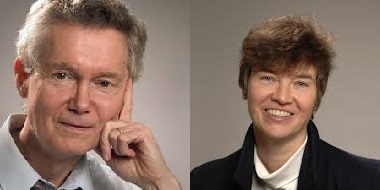
Dr. Margaret O’Gara was a doctoral candidate and Dr. Michael Vertin a professor of philosophy at St. Mike’s when the two wed at St. Basil’s Church in 1976. Over the course of 36 years of marriage not only did each become a legendary professor at the Faculty of Theology, with Dr. O’Gara known around the world for her work in ecumenism and Dr. Vertin for his expertise in Bernard Lonergan, but they amassed a remarkable – and sizeable – library.
Now in the process of downsizing following Dr. O’Gara’s death in 2012, Dr. Vertin has donated an estimated 900 books from the couple’s individual and shared collections to this year’s Friends of the Kelly Library book sale. The sale runs Sept. 24 to 28 in Carr Hall (100 St. Joseph St.).
The works donated from the couple’s library, carefully packed up by Dr. Vertin and delivered to volunteers in 40 bankers boxes, include books on everything from ecclesiology and ecumenism to scripture, patristics, and the philosophy of religion. Many of the items resided for years on simple pine book cases that Dr. O’Gara had built herself, an accomplishment, Dr. Vertin notes, that she felt quite pleased about.
When asked, Dr. Vertin notes there were some items he was unable to part with, including his 25-volume series on Lonergan, complete with its “red U of T Press binding.”
The annual used book sale, organized by the Friends of the John. M. Kelly Library, is designed to raise funds for the library, with proceeds earmarked for such projects as physical improvements, technology upgrades, and adding to collections.
Along with the Vertin/O’Gara donation, this year’s sale will feature a range of shopping options from first editions and art books through to academic works and pleasure reads.
Dr. Tamara Grdzelidze’s career has taken her from the Geneva offices of the World Council of Churches to Rome, where she served as the Georgian ambassador to the Vatican from 2014-2018. Now, her latest travels have brought her to Toronto as the Aileen Driscoll Research Fellow in Ecumenical Theology at the University of St. Michael’s College.
Midway through her year-long appointment, Dr. Grzelidze is delighted to be following in the footsteps of legendary St. Mike’s professors and conducting research at a university known for its work in ecumenism — even though her arrival on campus this past January was something of a shock.
“Certainly I knew cold. I’d been to the Alps, for example, “she laughingly recalls. “But I didn’t know what (a wind chill of) -32 felt like!”
Still, everything from conversations with Dennis Savoie, Canada’s ambassador to the Holy See, to her work at the WCC helped convince her that St. Michael’s was a logical place for her to further her work on ecumenism.
“I was familiar with some of the big names who taught at St. Mike’s – Margaret O’Gara and Étienne Gilson, for example – and I knew U of T is a very good university,” she says. “From my work with the World Council of Churches I knew that, ecumenically, (Canada) is very strong.”
The project she is working on while at St. Mike’s stems from concerns over the fallout for various Orthodox churches in the wake of the 2018 decision by the Russian Orthodox Church to sever ties to the Ecumenical Patriarchate of Constantinople, which historically has held a special place in the Eastern Orthodox world. The break came last October after Constantinople granted the Ukrainian Orthodox Church autocephaly, or permission to operate independently from Moscow.
“Having lived various places this is painful for me. Borders are not so precise,” says Dr. Grdzelidze, who is organizing a conference to take place at St. Mike’s in June, 2020, titled Boundaries of the Christian Faith in the 21st Century: Intersecting with Borders of Geography, Cuture and Theology. Earlier this year, for example, she delivered a paper, ‘National Borders of the Orthodox Church,’ at a conference in Romania.
“Ecumenism is not only about knowledge but about experience, just as theology is not just about patristics,” she explains. “It is about seeing how people interact; it serves as a compass to understand others’ beliefs, their passions.”
In the coming Fall semester, Dr. Grdzelidze will teach The Ecumenical Theology: Division, Difference, Dialogue, a course that will examine some of the major themes related to the impact of inter-church dialogue and action on theological reflection.
Educated in Tbilisi State University in Georgia, St. Vladimir’s Orthodox Theological Seminary in New York, and Oxford, Dr. Grdzelidze has taught around the world, including St. John’s Theological College in Auckland, Trinity College Dublin, and the Angelicum in Rome.
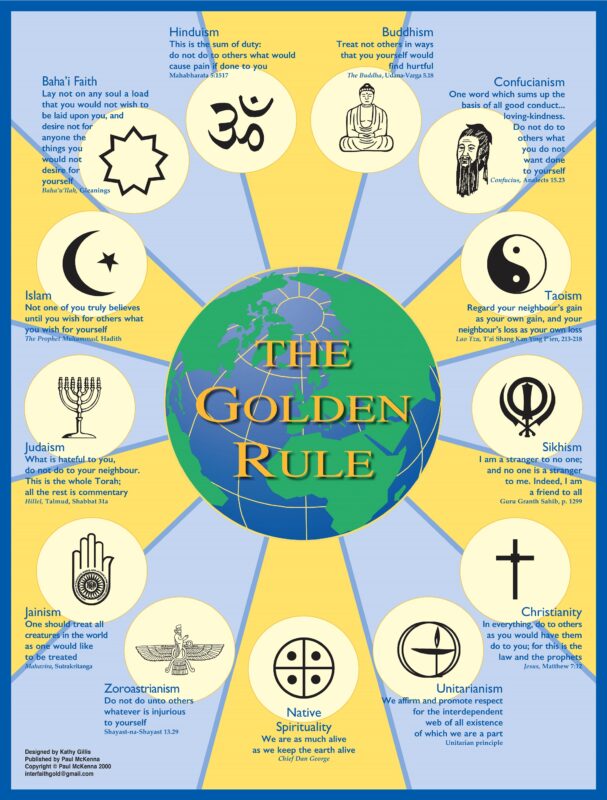
This Fall will see courses on indigenous spirituality, religion and migration, and Catholic perspectives on interfaith dialogue as the Faculty of Theology launches its new Diploma in Interfaith Dialogue.
Offered in collaboration with the Ecumenical and Interfaith Affairs Office of the Archdiocese of Toronto, the 10-course diploma is open to people of all religious traditions, regardless of academic background, and is designed to facilitate dialogue about faith in one of the most diverse cities in the world, says Faculty Dean Dr. James Ginther.
“Our goal is to introduce students to the spirituality of many of the faith communities in the Greater Toronto Area, bringing neighbours together in greater understanding and appreciation for each other’s rich traditions,” Dr. Ginther says. “We have been quite thoughtful in reaching out to the broader community to find just the right fit of experts to create the curriculum, as well as to teach the various units we will be offering.”
The program launches Monday, September 16 with Catholic Perspectives on Ecumenical and Interreligious Relations, one of the diploma’s two required foundational offerings, to be taught by Faculty systematics professor Dr. Darren Dias and guest lecturers. This course will see participants examine key documents and agencies from the Catholic perspective, with an emphasis on ecumenical and interreligious relations, all with the goal of developing deeper understanding both the unity and commonality that can be applied to emerging ecumenical and interreligious contexts around the world.
Next up with be Religion and Migration, which has been designed and will be taught by Dr. Agnes Thomas, who is the Executive Director of Catholic Crosscultural Services, a charity that helps with the settlement and integration of migrants and refugees.
Religion and Migration, which will be held on Monday nights beginning October 21, will offer an overview of immigrant and refugee journeys and settlement in Canada, exploring various communities’ disasporas to help understand migration and settlement patterns, and their impact on communities.
The final offering of the Fall semester is Indigenous Sacred Traditions & Reconciliation, taught by doctoral candidate Benjamin Lujan. This course, which begins Saturday, November 16, will explore key notions in Indigenous sacred traditions and worldviews, looking in particularly at the effects of colonization and Canadian efforts at reconciliation.
The Winter semester promises courses in Judaism, religious architecture and sacred space, and the other foundational course, which is titled Theories and Practices of Dialogue.
Future semesters will see course new offerings on world religions as well as themes such as peace and justice, religious texts, and prayer and mysticism. The two foundational courses will be offered on an ongoing, alternating basis.
All courses are 12 hours in length, usually offered in increments over four days, and students can take one, two or all three courses each semester. The program require students take the two foundational courses, a minimum of two courses from the category of Faith Traditions of Toronto and the World and a minimum of two courses from the category of Topics in Interfaith Encounter. Students will also engage in a two-credit capstone course, which will see participants work on a related project, including such options as faith mapping of a neighbourhood, or planning in interfaith prayer service. Altogether, students need 10 credits to earn the diploma.
Each course will include a written component of between 1,000-2,000 words, and participants will be marked on a pass/fail basis.
Admissions are being accepted on an ongoing basis. Thanks to a generous donation from the Scarboro Missions, we are able to offer courses for the 2019-2020 academic year at a rate of $175.
For more on the diploma, schedules of course and a link to the application form, please see https://stmikes.utoronto.ca/program/diploma-interfaith/.
Updated class location: Catholic Perspectives will take place at The Mary Ward Centre, located at 70 St. Mary St. in the Loretto College Residence. Class begins at 6 p.m. :
Winter semester classes will be posted shortly. |
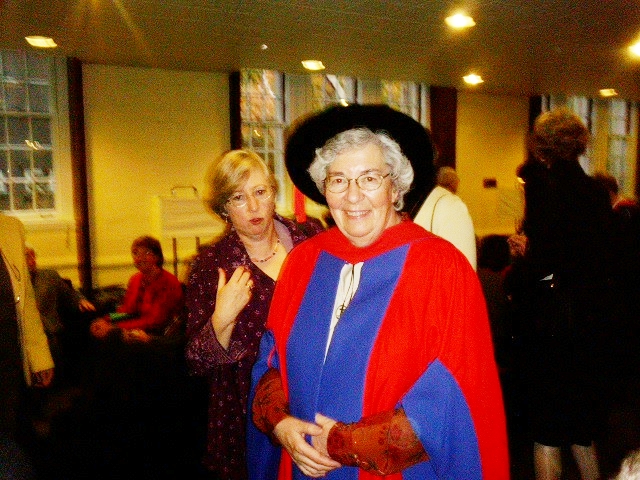
The University of St. Michael’s College commemorates the life of Sister Margaret Myatt, CSJ, who passed away Thursday, August 1 after 65 years of religious life with the Sisters of St. Joseph of Toronto. Friends and colleagues remember Sr. Margaret for her important contributions in the Toronto Catholic health care community, for her religious leadership and service, and for her longstanding and essential support for St. Michael’s.
Former president of St. Michael’s Dr. Anne Anderson, CSJ said Sr. Margaret “was known locally, provincially and internationally for her commitment to Catholic Health Care.” In her leadership roles, “she shaped and re-envisioned institutional care to reflect changed needs in the light of a new reality shaped by ever changing technology.”
Sr. Margaret graduated from St. Michael’s in 1973 with a degree in Religious Studies. She received a diploma in Hospital Administration from the U of T in 1975, the year she became the administrator of St. Joseph’s Hospital in Toronto. In that position, Sr. Margaret was responsible for a difficult task: the merger of St. Joseph’s and Our Lady of Mercy Hospital. The two organizations became St. Joseph’s Health Centre in 1980 after a smooth transition, and Sr. Margaret stayed on in the role until 1990, at which point she became CEO of St. Joseph’s Hospital and Home in Guelph, Ontario.
Sr. Anne discussed these leadership roles in her remarks while presenting Sr. Margaret for a Doctorate of Sacred Letters at a Faculty of Theology convocation in 2005. With jobs and livelihoods on the line, the hospital merger was a “delicate” task that Sr. Margaret facilitated with aplomb. She also “brought about reconciliation to a ‘fractured and fractious community” at St. Joseph’s Health Centre in Guelph through “communication and dialogue,” Sr. Anne said, as reported in a story on the Sisters of St. Joseph website.
In an email, Sr. Anne noted that Sr. Margaret’s “wise counsel benefited the many Boards and Committees which sought her expertise.” Over her 35-year career in health administration, these boards and committees included the Metro Toronto District Health Council, the Catholic Health Association of Ontario, the Catholic Health Association of Canada and the Catholic Health Corporation of Ontario.
After retiring from her work in health care, Sr. Margaret was elected General Superior of the Sisters of St. Joseph. Sr. Anne wrote, “During this period, she fostered and encouraged her Congregation to develop new ministries. Today, Fontbonne Ministries focuses on nurturing community through housing and outreach programs.” Sr. Margaret also “partnered with other religious congregations in a ‘joint ministry’ called Becoming Neighbours which focuses on refugees and newcomers to Canada.”
Former St. Michael’s president Dr. Richard Alway said Sr. Margaret was elected “at a time when the congregation needed a healing presence as well as someone with a clear vision and communication skills.” She proved so effective in the role that she served an unprecedented three four-year terms. Her last election to the role required the congregation to petition Rome for special permission for her to serve a third term, “showing how effective and popular she was.”
In the fall of 2007, Sr. Margaret presented Dr. Alway, then president of St. Michael’s, a donation of $2.5 million on behalf of the order to endow a chair in the Faculty of Theology. The Sisters of St. Joseph of Toronto Chair in Theology is currently occupied by the faculty’s dean, Dr. James Ginther.
In her letter to Dr. Alway accompanying the gift, Sr. Margaret wrote that the Sisters hoped the chair “will serve as a legacy for our Sisters who ministered on campus for over ninety-five years.”
Current St. Michael’s president Dr. David Sylvester joins Dr. Alway and Sr. Anne in acknowledging Sr. Margaret’s contributions to the life of the school.
At the honorary degree conferral for Sr. Margaret in 2005, Sr. Anne discussed the meaning of an honorary degree as “a very public statement of a university’s values.” The then-dean of the Theology faculty continued, “in her life of Service to the Church, her Congregation and the ‘dear neighbour,’ Sr. Margaret exemplifies in every way the deeply cherished values that give life and meaning to the ministry of graduate education, here at the University of St. Michael’s College.”
In an email, Sr. Anne offered further thoughts on Sr. Margaret’s life and work, writing, “As a Sister of St. Joseph, Sister Margaret’s life of faith exemplified in every way the particular charism of the Sisters – care and concern for the ‘dear neighbor’!” She concluded with a passage of scripture: “Those who are wise will shine like the brightness of the heavens, and those who lead many to righteousness, like the stars for ever and ever.” (Daniel 12:3)
| A visitation for Sr. Myatt will take place at the Sisters of St. Joseph’s Residence (2 O’Connor Drive, Toronto, Ontario) on Tuesday, August 6, 2019 from 2:30 to 4:30 p.m., with a prayer vigil at 7 p.m.
A Mass of Christian Burial will take place Wednesday, August 7, 2019 at 10:30 a.m. in the chapel at the same location. |
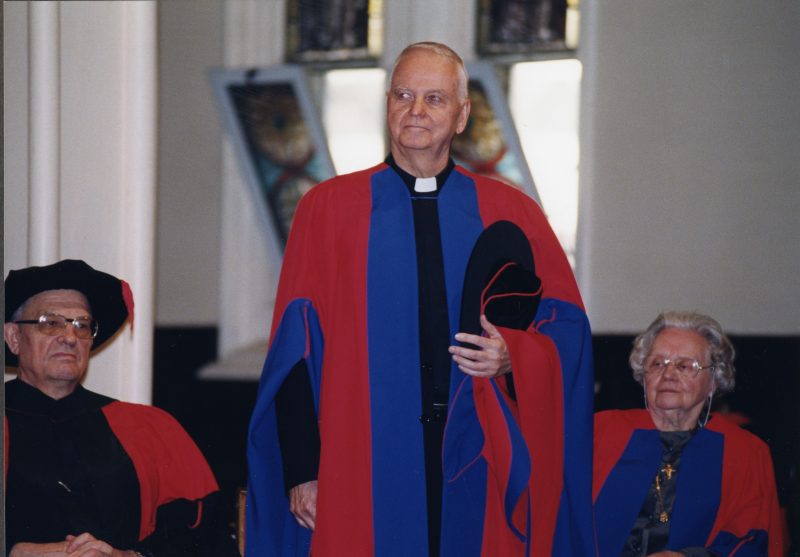
The University of St. Michael’s College remembers and celebrates the life of Fr. Owen Lee, CSB, a graduate of St. Michael’s who taught classics here and elsewhere while also building a career in public education and scholarship. This arc reached its apex with a longstanding appointment with the Metropolitan Opera in New York City, for whom Fr. Lee provided engaging commentary during the intermissions of broadcast opera performances on Saturday afternoons. His most important request related to his Saturday engagements was to be able to return home to Toronto in time to celebrate Sunday morning Mass.
Fr. Lee heard his first opera on the radio when he was 11 years old. “The music swept over me like a tsunami,” he said, according to his biographical page on the website of the Basilian Fathers. He entered the Basilian novitiate in 1947, and made use of his longstanding enthusiasm for opera to pursue the education in classics that would prepare him to teach. Fr. Lee would tell fellow Basilian Fr. James Farge that he had attended “over 950 different operas” during his lifetime.
Graduating from St. Michael’s with a B.A. in sacred theology in 1957 after having completed another B.A. and an M.A. at the University of Toronto, Fr. Lee received his PhD from the University of British Columbia and began his first appointment at St. Michael’s College as a lecturer in 1960; he became an associate professor in 1963.
He would retire to the status of Professor Emeritus in 1995, after decades of teaching in Toronto as well as a variety of other locations. Along the way, he would pick up four honorary doctorates and a University of Toronto teaching award. Upon hearing news of his death, a former St. Michael’s student who took Latin with Fr. Lee tweeted that he was a “talented, engaging, and personable man.”
It was in 1983 that he received the call inviting him to participate in the Met’s broadcasts, and he became a fixture of the airwaves; according to an obituary appearing in the New York Times, he gave his last appearance on-air in 2006. During the broadcasts, he would offer commentary during the first intermission, and sit on a panel of experts fielding questions about opera from audience members in a quiz-show format during the second. As the Times reports, “The Met broadcasts were such a part of his life that Father Lee occasionally gave them up for Lent.”
Fr. Farge discussed Fr. Lee’s radio broadcasts while giving remarks for the dedication of the Basilian Common Room in Brennan Hall in October of 2017. “He became known all over the world,” Fr. Farge said, reaching an estimated audience of “as many as 8 to 10 million people once a month.” Many of his broadcasts were transcribed for publication in book form; according to the website of the Basilian Fathers, he wrote a total of 22 books, including an introduction to Wagner’s Ring Cycle, collections of transcripts of his radio commentary, and Father Lee’s Opera Quiz Book, a collection of difficult opera-related questions from those on-air quiz panels.
In correspondence with Fr. Farge, an American musicologist wrote that Fr. Lee “brought to the understanding of opera a level of sophistication and communicativeness to which only the best musicologists aspire, and few achieve.” A wide-ranging treatment of Father Lee’s cultural interests can be found in his semi-autographical account of a year teaching in Rome, A Book of Hours: Music, Literature, and Life: A Memoir.
In his books and in the lives of his students and listeners, the life and work of Fr. Owen Lee continues to yield fruit as a testament to the legacy of the Basilian Fathers at St. Michael’s.
| We invite our community to attend a Funeral Mass that will be celebrated for Fr. Lee on Saturday, August 10 at St. Basil’s Church. Visitation will be from 9 to 10 a.m., and the Funeral Mass will begin at 10 a.m. |
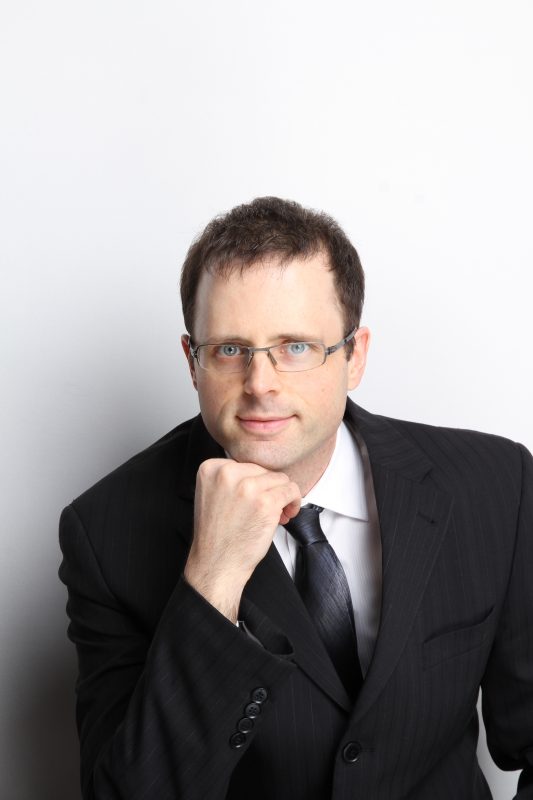
Faculty of Theology Dean Dr. James Ginther is delighted to announce that Dr. Jean-Pierre Fortin will be joining the faculty as Assistant Professor in Practical Theology and Pastoral Formation. Dr. Fortin takes up his position July 1, 2019, and will begin teaching in the Fall semester.
“Jean-Pierre’s work at the Institute of Pastoral Studies at Loyola makes him an ideal fit for us,” says Dr. Ginther. “His research profile and involvement in ecumenical dialogue will also be of great value to our community.”
Dr. Fortin’s most recent book is titled Grace in Auschwitz: A Holocaust Christology, and he is currently working on a book on the spiritual history of grace for Fortress Press. His research focusses on religious concerns and questions of 21st-century Christians.
Mentored as a student by world renowned St. Mike’s theologian Dr. Margaret O’Gara, Dr. Fortin earned an M.A. and a PhD in theology from St. Michael’s. He also holds a doctorate from Université Laval in Quebec City in the philosophy of science and a Licentiate in Sacred Theology from Regis College in Toronto.
As well as teaching at Chicago’s Loyola University, Dr. Fortin has also taught at Université de Sherbrooke in Quebec.
Coming to teach at St. Mike’s “constitutes a tremendous honour and opportunity to bear witness to the quality of the education I received,” Dr. Fortin says.
The duties of the practical theology position include teaching the Theology of Ministry and Reflection Seminar classes, as well as overseeing field placements. Field placements are an essential aspect of the Master of Divinity and Master of Religious Education programs at the Faculty, allowing students to practice under supervision the pastoral skills they have learned in the classroom and then come back to reflect on what they have learned about their abilities.
Dr. Fortin’s experience in the scholarship and teaching of spiritual direction will also enhance the Faculty’s pastoral formation program. “I hope to be able to inspire students to engage in a transformative search for truth leading to a new way of life in and for God,” he says.
The itinerary for Dr. Dennis Patrick O’Hara’s final working trip before his retirement begins this summer couldn’t haven been more appropriate. The Faculty of Theology professor returns this week from South Korea, where he offered a congratulatory address to the founding meeting of the Korean Thomas Berry Association (KTBA).
It’s a trip that has brought the ecotheologian full circle, as Dr. O’Hara was first influenced by Berry’s writings while working on his graduate studies, leading him to specialize in theology and ecology. Berry’s influence and inspiration have remained strong throughout Prof. O’Hara’s teaching career, and over the years he has emerged as a world leader in Berry’s work, teaching hundreds of students and supervising multiple theses in ecotheology and ethics. Many of those students come from South Korea, where Berry has a strong following, expressly because of Dr. O’Hara’s reputation and research.
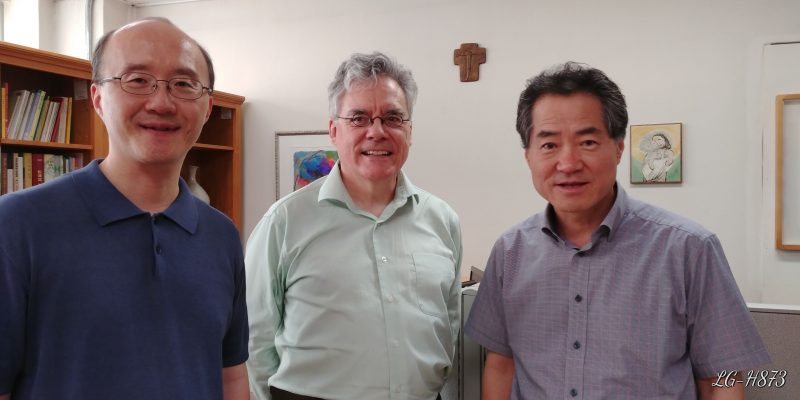
Dr. Berry (1914-2009) was a Passionist priest strongly inspired by French philosopher Teilhard de Chardin. He called on science, Judeo-Christian tradition and a wealth of wisdom from various spiritual traditions to propose ways in which to better understand and serve ecological consciousness.
Dr. O’Hara points to the new Berry association’s mission statement to explain the resonance Berry has with many Koreans. The statement notes not only that Fr. Berry’s work can offer “a new vision to Korean society which is suffering the side effects of industrialization,” but also that his “thought, because of the significant influence of Asian philosophy, is readily understandable in the Korean context.”
As Koreans have come to know Dr. Berry’s thought, often that introduction – and then further education — have come via Dr. O’Hara and his work as director of the world-renowned Elliott Allen Institute for Theology and Ecology (EAITE). Founded here at the Faculty of Theology by Passionist Fr. Stephen Dunn, the EAITE is an interdisciplinary institute that brings together various branches of theology – e.g., ecospirituality or gender justice – with science and humanities in ways to benefit both people and the rest of the planet. Dr. O’Hara succeeded Fr. Dunn as director of the institute in 2001 and he has remained a key influence as the EAITE has continued to grow as the foremost place to study the thought and implications of Dr. Berry’s work.
“We not only teach (Berry’s) work but give it a solid theological foundation and interpretation,” Dr. O’Hara says simply. “This is unique among the centres that study Tom’s works.”
At a traditional Korean meal following the launch of the KTB, Bishop Timothy Yu Gyeong Chon, social ministry vicar for the Seoul Archdiocese, chatted with Dr. O’Hara to let him know not only that he’d met Dr. Berry once but that he’d also attended one of O’Hara’s classes while visiting Toronto. Then he sang the praises of the EAITE.
While in Seoul to help launch the local Berry association, Dr. O’Hara also delivered a talk to 50 seminarians at the Catholic University of Seoul, and another sponsored in part by Kyung Hee University. He also met with many of his former students and their associates, discussing local environmental concerns.
Dr. O’Hara’s significant profile is all the more impressive given that ecotheology is his second career. Prior to theology, he was a chiropractor and naturopathic doctor, both as a practitioner in private practice as well as an educator at colleges for each of these professions. He has also served as a consultant and facilitator for the Natural Health Products Directorate of Health Canada, drafted a description of the naturopathic profession for the World Health Organization, and written the summative report for the 2006 World Health Organization International Consultation on Phytotherapy held in Milan, Italy.
Today, Dr. O’Hara is also an associate member of the graduate faculty at the School for the Environment at the University of Toronto where he has co-taught courses on the environment and health. For 10 years, he was a core faculty member of the certificate programme in Corporate Social Responsibility at the University of St. Michael’s College.
He regularly delivers popular and academic lectures in Canada, the United States, and Korea on ecotheology, ecospirituality, ecoethics, and integral ecology and human health.
Two days before his retirement starts, Dr. O’Hara will facilitate a special screening and discussion of An Ecology of Mind: A Daughter’s Portrait of Gregory Bateson, an event that’s part of an international conference on “Media Ethics: Human Ecology in a Connected World” hosted in partnership with the EAITE and the University of Toronto Faculty of Information. The screening and panel discussion, including an interview with Nora Bateson, takes place June 28 at 7:30, at the McLuhan Centre, 39A Queen’s Park Crescent E.
Dr. O’Hara retires from the Faculty of Theology June 30 of this year. He will be missed!
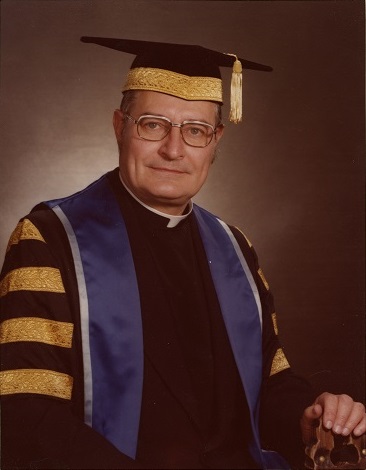
The University of St. Michael’s College today remembers Fr. Peter Swan, CSB, who passed away on Nov. 15 after nearly a century of life. Fr. Swan served as president and vice-chancellor of St. Michael’s from 1978 to 1984, overseeing the the opening of Alumni Hall and the adoption of the Memorandum of Agreement (1984) with the University of Toronto. Fr. Swan also sent a design for a new Coat of Arms to the College of Arms in London, England; the Queen approved the design for use on diplomas and other school-related documents in August of 1979, and it still adorns the wrought-iron gates of Elmsley Place.
Raised in an English expatriate family in Duncan, British Columbia, Fr. Swan was educated in a small private elementary school and at Duncan High School. Graduating from secondary school at age sixteen, Swan entered St. Michael’s College in September 1935. After graduating with a BA from the University of Toronto in 1938, he joined the Basilians in 1939. He was ordained in 1943 and in 1946 he completed his Ph.D. in Philosophy at the University of Toronto. That year he was assigned to Assumption College and named an Associate Professor of Philosophy. In 1949, Swan became Registrar there; in 1958, Vice-President Academic. In 1961, Swan was appointed Superior and Principal of Thomas More College in Saskatoon, Saskatchewan, where he served for sixteen years prior to his appointment at St. Michael’s.
In June of this year, Fr. Swan was presented with a medal in celebration of the 80th anniversary of his graduation from St. Michael’s College. We join the Basilian Fathers in mourning the loss, honouring the work and celebrating the life of Fr. Swan.
Fr. Swan’s funeral Mass will be celebrated on Friday, Nov. 30 at 10 a.m. in the Chapel of the Cardinal Flahiff Centre. Visitation is immediately before the Mass.
(Rev. Dr. James Heft, S.M. delivered the address below at our 2018 Convocation, held in St. Basil’s Church on Saturday, November 10. Fr. Heft is Director of the Institute for Advanced Catholic Studies and the Alton M. Brooks Professor of Religion at University of Southern California.)
It is an honor to have been invited to speak at the convocation for the faculty of theology and the continuing education Division of the University of St. Michael’s College. This gathering also marks the 50th anniversary of the founding of the doctoral program of theology, which degree I was privileged to receive here in 1977. I have almost nothing but fond memories of my years here in Toronto, of the excellent faculty and fellow students. There was, however, one not so pleasant memory. In 1969, when I began my graduate studies, the Vietnam war continued to profoundly divide the United States. At that time, I was driving a car that had an Ohio license plate, and was twice pelted with eggs. For the record, I opposed that war. In those days, as one of my Canadian professors told me, “Americans are as benignly ignorant of Canadians as Canadians are maliciously informed about Americans.” Over the next seven years, I overcame my ignorance of Canada and have developed and retain a great affection for its peoples.
I am not here this afternoon to tell old war stories, to comment on the legalization of pot in Canada or on last Tuesday’s mid-term elections in the U.S.I am here to speak about something much more important: the sacred calling of being theologians. Walter Burkhardt (To Christ I Look, pp. 98-99) reminded theologians that they deal with mystery, before which the most appropriate posture is silence and contemplation. Before we sit at a desk and write, or stand before others and teach, we should be on our knees in prayer. We distort the mystery of God whenever we try to possess it, or imagine that we can capture it conceptually. Although the reality of God and God’s revelation is objective, it should never be objectified. Good theologians are not spectators. One of my favorite atheists, Frederick Nietzsche wrote:
For this is the truth: I have left the house of scholars and slammed the door behind me. Too long did my soul sit hungry at their table; I have not been schooled, as they have, to crack knowledge as one cracks nuts…they sit cool in the cool shade: they want to be mere spectators in everything; they take care not to sit where the sun burns upon the steps (Thus Sake Zarathustra, p. 147).
Some years ago a student sent me an email complaining about her theology professor who, in Nietzsche’s words, left her hungry at his table. She wrote, “Every theology course I have endured seemed like logicians parsing a love letter.” I do not remember how I responded, but it should be obvious that theologians need to be on the field, in the contest and, as St. Paul tells us, gratefully running the race. If we remain spectators in the stands, we will never really understand the game. In other words, when theologians are personally involved with and committed to what they study and teach, students are nourished, not bored.
Forty-five years ago, in the chapel across the street at 95 St. Joseph Street, I heard a homily that I have never forgotten. Basilian priest, Bill Irwin, based it on a question from the Summa theologiae (III, Q. 42) in which the St. Thomas asks whether Jesus should have written down what he taught. St. Thomas, as you know, structures his questions in a predictable way. First he gives several reasons to answer positively the question he posed; then he states his own position; and finally, he answers, in the light of his own position, the questions he posed at the beginning. Let me summarize how Thomas handles this fascinating question.
He begins by presenting three reason why Christ should have written his teachings. First, he writes that since Christ said that his doctrine is supposed to last till the end of time, it would have been fitting for him to put it in writing so that it might more easily and more accurately be handed down to posterity. Second, he cites the biblical precedent of the 10 commandments–which were written in stone; therefore it would make sense for Jesus also to write out his teachings. And third, since Jesus was concerned that the truth be taught, by writing his teachings out, he would eliminate the possibility that others would distort them. Here, Thomas adds that some people already suspected that Jesus’ disciples made him out to be more than he actually was. Therefore, Jesus himself should have written out his teachings.
In presenting his own answer to the question, Thomas lists three reasons why it was best that Jesus did not write out his teachings. First, he says that the more excellent the teacher, the less appropriate it is that he or she should spend time writing. Why? Because when teachers are excellent, they imprint their lessons directly on the hearts of their listeners, just as did Pythagoras and Socrates who, because they were excellent teachers, didn’t need to write anything.
Second, Thomas explains that given the excellence of Jesus’ teachings, it would be impossible to express it adequately in writing. To back up his point, Thomas cites the gospel of John (21:25): “There are still many other things that Jesus did, yet if they were written about in detail, I doubt there would be room enough in the entire world to hold the books to record them.” Thomas explains that this is so not because of a space problem, but because those who would attempt to write these books would only skim the surface, unable to penetrate the depth of what Jesus did and taught.
Third, Thomas claims that Jesus should not have written down his teachings because, if he had, then passing on his teaching would not require the active involvement of others. Just as Jesus taught his disciples in word and deed, so he wants his disciples do the same. Had Jesus just written books, all his followers would have to do is distribute them.
Finally, Thomas responds briefly to the three reasons he gave at the beginning of the question as to why Jesus should have written out his teachings. He explains, first of all, that we should remember that Jesus is the head and all believers are members of his body. Therefore, it is not quite true, then, to say that Jesus did not put his teaching into writing. Why? Because Jesus moved some of his disciplines to write down, as best they could, what he did and taught. In Thomas’ own words: “For at his command they [the disciples], as it were, wrote whatever he wishes us to read concerning his deeds and words.”
Second, although the old law was given in the form of sensible signs, the new law, the teachings of Jesus should be written not in ink or on tablets of stone, but in the Spirit of the living God, written directly on the human heart.
Finally, concerning those who claim that they would accept what Jesus himself had written, Thomas points out that anyone unwilling to believe what the disciples had written would have also refused to believe what Jesus himself would have written.
I have summarized at some length this question in the Summa because I think it sheds light on what it means to be theologians and teachers of the Christian faith. I think there are three lessons that we can draw. The first has to do with the care we need to have with how we use language when we speak of God. British theologian Nicholas Lash speaks of the Church as an academy of word care–a place where we learn to take care of language, and where, slowly, by a divine gift not of our doing, we learn from each other to tell the truth. Since the word of God is sacred, when we speak it, we should speak with reverence. One of the brightly colored posters created by the artist Corita Kent, featured these words: to understand, is to stand under, which is to look up, which is a good way to understand. We are not looking down cracking nuts. We are looking up in reverence.
Thomas reminds us that when we affirm the doctrines of the faith, the words that we use only point to the divine mystery; they never capture it (Summa theologiae, II-II, Q. 2, Art. 2). Theologians need to learn, as the poet Emily Dickens reminds us, to tell the truth slant. Every time students ask me “What exactly does” this or that mean, I remind them that we are dealing with realities that can’t be exactly described or defined. Dogmatic definitions protect the truth more than they explain it. At the heart of Christianity is a person, not a philosophy. There are good reasons why Jesus spoke mainly in parables and paradoxes. Definitions limit the richness of the reality of the divine mystery. In the hands of an amateur, defining the things of God slips into sterile rationalism.
Second, when we do theology, we are not spectators; we are witnesses. In the early Church, martrys were witnesses. Witnesses have skin in the game; spectators do not. Witnesses are so involved that they willingly lay down their very lives for what they love and treasure. Pope Paul VI famously said that while we need witnesses more than teachers, what we most need are teachers who are witnesses. We need to take care of language, knowing that what we write or say can never adequately convey in words the mystery of God and human existence. We also need to be witnesses, because who we are conveys powerfully the meaning of what we say.
Having stressed that words are severely limited when talking about the things of God and that deeds speak powerfully enough to drown out words they contradict, it is time to make my third point: we still need to write. We must write because witnessing through our deeds is not enough. In recent years, you may have heard the words, attributed to St. Francis: Preach the Gospel at all times, and if necessary, use words. But we must also use words Certainly this is why we read in 1 Peter 3:15-16 that we should not only “venerate the Lord, that is, Christ, in our hearts,” but that we should also be prepared and ready, should anyone ask us the reason for the hope that we have, to give a reply. Reply how? Gently and respectfully, advises 1 Peter 3:16.
It would be wise, then, for each of us to be mindful about how we go about our vocation as theologians and religious educators, remembering that we need to pray before we speak, and to speak with humility, and most importantly, give evidence in our words and deed that we love what we are called to teach.
I congratulate all of you who have received degrees. I thank the faculty who have dedicated their lives to his sacred work of preparing you to be teachers who are witnesses. I remain very grateful to the Faculty of Theology of the University of St. Michael’s College who educated and formed me as a theologian. I am sure that all of you who are graduating this afternoon are also grateful!
James Heft, S.M. (Marianist)
Nov. 10th, 2018
St. Michael’s College, University of Toronto
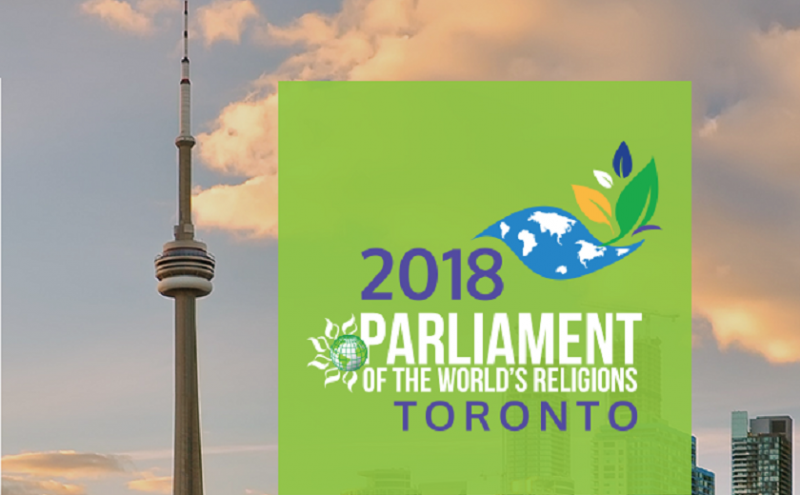
When the 2018 Parliament of the World’s Religions convenes in Toronto on Nov. 1, the University of St. Michael’s College will be there to support the proceedings.
St. Michael’s will serve as lead sponsor for this year’s Indigenous Opening Ceremony thanks to the generosity of the Richard Alway Interfaith Symposium Fund. According to the official event description, “The spiritual opening ceremonies at Olympic Park . . . will offer greetings from the host First Nations, the Haudenosaunee Confederacy and the Mississaugas of the Credit. Visiting Spiritual Leaders will respond with their gratitude.”
St. Michael’s Associate Professor of Christianity and Culture Reid Locklin worked to coordinate the University’s support for the 2018 Parliament. Professor Locklin said that since he came to St. Michael’s in 2004,
the work of the Truth and Reconciliation Commission of Canada has helped to conscientize us to a wider dialogue—between settlers and Indigenous nations and peoples, between Christianity and those spiritual traditions that sustained this land from time immemorial right up to the present day, and between the Church and our own troubled legacies of colonialism and cultural genocide. In this context, it is particularly apt that the University, thanks to the generosity of the Richard Alway Interfaith Symposium Fund, has decided to become the lead sponsor of the Indigenous Peoples Program Opening Ceremonies for this year’s Parliament.
St. Michael’s is also well represented in sessions during the week-long event, with numerous speakers and panel participants having connections to the University. A full list of events featuring St. Michael’s-affiliated participants can be found here.
Organizers expect over 10,000 people to participate in this year’s Parliament, and the itinerary for 2018 includes over 500 different events. The interfaith organization seeks to promote “harmony among the world’s religious and spiritual communities” in order to achieve “a just, peaceful and sustainable world.”
For more information on this year’s Parliament, including more on the involvement of St. Michael’s and the University of Toronto more broadly, read this U of T News feature on the event.
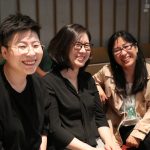
With an estimated 1 in 110 people worldwide now forcibly displaced, experts from multiple disciplines gathered on campus recently to address the role of the Church in the growing crisis of global migration.
The Faculty of Theology at the University of St. Michael’s College co-hosted of The Church and Migration: Global (In)Difference?, one of the largest conferences ever held at St. Mike’s. The three-day event sponsored by the Dominican Institute of Toronto was a collaborative effort, co-organized by colleagues from St. Mike’s, Regis College, Emmanuel College, Victoria University and Trinity College.
The conference, which ran June 25-27, spanned four college campuses, hit its maximum attendance with 155 attendees, and saw more than 70 presenters from 14 countries, representing six continents. Panel topic were diverse, ranging from Jesus the Migrant: Matthew 2.13-15 as a Source for Migrants’ Hope and Hospitality to Others Rooted in an Ecclesiology of the Baptized People of God to Pope Francis’ Four Verbs to Meet the Challenge of Migrations and Decolonizing the Category “Religion”.
“The conference brought together academics, practitioners, and public and ecclesial leaders,” said Dr. Michael Attridge, one of the event’s organizers.
The interdisciplinary nature of the forum gathered not only “theologians and ethicists… (but also) colleagues from history, geography, political science, law and anthropology. It was the largest interdisciplinary conference ever hosted by the Faculty of Theology, University of St. Michael’s College,” noted Dr. Attridge, who teaches courses in Systematic Theology, Vatican II and Christology at St. Mike’s.
In his remarks to open the conference, St. Michael’s Chancellor Thomas Cardinal Collins cited “the powerful image of Jesus, Mary, and Joseph, as refugees, forced to leave their homes,” noting that Bishop Michael Power’s work in the fever sheds of Toronto with Irish famine refugees marked the beginning of close to 200 years of the local church accompanying people fleeing war, famine, poverty, persecution and natural disaster.
Georgetown theologian Dr. Peter Phan, who also spoke at the opening plenary session, echoed the Cardinal’s remarks, suggesting that migration is a hallmark of the Church. Because migrants present as the other they should be a clear reminder to us that we find the face of Christ in all, and thus reach out with solace and support to those on this perilous journey. It is also essential to remember that hope of a better life motivates migrants and refugees, Dr. Phan noted, and as people who believe in the hope of the Resurrection, we should be called by faith to respond.
Dr. Aldo Skoda, of Rome’s Scalabrini International Migration Institute, shared some hard truths at the opening evening session. He cited a statistic that currently one out of every 110 people worldwide is forced flee home because of reasons such as poverty or war. In the South Pacific, for example, some have migration forced upon them because the islands they once called home are now submerged by rising ocean levels. Dr. Skoda added that one of key factors further complicating mass migration is indifference on the part of wealthier, safer nations, countries with the ability to respond but whose citizens often lack the will. He challenged listeners by citing such realities as the fact that while migration is a transnational issue, each country has its own policies and procedures, further complicating an already complex issue.
With the court of public opinion often against them in their desired destinations, running from poverty, and often lacking education, “migrants are poor of rights and powers but migrants have dignity,” and this is one of the areas in which the Church can make a difference, Dr. Skoda said.
“The gospel is not only a message to help us analyze a story, but it remains incomplete without reflection on what kind of Church we want to be,” Dr. Skoda said.
While conference attendees knew they would hear challenging presentations, many participants were also surprised in the presentations they heard. For example, statistics repeated more than once shook oft-heard assumptions about which countries host the most migrants.
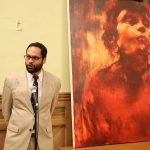
“The critique of the western discourse around the immigration and refugee ‘crisis’ was eye-opening, especially when one considers that refugee host countries most affected are not in the West but include Turkey, Uganda, Pakistan, Iran,” explained conference organizer Dr. Darren Dias, OP, who teaches Trinity, sacraments and Jewish-Christian dialogue at St. Mike’s. “These are the countries that have the most refugees – not Germany, USA or Canada.”
ThM student Fiona Li, who was both a panel moderator and conference attendee, found the event to be a powerful reminder of just how broad the issues are surrounding migration.
“We often think of the Mexicans, the Syrians, and refugees as migrants, but we forget about other types of migrants, such as women who migrate to another country in hopes of marrying someone,” Li said.
“Dr. Christina Lledo Gomes [Charles Stuart University, Australia] presented a paper about Filipina migrants in Australia, and how the stereotype of the ideal East Asian woman really affects how people view East Asian women, and how vulnerable women … are in a foreign country. It was a reminder to be aware of all types of migrants, their contexts, and how we can help them.”
One of the conference attendees was Dr. David Sylvester, who took up his duties as St. Mike’s president later that week, on July 1.
“I am delighted to see first-hand the leadership role that St. Michael’s faculty have played in planning, presenting, and hosting this important international conference in partnership with our colleagues across campus,” Dr. Sylvester said. “If anyone has any doubts about the relevancy of Catholic higher education today, they need look only at this gather of distinguished academics from around the world who have come together across borders and faith traditions to discuss one of the most pressing ethic and social issues of our day.”
Conference attendee Dr. Agnes Thomas, who is the executive director of Catholic Crosscultural Services, a local agency that offers extensive services to newcomers in the greater Toronto area, called the conference “a timely and critical conversation.”
“I am encouraged that the Church and the theologians in our midst are engaged in discussing challenges, opportunities, and the the positive and negatives of the past role the Church played with regard to immigration and refugee settlement, while accepting the fact that in the past we have not always been gracious to the ‘stranger’ in our midst.”
The migration conference was the 12th conference to stem from the work of the Ecclesiological Investigations International Research Network, an organization created to bring together worldwide research and debate in ecclesiological matters.
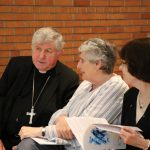
“We live in a time when the migration of peoples (the journeys and displacement of which, for the vast majority, have been forced upon them by external circumstances), has never been a situation of greater urgency,” said Dr. Gerard Mannion of Georgetown University, who is a founding member of EI.
“This makes it imperative that churches, faiths communities and all people of good do all they can, relative to their situations and resources, to explore the root causes of such migration, the implications and outcomes of mass human movement and potential strategies and courses of action to help alleviate the most acute situations readily, as well as ensuring just and equitable policies and laws are implemented both within and across nations to safeguard the rights and futures of all migrants, refugees, displaced peoples and itinerant peoples,” said Dr. Mannion, who stressed the importance on ongoing conversation on what he labelled one of the most pressing challenges of our times.
“We see in the Other and through-otherness the reflection of the wondrous ground of being that Christians call Wholly Other, the God who is unity in diversity.”
The conversation continues.
(List of conference speakers and events)
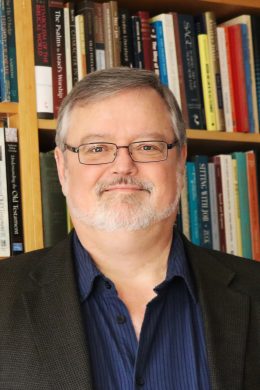
The Faculty of Theology offers its congratulations to Old Testament scholar Dr. John L. McLaughlin, who has been promoted to full professor, the highest of academic ranks.
“I am delighted to see John honoured in this way,” said Faculty Dean Dr. James Ginther. “It affirms what we already know – that John is an invaluable asset to the Faculty, not only in terms of his teaching but also due to his research and service.”
As stated by the University of Toronto’s Office of the Vice-Provost, Faculty and Academic Life, a successful candidate for promotion to the rank of full professor will have established “a wide reputation in his or her field of interest, … be deeply engaged in scholarly work, and … have shown himself or herself to be an effective teacher.”
The assessment process required a committee made up of both Faculty colleagues and external members examining a wealth of materials from Dr. McLaughlin’s academic career, including a lengthy list of books, book chapters, peer-refereed articles, and book reviews, as well as student evaluations. His extensive curriculum vitae includes serving as a member of the editorial board of Journal of Hebrew Scriptures, and as an associate editor of Catholic Biblical Quarterly. He served as President of the Canadian Society of Biblical Studies in 2015-2016
After earning his BA in Philosophy and English from St. Thomas University in Fredericton, NB, Dr. McLaughlin earned an MA from the University of Toronto, and an MDiv, and PhD at the University of St. Michael’s College. He joined the Faculty of Theology in 2002 and is cross-appointed to the Graduate Faculty, Near and Middle Eastern Civilizations, at the University of Toronto. Prior to joining the Faculty, he taught at Wheeling Jesuit University in Wheeling, West Virginia.
Dr. McLaughlin’s teaching areas include Introduction to the Old Testament, Israelite Religions, Prophets, Wisdom Literature, Isaiah, Qoheleth, and Job. His research interests include Ugarit, Israelite Origins, Wisdom Literature and Psalms. His books include The Parables of Jesus, published by Novalis in 2004, and What Are They Saying About Ancient Israelite Religion, published by Paulist Press in 2016. An Introduction to Israel’s Wisdom Traditions (Eerdmans) is in press and slated to appear next month.
A proud son of Saint John, NB, he notes in his Faculty profile that he misses the Atlantic Ocean, fog and dulse.
By Catherine Mulroney
Catholic Social Teaching is often labelled the Church’s best kept secret. The faithful, it seems, are sometimes surprised to discover the extraordinary wealth of instruction the Church has to offer on what it means to be human, including an elaboration of our individual rights, as well as of our responsibilities to ourselves and others.
A new exhibit at the John M. Kelly Library, however, demonstrates that Catholic Social Teaching has long resided at the heart of the academic and social life at the University of St. Michael’s College.
The exhibit, entitled Love Your Neighbour as Yourself: Catholic Social Teaching in Toronto, is jointly sponsored by the library and the Faculty of Theology, with contributions from the Sisters of St. Joseph of Toronto, the Loretto Sisters, the Basilian Fathers, and the Archdiocese of Toronto.
Love Your Neighbour opens on Thursday, March 22, 2018 with a free lecture by Archbishop Paul-André Durocher of Gatineau, Quebec, a talk entitled Echo Chamber or Megaphone? The Church in Canada and the Prophetic Voice of Pope Francis. The talk is generously sponsored by the Royackers Lecture Series of Regis College. A reception will follow in the library, allowing guests time to visit the display.
The idea for the exhibit, which will be open to the public until June 8, originated with Chief Librarian Sheril Hook, who had been reading on the topic and wanted to learn more, explains Theology Dean Dr. James Ginther, who was quick to support the idea.
Rather than approaching the exhibit from strictly a historical view, however, the Dean and the Chief Librarian were keen to demonstrate that Catholic Social Teaching is a living, evolving tradition.
“We wanted to have this display reveal what is means to truly live out Catholic Social Teaching,” he says.
Kelly Library Archivist James Roussain, who is curating the exhibition, has been delighted to work with St. Mike’s founding communities in telling the story of how Catholic Social Teaching has been woven through their lives, and how they, in turn, have integrated it into life on campus as well as the broader world.
“We’ve chosen to illustrate the seven themes (of Catholic Social Teaching) through examples, with the communities telling their own stories,” he explains.
These stories are supported by some of the riches from the John M. Kelly Library Special Collections, including early editions of Rerum Novarum, the 1891 encyclical written by Pope Leo XIII on the rights of workers. While Catholic Social Teaching has its roots in Scripture, Rerum Novarum is the document identified as the first of the modern encyclicals and letters explaining what Catholic Social Teaching is all about.
“Catholic Social Teaching existed long before Rerum Novarum, but this document crystalizes thinking on labour and lays the groundwork for future encyclicals,” Dean Ginther explains.
The exhibit also includes Henri Nouwen’s handwritten draft for L’Arche and the World, an early copy of the the charter for the community of L’Arche, the international network of homes for people with disabilities, as well as a 1976 letter from Cesar Chavez, American civil rights activist and co-founder of the United Farm Workers to Sr. Mary Alban Bouchard, CSJ, offering encouragement in her non-violent protests.
Also on display are numerous other photographs and items illustrating the St. Michael’s community’s commitment to justice and dignity for all.
“This is by no means an exhaustive exhibit. I did not set out to create a time capsule, but wanted to reflect the strong sense of community, built on shared values, that informs life at St. Mike’s, “ Roussain says.
In keeping with the theme of the exhibit, cash donations will be accepted at the reception for The Daily Bread Food Bank, whose first Executive Director was Sr. Marie Tremblay, CSJ.
Love Your Neighbour as Yourself: Catholic Social Teaching in Toronto opens March 22 and runs through to June 8, 2018. It is located on the ground floor of the John M. Kelly Library, 113 St. Joseph St., Toronto.
To RSVP for Archbishop Durocher’s lecture, which takes place on Thursday, March 22 at 7 p.m. in Rm. 100 in Alumni Hall, please click here
It is with great sadness but in the abiding hope of the Resurrection that we announce the death of Fr. Mario D’Souza, CSB. Fr. D’Souza, former Dean of the Faculty of Theology, former President and Vice Chancellor of Assumption University, Windsor, and a world leader in the field of religious education, died peacefully at the Cardinal Flahiff Basilian Centre on Tuesday evening, Sept. 26 after a brief illness.
Fr. D’Souza was born in Karachi, Pakistan, in 1956, and moved to Canada as a young adult. He was ordained to the priesthood in 1991, celebrating his 25th anniversary of ordination last year. He began teaching at St. Michael’s Faculty of Theology in 1991, and, other than his time at Assumption (Jan., 2005-Aug., 2006), the Faculty remained his home until his death. He held the Basilian Fathers Chair in Religion and Education, and was named a Fellow of St. Michael’s College in October of 2014. He served as Dean of the Faculty of Theology from 2009 to 2014.
He brought to the classroom a rich academic history of his own, having received degrees from Boston College, the University of St. Michael’s College, the University of Toronto, the University of Calgary, and University College, Dublin.
A passionate educator and prolific researcher, Fr. D’Souza produced many works over the course of his career, his most recent being Catholic Philosophy of Education: The Church and Two Philosophers, published in October, 2016 by McGill-Queen’s University Press.
Earlier this year, the process had begun to consider Fr. D’Souza for full professorship.
Loved by his colleagues, his friends, and, most importantly, his students, Fr. Mario will be deeply missed.
Visitation will be held on Friday, September 29 from 6:30 p.m., with a wake service at 7:30, in the Chapel of the Cardinal Flahiff Basilian Centre, at 95 St. Joseph St.. Visitation will also be held Saturday, September 30, at St. Basil’s Church, 50 St. Joseph St., from 9:30 a.m. until the Funeral Mass, at 10:30.
By Catherine Mulroney
It is fitting that the Faculty of Theology’s Commissioning Mass takes place during the Easter season, a time when we focus on the new life — and new direction — offered us through the Resurrection. At this annual Mass, which takes place after the winter semester has wrapped up, students, faculty, alumni and staff gather to pray for those who will be graduating and heading out into the world to apply the knowledge and skills learned during their studies, whether in parish ministry, the classroom, a religious community, or any of the countless places you’ll find our graduates.
This year’s Commissioning Mass was particularly special as Faculty alumnus Bishop Robert Kasun, CSB, joined us as our celebrant and homilist. In his homily, Bishop Kasun spoke of both the privilege and responsibility inherent in receiving a theological education. He then led the assembled in the prayer over those being commissioned: “Ever-loving God, through Christ you sent the Holy Spirit among us, your disciples, who are commissioned to bear witness to your presence in the world. We pray especially in this Commissioning Mass for all graduates of the University of St. Michael’s College. May all their future endeavours redound to your glory and be brought to fruitful completion, in your name, Father, Son and Holy Spirit.”
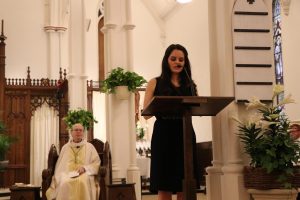
In keeping with Faculty tradition, both a basic degree and an advanced degree student then offered a reflection, and each student touched on the notions of privilege and responsibility mentioned by the Bishop.
Carla Marcoccia, who will graduate this November with a Master of Divinity degree, spoke of the transformation she witnessed in herself while studying at the Faculty.
“Had it not been for the years of instruction in the M.Div. program, I would not have been able to effectively serve the youth that I minister to,” Carla told the assembled. “Being a scholar in theology is a calling from God; it is a vocation that requires self-surrender to God’s will and the willingness to serve where God needs you to do His work… St. Michael’s has challenged me intellectually through scholarship grounded in the Catholic tradition, while also inspiring and guiding me in my formation as a minister… I feel equipped to serve yet I leave yearning to deepen my knowledge about theology and Christ.”
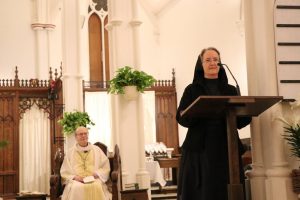
Carla was followed by Sr. Mary Angela Alexander, RSM, who offered fulsome thanks to the faculty, library, staff and her student colleagues for the experience she has had while working on her M.A..
“One of the gifts of studying here has been the opportunity to read more, and hear more, of the theology of other Christian traditions, and study with students from a wide variety of backgrounds,” Sr. Mary Angela explained. “The open atmosphere of the classroom has given me a very positive experience in ecumenical cooperation, for which I am grateful. It is making me a better listener, a better person, a better Christian. There are a thousand, thousand ways to the heart of Jesus; and the Father is calling us by a thousand, thousand ways. Wherever I go from here, I take with me the clear example of teamwork at St. Michael’s: you know your goal, then divide the work among those who can think with imagination and compassion about how to get it done. In this way, the practical, intellectual and spiritual needs of the students can be met, and their growth encouraged. “
Mass was followed by a brief reception, during which alumni caught up with faculty, while soon-to-be-graduates introduced family and friends to each other. There was, as always, a bittersweet feel to the event, with all assembled aware that this was one last opportunity for al to gather around the Eucharistic table before jobs are started and holidays begin and life changes yet again.
The day’s Collect was an apt reminder of why we were gathered, beseeching God to “dispose our minds… that what we celebrate by professing the faith we may express in deeds.”
Carla elaborated on lived faith in her reflection, touching on the day’s Gospel of the miraculous catch of fish.
“As we set sea today, I pray we remember to listen to God’s instruction in our lives, that we obey where we are being led and know it in our hearts that whatever we face at sea — weather a storm, raging seas, calm waters or sunny days — when our boats return to shore Jesus is there waiting for us, with a fire and food, ready to sustain us until we return back to our boats and set sail to do God’s work in the world again,” she said.
We look forward to seeing the class of 2017 at the November 11 graduation and hearing their stories of where their journeys have taken them.
While it may be challenging for students in the midst of the academic demands of exams and final papers to remember, theology is an applied discipline. Many use the motto attributed to St. Anselm – faith seeking understanding – as a way to explain the work theologians do, work that of necessity calls us to engage in the sacraments and with each other. And that makes Holy Week – a time when we are reminded that a life of faith is a life of service — a particularly rich and busy time for faculty, students and staff.
Fr. Mario D’Souza, CSB, our specialist in the field of religious education, for example, will spend much of Holy Week at Loretto Abbey, where he will celebrate the Triduum for the Sisters.
“I have done this for a number of years, and I really find this to be a time of great stillness and peace, “Fr. D’Souza says. “The quiet and dignified courage and faith of the Sisters never fails to impress and humble me.”
Systematics professor Dr. Darren Dias, O.P., who celebrated Palm Sunday Mass at St. Mary Immaculate Parish in Richmond Hill, ON, north of the city, will celebrate Easter Mass at St. Patrick’s in Mississauga, spending the Triduum at the Dominican Priory in Toronto.
Dr. Nick Olkovich, our Director of Pastoral Formation and Field Education, serves as the Co-Director of the Rite of Christian Initiation of Adults (RCIA) program at Our Lady of Sorrows Parish with Jessica DeLuca, a recent graduate of the Faculty. Their group has 11 candidates for baptism or reception this year. Two current students in the Faculty, Scott Harris and Sarah Kwiecinski, are also sponsors this year in the program.
As Nick describes it, “Holy Week begins with a dry run for the Vigil on Monday. We attend the Mass of the Lord’s Supper together and then candidates attend one of the two Good Friday services with their sponsors. We gather on Saturday evening before the Vigil for a short reflection, break briefly and then reconnect outside in front of the fire,” he continues. “The Vigil is what we as RCIA team members wait all year for. I used to think it was long. Now I’m upset when it ends. There is something so moving about all of it but it’s especially beautiful when the group gathers around the altar to receive communion first…. It’s amazing to be a part of someone else’s journey.”
Faculty Programs Co-ordinator Catherine Mulroney will be working throughout the week with her own RCIA group at Blessed Sacrament Church, as she has been doing since she completed her MDiv field placement there nine years ago.
“I thought I’d be involved for a year, applying skills I learned at the Faculty, and then move on,” she remembers, smiling. “What I hadn’t anticipated was how moving I would find the entire process. It’s a humbling privilege to journey with people who are called as adults to a life of faith in the risen Christ. The RCIA process reminds us all that the Church is very much alive and well.”
At Chinese Martyrs Parish in Markham, ON, ThM student Fiona Li will see the results of her efforts when the young members of her RCIC group (the Rite of Christian Initiation of Children, a parallel program to the RCIA) are baptized into the Church on Sunday. She says that readying young children means a great deal of advance work, such as preparing the little ones for the surprise of the cold water on their heads at baptism, as well as a great deal of fun time, working on Lenten and Easter crafts, as team members make themselves present for the children’s journey.
For those like teacher Susan McElcheran, who is working toward an MTS degree, family plays a key role in Easter plans. Susan directs the choir at St. Joan of Arc’s Holy Thursday celebration, while her husband sings in the choir.
“We also do music for the Easter Vigil, and when our kids are with us they help out in a small group that sings Palestrina’s Sicut Cervus for Psalm 42.” Susan says.
“Good Friday is the really special family time, and we’ve done things together with our kids since they were small. For supper, we make Good Friday Vegetable Soup (from the Mennonite cookbook More with Less), then we go to the Stations of the Cross candlelight procession at St. Thomas’ Anglican Church on Huron St., where I used to sing. When our children were small, we found that they loved singing in the dark by candlelight, and the rhythm of walking, singing, listening to Scripture, kneeling to pray, walking and singing again, kept them focused and attentive. Every year since then, the quiet, beauty and simplicity of the service, the psalms and the prayers, is a still point that we experience together.
“Afterwards we always walk to Harbord Fish and Chips. We sit outside to eat if the weather is good enough. In the last few years of her life, my mother-in-law would join us for the Stations and the fish and chips, so we remember her specially at this time. Now our kids are off on their own, but if they are within travelling distance they wouldn’t miss this,” she says.
For St. Basil’s Pastor Fr. Chris Valka, CSB, who earned his MDiv at the Faculty, this will be an Easter of change as he prepares to leave the parish later this spring to take up new duties at the University of St. Thomas in Houston, Texas. Easter is, of course, all about change and newness, he notes.
“What God offers us through the lessons of the life, death and resurrection of Jesus is a path of love that creates something so very new: a way of living in the presence of God that was better than the original plan,” he says.
A blessed Holy Week from all of us at the Faculty of Theology.
Dr. James Ginther, Dean of the Faculty of Theology of the University of St. Michael’s College (USMC) at the University of Toronto, is delighted to announce the appointment of Dr. Mara Brecht to the Patrick and Barbara Keenan Visiting Chair in Religious Education for the 2017-2018 academic year at the Faculty of Theology.
A graduate of Oberlin College, Harvard Divinity School, and Fordham University, Dr. Brecht is Associate Professor of Theology and Religious Studies at St. Norbert College, in De Pere, Wisconsin, where she teaches courses on systematic theology, world religions, Christianity and cultural diversity, and interreligious dialogue. Her areas of interest include religious diversity, interreligious dialogue, and theologies of religious pluralism. She is especially interested in approaches to these areas that are rooted in analytic philosophy, the philosophy of religion, and feminist theory. Dr. Brecht’s most recent publication is Teaching Comparative Theology in the Millennial Classroom: Hybrid Identities, Negotiated Boundaries, which she co-edited with USMC’s Dr. Reid Locklin.
“I’m thrilled by the opportunity to spend the year as the Keenan Chair at St. Mike’s,” Dr. Brecht says. “My excitement, in large part, comes from the opportunity to focus for a year on my scholarly interest, which, broadly speaking, is the formation of Christian religious identity in contexts of difference, and the opportunity to interact with a new set of colleagues and students.
“Most of my work has emphasized contexts of religious diversity, but my current research looks also at racial diversity. Since the Keenan Chair focuses on the area of religious education, I will hone in on developing pedagogies to help students consider the ways their racial identity intersects with their theological self-understanding and, by extension, their orientation to religious others. I have no doubt my project will be enriched by the conversations I’ll be able to be a part of!”
Dean James Ginther says that Dr. Brecht’s work in religious and racial diversity will find a ready audience at the Faculty of Theology.
“Having Dr. Brecht with us in the 2017-2018 academic year will shine a spotlight on topics so important to a theological school in Toronto, one of the most culturally and spiritually diverse cities in the world,” Dr. Ginther notes. “There is so much to be learned – and so much to be gained – in dialogue with others.”
As well as conducting research, Dr. Brecht will also teach a course and deliver a public lecture while at the Faculty.
The Keenan Chair was established in 2002 thanks to the generosity of Patrick and Barbara Keenan, and was designed to launch a major graduate teaching initiative in religious education in Canada’s largest English-speaking Catholic university.
Currently, the Keenan Chair is held by Dr. Mary Hess.
(Photo of Dr. Brecht courtesy of St. Norbert College.)
By Catherine Mulroney
When a group from the Faculty of Theology headed to Rome recently for a congress celebrating the Dominicans’ 800th anniversary, they knew their visit to the Eternal City would be full of workshops, sightseeing and celebration.
What they hadn’t anticipated was the exceptional invitation Faculty member Fr. Darren Dias, himself a Dominican, was about to receive: midway through the week, he was handed an orange card signifying a formal invitation to concelebrate at the jubilee’s closing Eucharistic celebration, at which Pope Francis was to preside.
When asked to describe what the experience was like, Fr. Dias smiles. He thinks many concelebrants shared the same initial response.
“When the Pope enters the church, there’s an excitement in seeing him, and your first instinct is to want to take a picture, but we were preparing for Eucharist, and that really became our focus,” he says. “What struck me was how simple the Pope’s vestments were, how unostentatious he looked, and how he preached not in a strong and booming preacher’s voice but in his own. He seemed to radiate a deep and authentic spirituality.”
The closing Mass was held in St. John Lateran, the cathedral church of Rome, a location that was particularly moving for the more than 2,000 gathered from all around the world, Fr. Dias notes. A smaller church than St. Peter’s, the Lateran Basilica offered a more intimate setting. But the site also has special significance for the Dominicans, as it was there, in 1217, that Pope Honorius III confirmed the Order of Preachers, the name by which the order is formally known.
“The Mass celebrated was the Mass of St. Dominic, so there was particularly strong sense of memory and unity for us, gathered as a community. Memory is key to Eucharist, but this Mass also had a sense of community memory, taking place in the very place where Dominic had the order confirmed,” Fr. Dias notes.
At the same time there was an eagerness for the future mission of the Order.During the celebration, the Master of the friars of the Order of Preachers, Fr. Bruno Cadore, recommitted the Order to the service to the Word, the world and the Church through a commitment to preaching, fraternity and encounter, he adds.
The Faculty had a strong presence at the Dominican conference, which was held at the Pontifical University of St. Thomas Aquinas, which is also known as the Angelicum. Three professors, three alumni members and one student participated. Fr. Dias presented a workshop entitled Words Matter: Dialogue as Preaching, while college professor Dr. Michael O’Connor presented on music and theology. Master of Theological Studies student Br. Emmaus O’Herlihy, OSB, a painter and graphic artist, spoke on the topic of art and preaching. Alumnus Daniel Cadrin, O.P., director of the Dominicans’ Pastoral Institute in Montreal, spoke on Schools of Preaching, while Archbishop Roger Houngbedji, of Benin, who served as the Dominicans’ visiting scholar to the Faculty of Theology in the 2015-2016 academic year, was also present.
Faculty member Dr. Michael Attridge, as well as alumni members Dr. Mark Yenson, who teaches at King’s University College, and Dr. Andrea Di Giovanni, who teaches at St. Peter’s Seminary in London, ON. served as facilitators. Drs. Yenson and Di Giovanni’s three children were also present.
The conference also celebrated the release of Promise of Renewal: Dominicans and Vatican II, a book that stemmed from a conference of the same name, held at the University of St. Michael’s College in May, 2015. The book, which includes essays by Faculty members Drs. Attridge, Dias, and Nick Olkovich, is published by ATF.


